Home Explore France Official Tourism Board Website
- Explore the map

Our top tips to plan a road trip in France in a camper van
Inspiration

Reading time: 0 min Published on 21 March 2024, updated on 17 April 2024
Some people like deciding where to go at the drop of a hat, and this is what is so appealing about a holiday in a camper van. But just like any other holiday, it still requires some planning. Road trips around France in a van are becoming more and more popular. There’s no better feeling than waking up with a view of the dunes in the Landes or across the Alpine peaks. So follow this guide!
Choose a specialist hire company
In France, specialist van hire companies can provide you with a top-quality service (fully comprehensive insurance cover, recent vehicles that are kept in good condition, etc.). Some of the most well-known companies are Blacksheep , We Van and Van-Away .
- Good to know: some hire companies offer unlimited mileage, others don't. Some allow a second driver free-of-charge, for others this is an extra option that will cost you more, etc.

Another option is to hire from a private individual (or a car-sharing scheme)
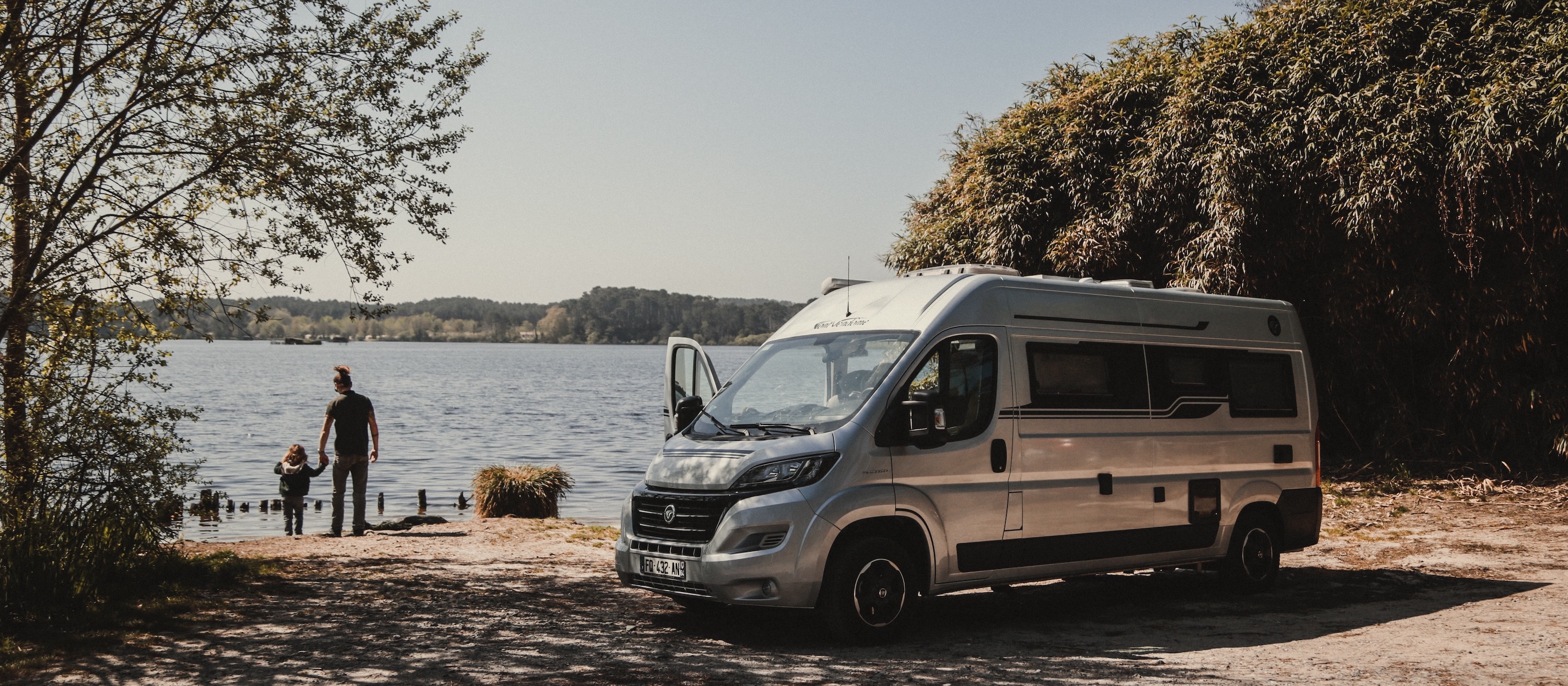
Wikicampers , Yescapa , Ouicar... Private van owners usually offer their vehicles for hire via one of these platforms, which also takes care of the management, security, insurance cover and deals with the transactions between the owner and holidaymaker.
The advantage of this option is that the rental price is usually more competitive. The condition of the vehicle is usually checked via the platform application, in your presence. Another top tip: if you are looking to try out a vehicle because you’d like to buy one, it would probably be easier for you to find the right model if you go through a specialist hire company. Last but not least, this is the most eco-friendly option because you won’t be hiring a van from a fleet that is only used for rental purposes.
Choose the right van that is suited to your needs
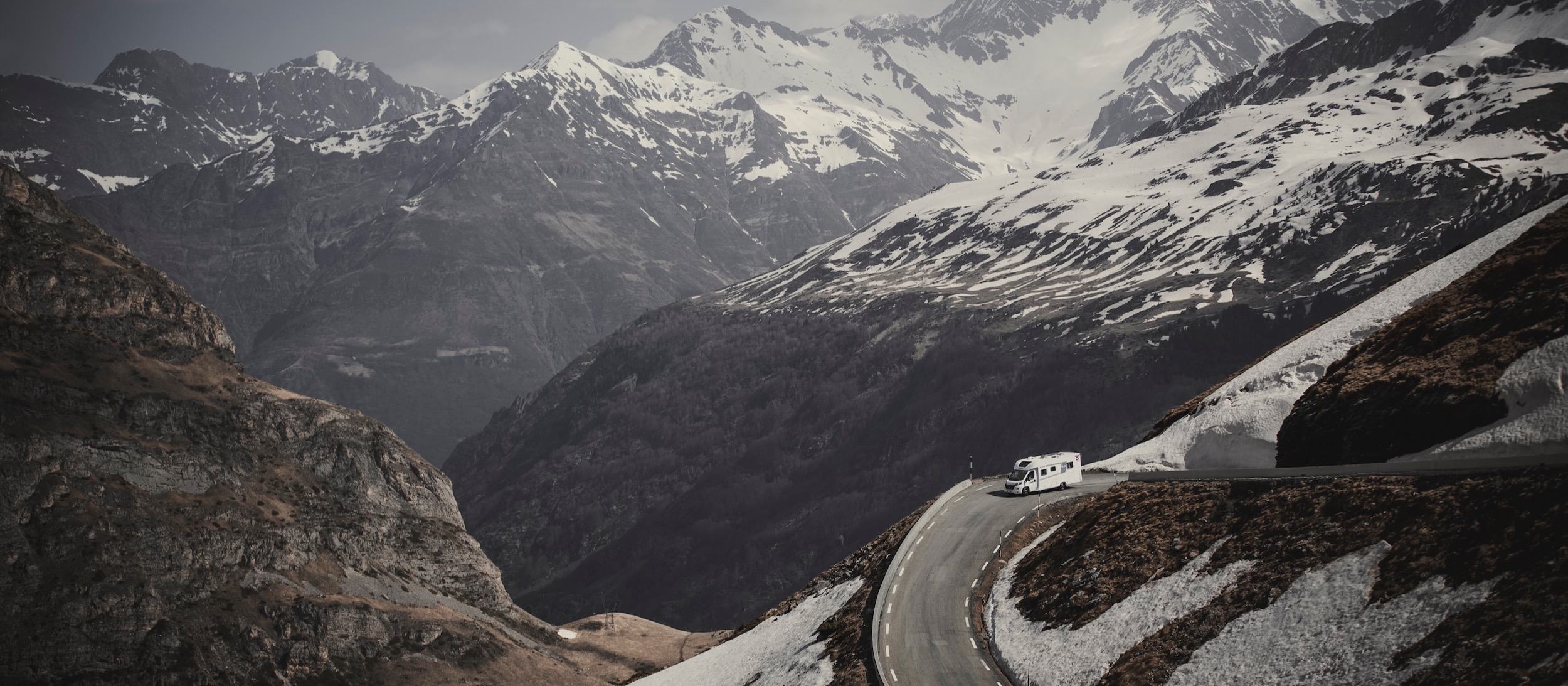
A combi van, utility vehicle or a pop-top camper van? An over-cab or low-profile motorhome? For every trip, there is a perfect van. Before setting off, make sure you take the time to choose the right vehicle for the number of people and with the right level of comfort to suit your needs.
Choosing a van with or without toilets might seem like an amusing detail, but it could make a big difference to your trip. And insulation and heating would be important factors to consider in winter.
A van adapted to off-road terrain would be better suited to trips off the beaten track than a motorhome that is more difficult to manoeuvre. In some vans you can stand up, in others you can't. This might seem insignificant for some travellers, but for others it would make a big difference.
Download useful applications
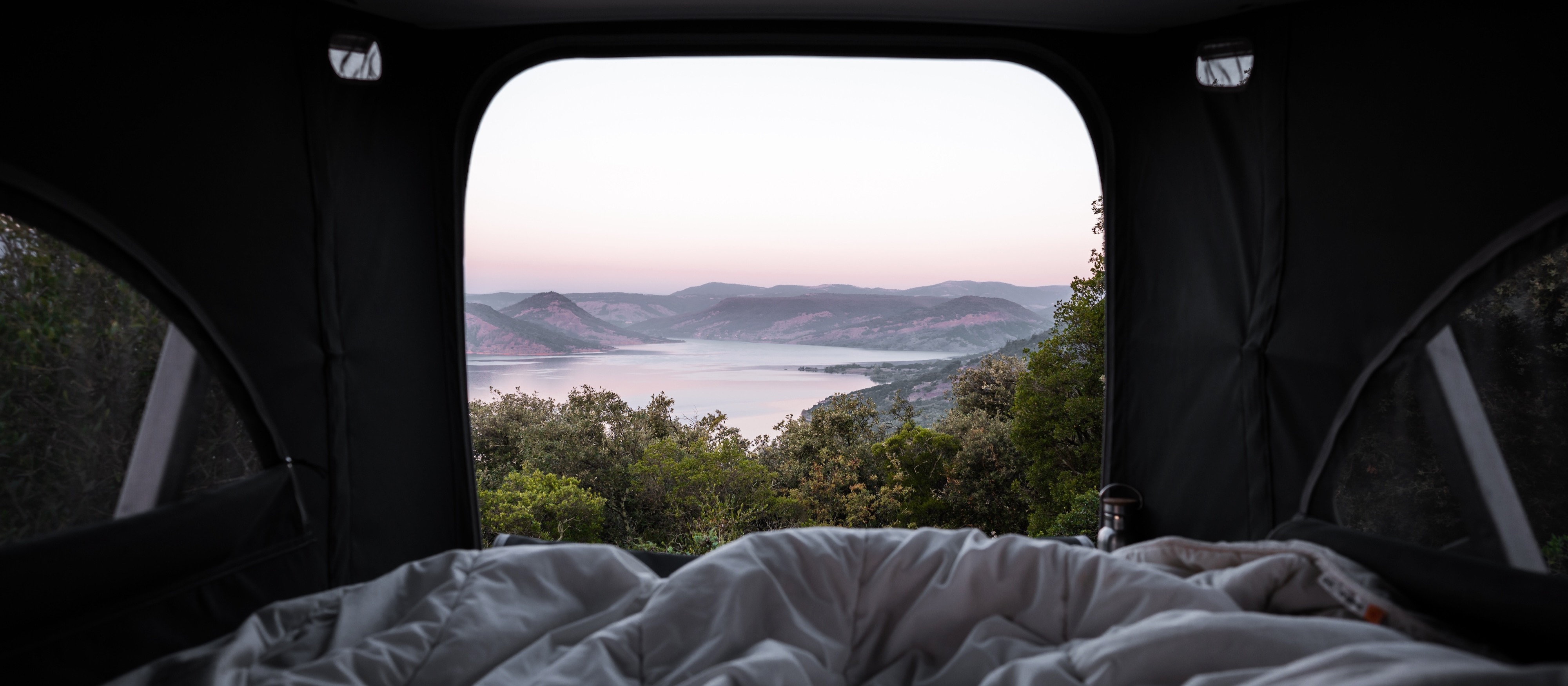
Any seasoned fan of the van life will tell you that the top priority is finding the perfect place to sleep. There’s no better feeling than waking up with a view of the dunes in the Landes or the Alpine peaks to start off your day with a smile. In France, some destinations are more welcoming than others when it comes to camper vans and motorhomes. Wild camping is subject to regulations.
In the Basque Country or Brittany, you might not always be able to stay overnight along the coast for free, especially during the peak season. Don’t panic, wherever you are, there’s always a plan B. Use the Park4night application to find an authorised parking area near you. It was designed specifically with this use in mind. Use the filter to search for the type of location you’re looking for (campsite, staying with the locals, free parking area, rest area, etc.). You’ll find plenty of useful reviews to get an idea of these locations before choosing one, and many of the reviews include photos. You can get any extra information you might need from maps.me and Google maps, and these applications will also help you if you want to venture off the beaten track.
- Top tip: choose the locations that have been given the least number of reviews. If you are looking for some peace and quiet, opt for a parking area that is at the departure point of a hiking trail, rather than alongside a busy road. It’s often a good idea to spend the night away from the main roads.
Plan your route
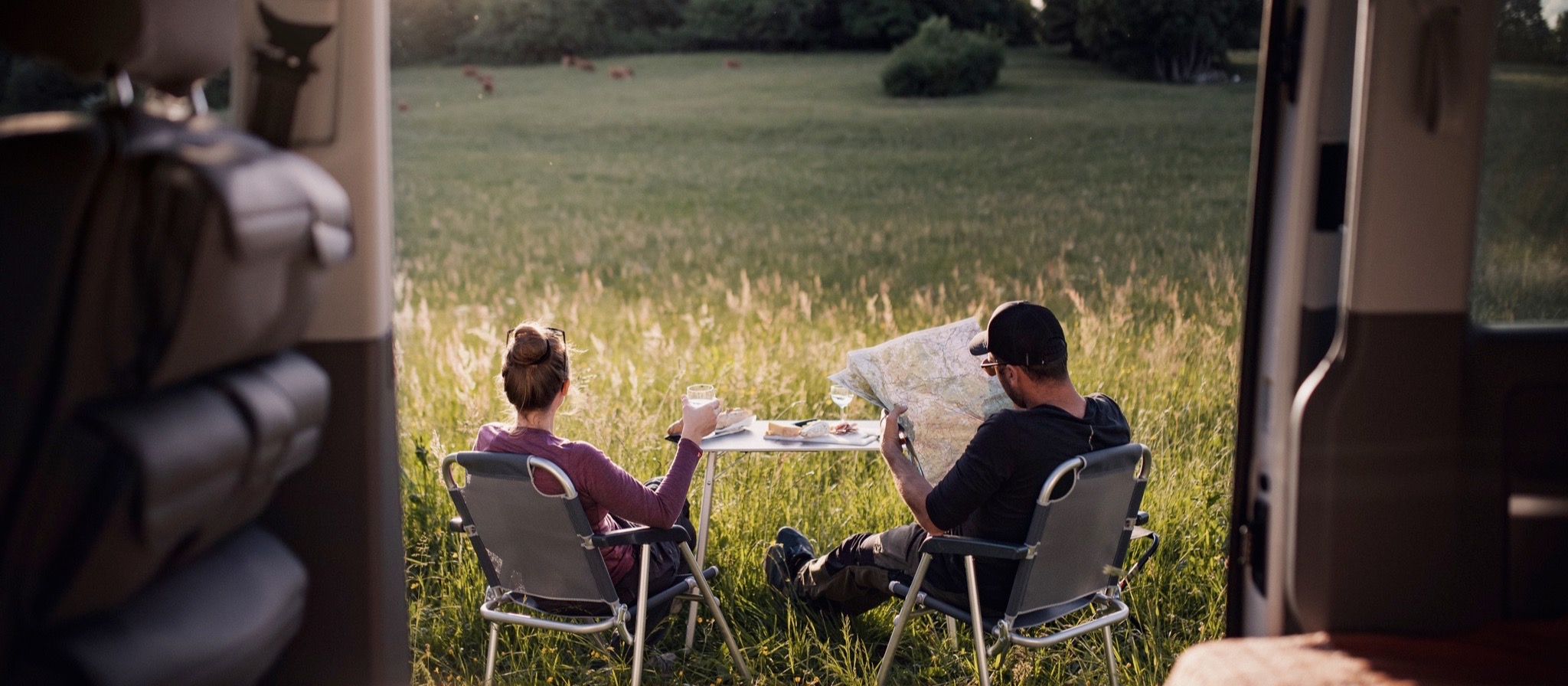
Just like your luggage, the route needs to be as simple as possible. The advantage of a road trip in a camper van is the freedom it gives you. You don’t need to plan the entire route out in advance but you can use the apps we’ve mentioned to decide on the mileage you’re aiming for each day. As a general rule, try not to plan too many miles on your road trip in France. A good indication is to spend around 2-3 hours on the road each day. This will limit fatigue. And you’ll have more time to make the most of a place you’d like to explore. There’s nothing like changing your plans to suit your needs, and adapting to the weather!
Be aware of the basic rules
On a trip in a camper van in France, you’ll be embarking on a whole new experience, where you are free to travel around as you please. But this independence does not mean you need to be completely self-sufficient.
The number one rule to respect for a successful trip is to travel light. Leaving your belongings and your daily comfort behind you is all part and parcel of the experience. For example: choose to use backpacks and lightweight camping gear rather than suitcases and fancy camping equipment than is better suited to staying in one place. And you’ll be delighted to be reminded that the lighter the camper van, the less fuel you’ll consume!
Another basic rule is to respect the locals: avoid making excessive noise at night (this also applies to other tourists nearby) and leave your overnight locations exactly as you found them, i.e. clean. It’s all about being respectful. For example, you should avoid using parking areas that are used by the locals to do their shopping, or those used by holidaymakers to go to the beach during the day.
Other useful precautions include being aware of any regulations regarding forest fires. A campfire might add a magical touch to your experience, but in France, you are not permitted to light fires in a national park, a protected nature reserve or in forests during the summer or in periods of drought. In any case, if you are not sure of the rules, it is better to avoid lighting fires.
Take what you need for the vehicle with you

If you hire your vehicle from a professional company, chances are you won’t have much to think about, if anything at all (read the following paragraph). Pretty much everything you need for cooking will be provided. You’ll also most likely be provided with bed linen, a camping table and chairs (make sure you check before setting off).
The most organised of travellers will bring a toolbox, engine oil, a piece of cloth to wipe your hands after checking the oil levels (when the engine is cold and the ignition is switched off), a small air compressor for the tyres, etc. But with the breakdown cover, you’re not likely to need any tools whatsoever!
A checklist of the essentials you’ll need:
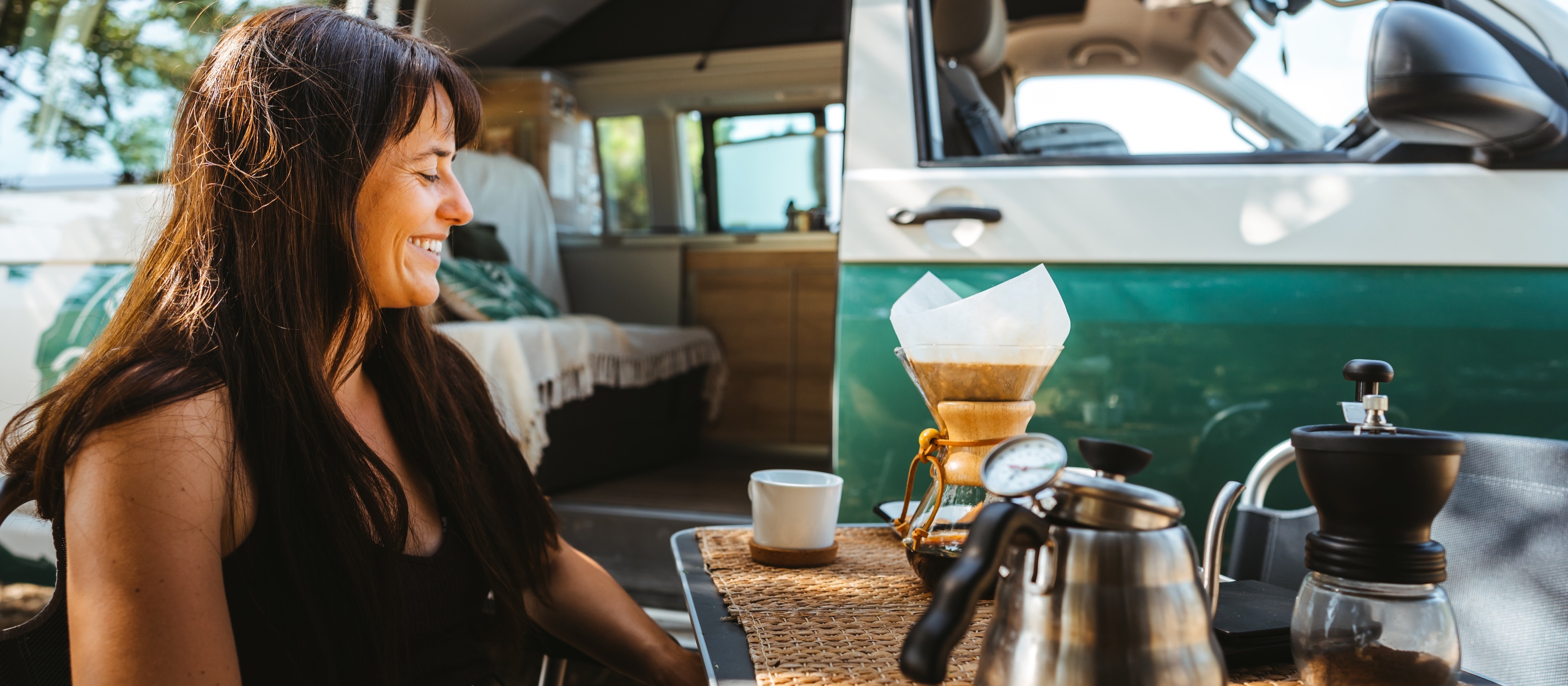
Paper versions of a travel guide and road map, a Swiss army knife, a camping stove, USB chargers and plug strips, plenty of water, solar- or battery-powered torches, head lamp, hammock, microfibre towel, Tupperware boxes and containers, bin bags, etc.
Are you still with us? If so, that means you’re ready to set off on the roads of France for your first trip in a camper van. All that’s left for us to do is wish you “Bon voyage”!
- Tips and suggestions:
Are you planning on travelling in an electric van? You'll need to find out how far you can go with a full charge. Depending on the model, this can vary from a hundred kilometres to almost 800 km, which would have a huge impact on how you plan your trip and your route in the camper van. There are plenty of tools you can use to plan your route, and they will suggest the best places to stop and charge your vehicle along the way: A Better Route Planner or Charge Map . To benefit from an overnight charge, opt for campsites with electric charging terminals. This is the ideal solution so you don’t need to worry about it overnight. Getting around the local area by bike is always a good idea, especially if you are staying on a campsite or with the locals. If you’re planning on cycling, you’ll need a bike rack. This can be booked as an option from your hire company
Further reading :
Insolite : 6 écrins de verdure pour jouer les Robinsons modernes
8 réflexes pour voyager durable en France

By Alicia Munoz
Alicia, a journalist with a passion, writes about sustainable development, the environment and travel. Her love of nature, sports activities and the great outdoors becomes obvious in her articles.
Holidays at Galeries Lafayette

Air France, the best and most comfortable way to get to France

French Wine Tasting with Duclot La Cave

Gift vouchers for your shopping at Galeries Lafayette

The Christmas Windows Display and Characters

A Fairy Tale 1, 2, 3 Christmas!

8 Luxurious Boutiques in Paris

A historical and cultural melting pot in French Polynesia
Tahiti-French Polynesia


- France , Travel
The Ultimate Guide to Motorhome Travel in France

Travelling with your motorhome in France is a fantastic way to spend a holiday or a month (or two) during a big road trip. The ease with which you can travel and explore the country is fabulous. There are many stunning places to see, and you won’t have much trouble finding a motorhome parking space.
In this ultimate guide to motorhome travel in France, we want to tell you everything you need to know when planning a motorhome trip to France.
Planning a trip with the motorhome
Touring France with your camper is the best way to see the country. You get to decide where to go and what to see. You also don’t need to find accommodation and travel to spots; you can view something and then park your motorhome for the night.
That is why planning a trip with your motorhome is different too. If you are going on a holiday, you will look for fun things to do and see around one spot and find accommodation there. But with a motorhome, you are more agile; you can just go and see what you would like to see. So you need to decide what is important to you.
Things you can keep in mind:
- How long is your trip?
- What kind of activities do you prefer? (Do you want to experience history, love hikes, want to do something adventurous, etc.)
- What type of weather do you prefer?
- How long do you want to drive each day?
These can determine where you want to go, when and what kind of things you want to see.
Look up some spots in France that might fit your criteria and that you want to see. And from there, see if there is a nice route between them and fill it in with other fun stuff along the way. Definitely keep enough time just to roam and see what happens. You don’t want your full days planned out, especially with a motorhome!
Destination tips
Here are some recommendations from us of places you might want to see, but there is so much more to explore:
- The coast of Normandy – If you want to learn more about World War 2, there are a lot of very interesting spots along the coast, including the Maisy Battery at Grandcamp-Maisy and Omaha Beach.
- Mont Saint Michel – This UNESCO world heritage site is a tidal island with a hill. On top of the hill, you will find the Abbaye du Mont-Saint-Michel, an abbey that is still a place of pilgrimage.
- Domme – This cute medieval village in the Dordogne department is also on top of a hill. The walled town has some amazing views of the surrounding area.
- Camargue – This area has a lot of natural beauty. We drove across two routes near Montpelier, where we had the Mediterranean Sea on one hand and a lake on the other. And there were so many flamingos when we were there.
- French Alps – The French Alps are the way to go if you are looking for steep mountains. Depending on the season, there are multiple activities you can do or just enjoy the view from the comfort of your folding chair.
READ MORE : The Prettiest Villages of France
Travelling with the motorhome in France
When to travel to france.
With a motorhome, you can pretty much always travel in France. The country is so big that chances are high you will find at least one area that has the kind of weather you are looking for or will at least enjoy. But there are big differences in the weather between seasons.
June – August
A lot of people visit France during the summer months, so it will be busier everywhere. The temperatures can skyrocket and become scolding hot, so it depends on your preferences whether this is a good time to visit. Also, keep in mind that July to August is the prime period for French people to take a holiday, and campsites are a lot busier and must be booked in advance.
You will be able to see a lot of sunflowers and lavender in the fields, which look absolutely stunning.
September – November
We love going to France in September and October! It’s generally nice still, especially the more south you go. We have even had 27 degrees half October in the Lot! How is that for an Indian Summer? You can also see the fall really well, with all its different colours and the harvest in the fields. The more it starts going to November, the more chance of rain you will have. But there will still be really nice moments.
December – February
During winter, it can be cold and wet. There can be snow and cold, especially in the north and in the mountainous areas, while the south will have more rain. It is a nice time to travel if you want to go to a mountain for winter sports, but please make sure you know all about the winter tire rules before you go.
March – May
This is another amazing time to go. While March can still be cold, the weather warms up quickly during these months. It is not really busy yet, and you can see spring bloom. We prefer going in spring or autumn because it’s not too hot and it’s not too busy yet, though we were quite surprised with the number of people at Mont-Saint-Michel at the beginning of April.

Important motorhome words in French
- Aire de camping car – Stopover area
- Aire de service – Service area
- Eau potable – Drinking water
- Vidange eau noire – Black water waste
- Emplacement – Camping spot
- Jeton – A coin or token
Taking your pet to France
Are you travelling with a pet in your motorhome? That is awesome! We love travelling with our dog(s) to France. There are just a few things you need to know.
First of all, don’t forget their paperwork. It’s not asked for regularly, but you are in a world of trouble if you can’t show it when they ask for it. Dogs need vaccines, including rabies, to enter France. Our vet also recommends deworming more regularly if you go to the south of France because of some scary heartworm. There are some breeds that aren’t welcome in France. Please see the French government site for more information.

The French love dogs in general. Most of the time, they are allowed on the outdoor area of restaurants and sometimes even in the restaurant itself, as long as they are well-behaved and on a short leash.
They are allowed in public transportation, though you might need to muzzle them, depending on where you are, so make sure you have a muzzle. Most beaches won’t allow dogs in high season, but there will be special beaches where they can go, and during the offseason, they are allowed almost everywhere as long as you properly clean up after them.
Having internet while travelling
Being in your own home on wheels means you might want to chill as you do at home and browse on your phone or watch something on Netflix. While it is quite easy to find internet in a café or McDonald’s, it can be easier to have your own motorhome network where you can connect to the wifi. Buy a French sim card with wifi, put it in the device and away you go.
However, a sim with internet in France is not cheap, so keep this in mind. You can also see if your current phone provider offers extra internet in other countries; ours offers 50GB per month in Europe outside the Netherlands.
READ MORE : Internet in your Camper
Driving your motorhome in France
If you are going to motorhome travel in France, you will, of course, be driving in France. You could stay on the motorway the whole time, but what is the fun in that?! What do you need to know about driving your camper in France?
Roads in France
We would recommend trying to avoid the motorway as much as you can. Only use it if you don’t have a lot of time on your trip and you need to get from north to south (or the other way around). Not driving on a highway has a lot of pros: you will see more of the country, you will save on tolls, and you might save on fuel (depending on your speed).
Next to highways, you have national roads (Routes Nationales), and they have an N-number. Then there are departmental roads with a D-number; sometimes, you might see roads with a C number.
The smaller the road, the more fun it is to drive, and the more inline your speed will be with other traffic…. until roads get so small, it’s scary to drive them. We encountered that several times in south France where suddenly, without any warning, the road became really small and it became difficult to let oncoming traffic pass. Ensure you know your comfort level with driving your motorhome before going on the smallest roads.
Speed limits
Speed limits are a funny thing in France. Below we will discuss the general speed limits for the different roads but keep in mind that departments get to make their own rules and differ from the general consensus. We’ve been on roads that were 90 km/h one minute, and the next minute they were 80 km/h as we drove into a different department.
These are the speed limits: On a highway, you can go up to 130 km/h. When it rains, this is 110 km/h. But personally, we drive slower on there since 130 km/h is not comfortable with our camper. If national roads have separate lanes, you can go 110 km/h (100 km/h if it rains); without it, you can go 90 km/h (80 km/h if it rains). Other roads outside town limits will also be 80 km/h; inside town limits, it’s 50 km/h (or 30 km/h when mentioned).
Vehicle safety equipment
If you are travelling to France, there are certain things you are obliged to have with you:
- emergency triangle
- yellow safety vests
- blind spot warning sticker (if over 3.5T)
Please note that you are no longer obligated to have an alcohol test with you!
Other things that could be good to have with you:
- a spare wheel and tools to change the wheel
- first aid kit
- fire extinguisher
- spare bulbs and fuses
Other important information
France doesn’t have a toll vignette, but some highways in France require a toll. You can get a special badge or pay at the toll booth with a credit card, bank card or cash. There are several categories for different types of vehicles. When your height is more than 2 meters but less than 3 meters, you will fall into category 2. When you are higher than 3 meters and/or heavier than 3500kg, you will fall in category 3. Always check what category your motorhome falls into and that you get charged the right amount.
France does have environmental zones where certain vehicles can’t come. Informational signs will show you what categories of the Crit’Air sticker are allowed in the city. If you are planning to visit cities, getting your sticker before you travel is important. You can’t get it while on the road. There are six different categories which depend on the type of vehicle, the amount of CO₂ emissions, and the age of the vehicle.
Camping with your motorhome in France
Travelling through France with your motorhome is not about just driving it. You want to find nice places to stay and camp. So you can eat, sleep or chill in the camper. Or maybe you are looking for a spot to park so you can visit something. France has a lot of great options on where to find parking spots.

Parking your motorhome
You can park your campervan in a regular car park unless expressly forbidden. Make sure you don’t stick out (too much); the police may frown upon that and, depending on how busy a spot is, might fine you. You are also allowed to park your motorhome at the side of the road.
You are always allowed to eat in your motorhome when parked. You are not allowed to put out chairs or use your awning. This is seen as camping, not parking.
Overnight spots
Overnight spots are a place where you can stay overnight. But that doesn’t mean you can only stay one night, though they are used a lot like that. Most allow you to stay for 2 or even 3 nights. There are a few different options.
First, there are the ‘aires’. Don’t confuse these with the highway aires. These aire de camping-car are meant to be used as a parking area for motorhomes especially. You find them in towns and villages all over France. Sometimes there are very simple, and sometimes, they offer amenities. Sometimes they are free, and sometimes they are paid (we’ve seen up to 20 Euros per night). And no, it’s not always the simple ones that are free. We loved using ‘Camping-Car Park’, paid aires through France that use a small card that you can charge up. They offer all services, and they have multilingual support if necessary.
The Camping Municipal is a simple camping, mostly used for short stays. You will almost always find one close to you as the local towns or areas offer these. These campgrounds are smaller and cheaper than other campings, but they also offer a lot less.
Several businesses and private landowners offer spots to stay. We’ve noticed that vineyards and farms love having people over so they can show what they do and maybe sell you a local product. We have found spots like this on Park4Night, but you can also check out France Passion, a special club that offers these spots for free without any amenities.
There are a lot of different camping grounds in France, varying in quality in price. Some are simple and don’t have many amenities, while others are 5 stars and offer swimming pools, restaurants, shops, bakeries and more. Though the camping municipal are campings too, they are used more for short stays than longer camping.
If you are looking for a more luxurious holiday, staying at a campsite could be a good choice. You can stay for longer and have all the luxuries on hand. We would recommend staying at least a 3-star camping if this is the vibe you are going for. And you will need to book in advance for the summer holidays or try going to a camping at the end of the morning, as people leave.
If you are going in spring or autumn, you can check out the ACSI card. This card offers you discounted prices on several campsites, which is especially interesting for the more expensive ones. We had a fantastic experience at 5-star camping near the Alpe d’Huez, with a heated pool, fresh bread delivery and incredible views. And it wasn’t all that expensive because we were there in April and used our ACSI card.
Wild camping
Wild camping is a legal grey area in France, if not just to say it’s forbidden. With all the options to camp that you can see above, it’s logical that you can’t just park your motorhome anywhere and sleep.
However, sometimes you can find free spots to sleep if you ask a farm owner. Or you can just be in such a remote area that no one will see or find you; therefore, they won’t care. At least avoid ‘camping’ and don’t put out chairs, only stay for 1 night and take care of nature.
Experiencing France with your motorhome
Now that you are travelling through France, it’s all about the experience, isn’t it? Here are some tips on how to make the best of your time in this beautiful country.
The French have a reputation for being rude and disrespectful to tourists, but we’ve found this largely has to do with the language barrier. They like politeness and formalities, and this plays into trying their language. No, you don’t have to speak perfectly or anything near that. While Natalie speaks quite a bit of French, Marten knows the basics, but we’ve noticed that those basic words help. Say Bonjour (Good day), merci (Thank you) and s’il vous plaît (Please). Use your hands and feet if you need to in combination with those few words of French, but show them that you are really trying, and you will see that they become a lot more friendly and helpful. And we think this goes for any country; they’d like to see you try their language.
Of course, those basics won’t give you full communication, which might be a problem. Because while English is getting more common, it’s still not widely spread. So if necessary, use a tool like Google Translate to translate from your language to French to ask what you need to know.
The French love life and try to live it to the fullest. They have high standards and expect good quality. They take the time for things, whether that is lunch (longer breaks are still very normal here) or saying hi to someone they meet on the street. It can be frustrating in local supermarkets if the cashier starts chatting with the person in front of you, but please know this is normal and expected in this country.
The French are proud of their country and their way of life. Do not criticize this; it will not go over well and will sound very rude to them.
They are known for their respect for heritage and have made a conscious effort to preserve their culture over the years. This is evident in the numerous museums and historical sites that can be found all over France. From grand castles to quaint museums that showcase a variety of arts, there is no shortage of places to explore and learn about this country’s rich history. The architecture is amazing everywhere, not just in bigger cities.
All in all, France is a country with a rich and diverse culture that should be appreciated and respected. By immersing themselves in the local experiences and customs, visitors can gain a deeper understanding and appreciation of the French way of life.
France is known for their food, and we would really recommend indulging in the local cuisine. From world-renowned wines to delicious pastries and cheeses, there is something for everyone’s taste buds.
Take your time if you go out to eat in France. Whether it is lunchtime or dinner, the French take their time and enjoy themselves. Natalie has had multiple 3+ hour dinners with her family and their friends. The French even eat during New Year’s, and they serve dessert at midnight!
Many French breads are famous, including croissants and baguettes . Bread is very much a staple during the day, but it isn’t as much that they eat sandwiches or anything. You eat bread with your meal to slobber up the extra juices, or you eat bread and paté but not paté on bread.
Champagne is the sparkling white wine that comes from the region of Champagne in the northeast of France. EU law reserves the term champagne for wines that come from that region. It is an interesting area to visit as you can find multiple champagne vineyards in every village, and most of them offer tours through their vineyard with a tasting at the end.
Now you are ready for motorhome travel in France
Now that you have all the information about motorhome travel in France, you can start planning your next trip!
We wish you a lot of fun, and who knows, we might see you around!

Share This Post

We are Marten and Natalie. We are travelling through Europe in our camper and would love to share our stories with you about travelling in a motorhome.
More To Explore
Leave a reply cancel reply.
Your email address will not be published. Required fields are marked *
Save my name, email, and website in this browser for the next time I comment.
Join The Ride
Subscribe to our newsletter to get random emails with links to new blog posts and stories of our travels
© CamperBeginners 2021 - 2024
Everything you need to know when motorhoming in France
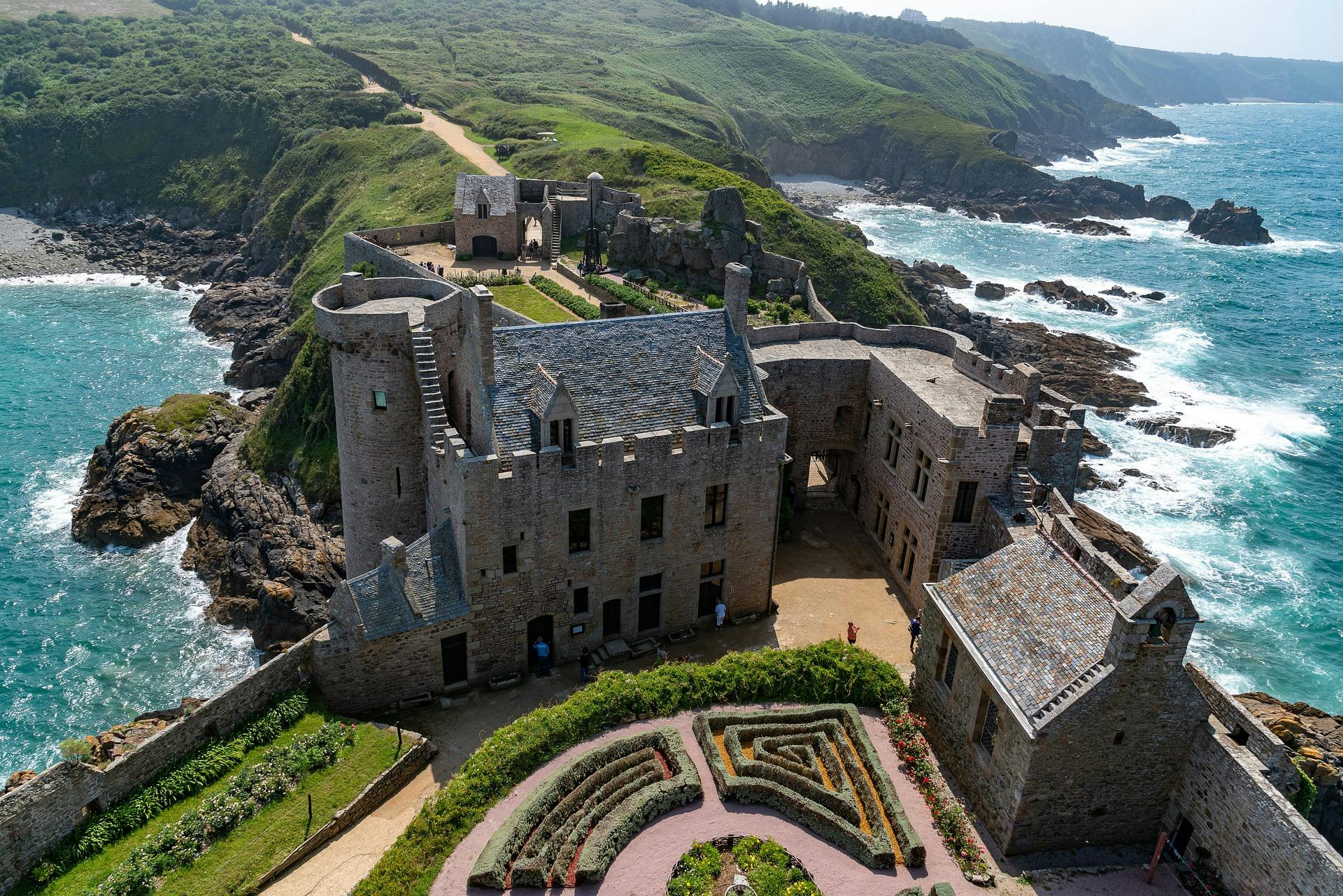
Going to France with your motorhome? Do it! France is an ideal holiday destination, with a beautifully diverse landscape, a pleasant climate, delicious cuisine and lots of perfect sites for motorhomes. And for motorhome owners.
After a day of exploring the area, you can enjoy one of the many acclaimed wines, with a piece of cheese and baguette in the French evening sun. With a French Chanson playing in the background. Read this country information before you leave, and you will have everything you need to know before you set off in your motorhome to France.
Overnight stops
Are you taking your motorhome to France and looking for a place to stay overnight? Then search for campsites and motorhome stopovers. For French motorhome locations , see Campercontact. You are allowed to stay overnight for free anywhere that a passenger car (or camper <3,500 kg) or bus (or camper> 3,500 kg) may park. So, officially you can spend the night at any place where you are allowed to park. However, you should not stay for longer than seven days in one place. You can stay for a maximum of 24 hours in parking areas along motorways. If you want more than just an overnight stop and prefer to try wild camping instead, then you can only do this with the permission of the owner of the land or the police.
Emergency telephone number
Emergency telephone number: 112 Ambulance: 15 Police: 17 Fire department: 18
Compulsory to bring
The French government requires motorhome owners to have a breathalyser in their motorhome, so that if in doubt drivers can test their own alcohol levels. If you get stopped and you don't have one with you, you won't get a fine. You are allowed to have a maximum of 0.5 promille in your blood. This is a maximum of 49 milligrams of alcohol per 100 millilitres of blood. For a new driver (less than 3 years driving license) a promillage of 0,2 promillage applies. Furthermore, a warning triangle and an easily accessible reflective jacket for the driver and a set of spare lamps are mandatory. Not mandatory, but a good tip (if we say so ourselves) is to bring a plug adapter or blue Euro plug with you. Many French motorhome pitches still use earthed plugs.
Roads and traffic
Speed limit
In France the following speed limits apply:
- Within built-up areas ≤ 3,5 t: 50 km/h
- Within built-up area > 3,5 ton: 50 km/h
- Outside built-up area ≤ 3.5 tons: 80 km per hour
- Outside built-up area > 3.5 tons: 80 km per hour
- Motorway ≤ 3.5 tons: 130 km per hour
- Motorway> 3.5 tons: 110 km per hour. On 110 km per hour roads with 4 lanes and separate carriageways, a maximum speed of 100 km per hour applies.
Speed camera warning
In France it is forbidden to use speed camera warnings via the navigation system. However, the indication of danger zones in a navigation system is permitted.
In France, you have to pay tolls on many of the motorways. The five toll categories and their details can be found on autoroutes.fr . For each toll road, there is an alternative route where no toll charged. If there is no alternative route other than the motorway, then that motorway is toll free.
Driving in winter
As of 1 November 2021, it is compulsory to carry 2 snow chains or to drive with 4 Winter tyres in mountainous areas during the winter period (1 November to 31 March). Mountain areas where this obligation applies are the Alps, Pyrenees, Massif Central, Vosges, Jura and Corsica. In addition, snow chains are compulsory wherever indicated by signs. If, in the event of an accident, the motorhome has not been prepared for winter conditions, the driver may be held (partly) liable.

Other traffic rules
- A motorhome over 3,500 kg may not drive on the left lane on a French three-lane road.
- Vehicles> 3,500 kg or longer than 7 meters must keep a minimum distance of 50 meters from the vehicle in front.
- Vehicles in built-up areas must keep a distance of 1 metre from pedestrians and passing cyclists, even when they are walking or riding on the pavement. Outside built-up areas a distance of 1.5 meters applies. When passing, indicators must be switched off.
- Using a mobile phone is prohibited. You can also get a fine if the motorhome is stationary and you have a phone in your hand. Pressure is still being exerted on the French authorities from various sides to reverse this regulation. For the first three months of 2021 there is an tolerance period during which no fines will be given. The size of the sticker is 25x17 cm. The stickers are to mark the zone that the driver can hardly see. The measure is intended to prevent accidents with cyclists and pedestrians.The stickers must be placed on the right rear side (between 0.9 and 1.5 m from the ground) and on each front side (between 0.9 and 1.5 m from the ground) of the cabin. An instructional video can be found here.
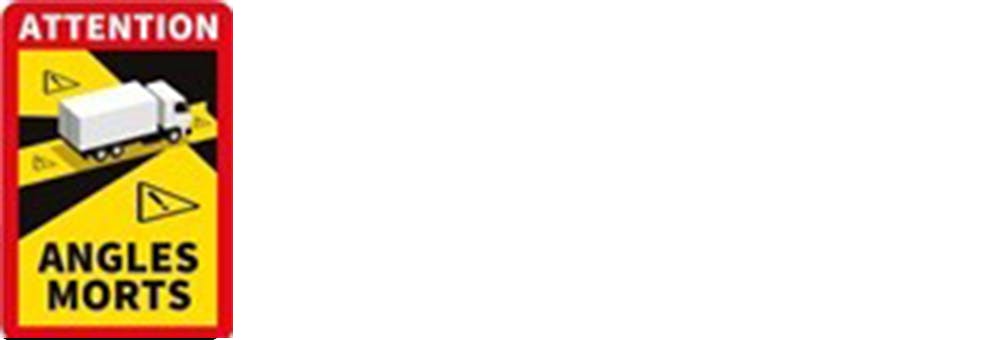
Additional load
Is your motorhome carrying an additional load? Please read the following rules.
- The load must not extend more than 3 metres backwards and must not protrude at the front.
- If the load sticks out more than 1 meter, it is mandatory to attach a reflective sign to the furthest point.
- In the dark or in poor visibility, the load must also be fitted with a red light.
- The maximum load of a vehicle with trailer is 2.55 metres wide and 12 metres long.
- From 1 January 2021, it will be compulsory for vehicles > 3500 kg to have blind spot stickers installed.
Pressure is still being exerted on the French authorities from various sides to reverse this regulation. For the first
Environment
French environmental zones
In France you have a low emission zone (ZFE), permanent environmental zones (ZCR) and temporary environmental zones (ZPA). The latter are air pollution protection zones where access rules are temporarily imposed when there is a pollution peak. These zones can be active for a few days and are then only accessible with a valid environmental sticker, the 'Crit'Air'. For permanent zones, the access rules always apply.
Advice: purchase an environmental badge when travelling to France (more information under the heading: French environmental badges). Admission to an environmental zone depends on the colour and number of the environmental badge.
Website with information about the French environmental zones.
French environmental stickers
In France there are six different environmental stickers (called 'Crit'Air' there). Motorhomes built after 1997 qualify for a sticker. And your vehicle's emissions determine which sticker you get.
On this website you will find a simulator which shows you which Crit'Air Vignette you need to buy for your motorhome. You can order your French environment sticker here. Stick it on the bottom right (as seen from the inside) on the inside of the windscreen.
Report a change?
The information on this page is checked regularly. However, it is possible that the regulations have changed in the meantime. All information on this page is therefore subject to change. Have you discovered an error? Please let us know via our contact form and we will, if necessary, amend it as soon as possible.

Travelling to France - Travel Hub
Our French neighbours bring feelings of warmth and comfort, a love hate relationship to many! Travelling to France in your motorhome is just a wonderful experience – especially to those that are new to motorhoming. France is a fantastic place to travel to in your motorhome. France itself has everything from cosmopolitan cities, historical chateaus, the finest cuisine and stunningly beautiful countryside.
But the best thing – France is incredibly motorhome friendly. France is set up to make motorhoming and road trips so easy! From campsites to Aires and availability for low cost waste and grey water disposal as well as filling up your water tank – all for a few euros.
Travelling to France will be much easier after you have read our handy French travel guide. It will give you all the practical and essential information that you need to know before you go. From what sim card you need, how to take your pet to France with you and the rules on wild camping. So buckle up and lets kick your road trip planning for travelling to France, off to a good start.
France Travel Hub - Jump To
Key facts - our french essentials.
French, spoken all over the country and many speak good English too.
In France they use the single European currency of Euro and Cents.
France is part of the Schengen region, (it counts as part of your 90 days free visa travel)
France is in the Central European Timezone, which is GMT +1
ATM & Credit Cards
French ATMs are plentiful. Credit Cards are widely accepted.
Plugs and Voltage
C and E plug types (both 2 round pins). Type E has male socket hole, 230 standard voltage and 50 Hz.
Not necessary although shows appreciation. All items have 15% added to the actual item price (not on top of the bill).
UK travellers need a passport and from 2024 need a ETIAS (electronic visa). Schengen countries travel visa free.
Female Travel
Perfectly safe as a female travel. Take usual precautions in the big cities at night time.
GHIC card will give you emergency cover or state healthcare. Advise Travel Insurance Policy too.
Motorhome Parking
Good range of Aires and campsites. Wild camping is legal - but follow the rules.
French Roads
A mixture of toll roads (A), old national roads (N) and Departmental Roads (D).
Best Travel Months
Spring/Autumn for less crowds, Summer for warmth, Winter for Ski and Christmas Markets
LPG Available
Readily available but you might need an attendant to 'turn it on'. You can't always 'just fill up'
Top 5 Airports - Paris - Charles de Gualle, Paris Orly, Nice Côte d'Azur, Marseilles, Lyon Saint-Exupéry
Motorhome/ Car Insurance
Likely to be covered as it is an EU and Schengen country - check with your insurance company to be sure.
Not required. 15% Service Charge is added to every bill. Living wage is paid to staff.
Emergency Numbers
Emergency - 112 (Fire, Police and Ambulance) Hard of Hearing - 114, 15 - Medical, 17 - Police, 18 - Fire
Must be microchipped. Must have Rabies injection. Animal Health Certificate (for each trip!)
Traditional Food
French Onion Soup Bouillabaisse Croque monsieur Escargots de Bourgogne Croissants!
Why Visit France?
Exploring France in a motorhome is an awesome way to see what this country has to offer. France isn’t just one place; it’s beaches, mountains, vineyards, and cities all rolled into one. And with a motorhome, you can see them all at your own pace. France is also really easy to get to from the south of England.
France is great for motorhome travel because it’s set up for it. There are plenty of places to park and stay, from fancy campsites to simple spots just for motorhomes. This makes it easy to travel around, whether you want to see the famous French Riviera, the Alps, or small villages.
One of the best parts of travelling this way is the food. Each part of France has its own special dishes and wines. You can go from tasting seafood in Normandy to trying cheeses in the Loire Valley. And since you’re in a motorhome, you can shop at local markets and cook your finds right there. Even the supermarkets are just amazing! The first French supermarket we stopped at just for something simply, we ended up buying so much stuff, it really is a food lovers dream!
Travelling in a motorhome also means you get to meet locals and see how they live, which is something you might miss if you were just passing through quickly. Plus, France has a lot of beautiful routes perfect for driving, like the Route des Grandes Alpes or through the wine country. The tolerance for motorhomers is completely different from the reception that you receive in the UK. It really is so refreshing.
So, if you’re looking for a road trip that lets you see loads of different things, eat great food, and meet new people, doing it in a motorhome in France is a smart choice. It’s about freedom, comfort, and adventure, all at once.
Download our Handy Road Trip Planner
Use our handy ready made PDF planner to help you plan your trip. We created a 9 day planner to use to plan a 1 week trip. Simply print out more copies for each week of your travels. Capture everything you need from your start and end points to where you will stay. There is space to write all the things you want to see and more. Plenty of room for jotting down notes as you plan too.
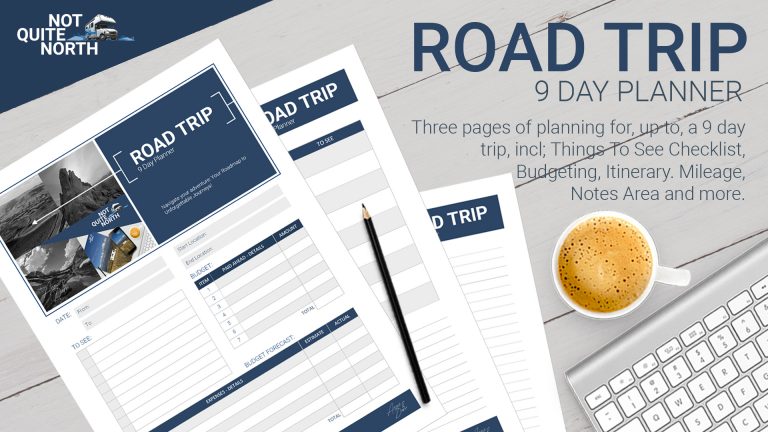
*Road Trip Planner
*By downloading our planner, you give us permission to send you our newsletter. We send this approx every 6 – 8 weeks.
When to Visit For Your Road Trip in France
For a motorhome road trip in France, the best time to visit really depends on what you’re looking for in your adventure. For us, we prefer to find the warmer weather, with longer days and milder evenings, but there is some great skiing to be had in France, which of course means a winter break is the best.
France in Springtime
Spring in France is a great time for a road trip. The weather is getting warmer, and the landscape is blooming. Plus, it’s before the summer rush, so places are less crowded. You’ll get to enjoy the beauty of places like Provence with its lavender fields starting to bloom towards the end of this period without too many people around.
France in Summer
If you love sunshine and don’t mind the crowds, summer is peak season. It’s perfect for beach destinations along the French Riviera. However, it’s also when France is busiest, and prices for campsites can be higher.
Autumn in France
The weather is still nice, especially in September. This is harvest time in wine regions like Bordeaux or Burgundy, making it an excellent choice for wine enthusiasts. The autumn colors are beautiful, and the tourist crowds have thinned out.
France in Winter
It’s the off-season for most of France, except for the Alps and Pyrenees, where it’s peak ski season. If you don’t mind the cold and enjoy winter sports, it’s a great time. Plus, you’ll see the Christmas markets in December.
We would avoid the south of France in the summer months just because of the crowds, but of course, you can always avoid the crowds by going to non-tourist places – France is about 2.5 times the size of the UK – with about the same number of people living in it.
France also has a lot of festivals in the summer which may influence the time you want to go.
In summary, if you prefer mild weather and fewer people, spring and fall are the best. For beach weather and lively festivals, choose summer. Winter is great for skiing or enjoying France’s cities without the crowds. It all comes down to your personal preferences and what you want to experience on your road trip.
France since Brexit - What's Changed?
Since Brexit, a number of things have changed with regards to travelling to France. The legal requirements for entry are obviously the biggest one. France is part of the Schengen Region. This is not the same as the EU or Europe! These are common mistakes people make.
Being part of the Schengen means that UK citizens with British passports can only be in the Schengen region for 90 days out of 180 days. It can be difficult to keep track of – but thankfully there are many apps that can help you with that. It is more complicated than it first sounds – and the penalty for this is can be a ban – a pretty significant event, considering there are 27 member countries of the Schengen. Check out our article for ‘The Schengen Shuffle’ to find out how to manage the impact of this for fulltime travellers. Try and keep a few days in your back pocket just in case something goes wrong.
You don’t need a visa as of now, but in 2025 you will need an EITAs – an online registration system that is being introduced.
You will need to apply for a GHIC health insurance card to cover you for basic hospital cover either free or low cost – but it is best practice to get yourself travel insurance when you are travelling to France. Medical costs can run into their thousands so it really is recommended.
As a result of Brexit, your mobile phone roaming fees will likely be affected. So you will need to either pay a daily roaming fee (in most cases) or swap out your sim card for a local card which will give you access to data/calls etc.
Last but not least – the pet passports have changed. Instead of a pet passport, you will need to apply for an Animal Health Certificate (AHC) which confirms that your pet is microchipped and has an up-to-date rabies vaccination. You need to get a new certificate each time you travel within 10 days of your travel date. This will be valid for 4 months.
France Itineraries and Information
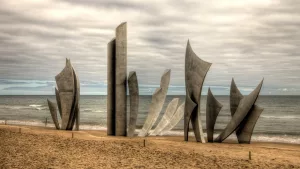
Searching for a quick getaway, but want to go across the channel? We have 5 roadtrip ideas for northern France, which will make you go ‘ooh la la!’ My particular favourite is the Champagne trail!
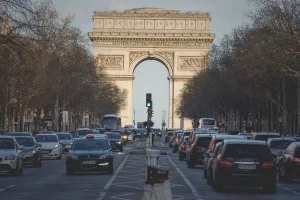
Everything you need to know about the rules on driving in France. From speeds, drink driving rules, wild camping and even the speeding fines. Driving essentials in one place.
Traditional Foods In FRANCE
What is there to say about French food? This famous fine dining cuisine can be whatever you want it to be. The number of Michelin starred restaurants offering the most exquisitely presented food can be found all over (630 of them to be precise – as of 2024).
We are way more practical than that! Whilst we love a good fine dining experience – we are very much more about local and traditional foods to try. Foods of the regions interest us. Every area will have its own speciality – Epernay & Champagne are a match made in heaven for example.
French Onion Soup – a delectable bowl of hearty French onion soup is hard to beat. An 18th century dish, made with onions and beef broth, served with a big chunk of toasted bread on top finished with grated cheese lightly grilled. It was known as ‘Drunkard Broth’ as it masked the smell of alcohol! I have made this before and it took about 3 hours! Went down a storm!
Bouillabaisse – a favourite of my dads and my sons! A soup which is from the south of France – mainly made with fish, shellfish and vegetables in broth. The spices used in it give it the real flavour, although the dish is so old (2,500 years apparently!) it is hard to know what is totally authentic, but if you are around Marseille, this is the originating city.
Croque monsieur – available in cafe’s all over France – the traditional cheese and ham toasted sandwich. Thought to have originated from Parisian cafes in the 1900’s, the croque monsieur is in essence a ham and cheese sandwich with bechamel sauce (both inside and on top) with the top layer having grated gruyere cheese on it, melted under the grill. Yum!
Escargots de Bourgogne – we couldn’t not mention snails could we? For the older people or film fanatics – remember Julia Roberts with her ‘slippery little suckers’ phrase? Escargot de Bourgogne are classic snails in garlic and parsley butter. If you get a chance – look for a snail farm whilst you are in France – get right to the source. Snails with garlic are totally delicious.
Last but not least – the humble Croissants. Can’t get much more classic that this finest of pastries served for breakfast. OK – not unusual these days – but you will surely taste the difference from the fine pastry selections that you can pick up from the local ‘boulangerie’, deliciously buttery and flaky. I always eat twice as many – so bad for the waist line!
We hope you enjoyed this article and found it useful. If you found it useful, please do share with others using the share buttons below. If you think we have missed something – please do let us know. We read all our emails!

NOTE: This article may include affiliate links. When you click on an affiliate link in a page or post, at no cost to you, we may earn commissions.
Browse the not quite north blog library.
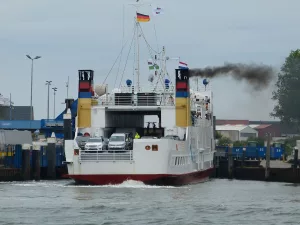
Ferry or Eurotunnel – Which Is Best to get to Europe?
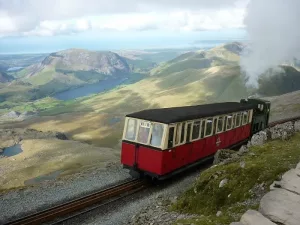
20 Steam Train Rides in Wales
5 easy road trip ideas in northern france.

A Weekend Visit to the Dutch Tulip Fields
Start typing and press enter to search. have a little patience whilst it is working.
It is not possible to copy the content of our pages. Please email us if you want to collaborate and work with us.
How to explore France by campervan this summer
Whether you’re looking to discover the rolling lavender fields of Provence or capture the breathtaking vistas in the heart of the Alps, a campervan trip through France is one of the best ways to discover the country. Here’s what you need to know.

There are few better places to enjoy the freedom of campervan travel than France. One minute you’re relaxing in the shade of an apple orchard following a night on Normandy’s homebrewed calvados; the next you’re crawling up Europe’s highest paved road, the epic Col de l'Iseran. With such a varied array of experiences to explore it allows for endless adventure.
Campervanning here is also pretty straightforward — it’s just as accessible to road trip across the Alps, admiring chiselled peaks and sweeping panoramic views, as it is to dip into the Mediterranean, whizzing along idyllic sections of France’s 2,000-mile coast and parking overnight in a low-cost aire (stopover areas designed specially for campervans).
Whatever plans you have pencilled in, the best way to tackle this country is by covering one region per road trip. France is huge — around 600 miles from north to south and the same from east to west — so exploring by campervan requires a little patience.

Come summer, many campervans head south for the fragrant lavender fields and rolling vineyards of Provence, or towards the star-studded French Riviera. The latter’s coastal roads have curves that leave drivers swooning from Cap Ferrat to Cannes but be careful not to drift into Monaco: campervans are not permitted here. Instead, park in neighbouring Cap-d'Ail and visit the principality via public transport. Apply the same advice for Paris, and other large cities.
If you’re looking for something more off the beaten track, opt for the wild drama of Brittany, a hilly peninsula in northwest France. Its lengthy, rugged coastline is dotted with beach resorts and famed for its unusual, blush-hued sand and prehistoric megalithic rocks. Elsewhere, the Atlantic coast offers a slow swing between wine-tasting in Saint-Émilion to ritzy restaurants in Biarritz — with plenty of rolling hills in between.
The vast, untamed and ancient terrain of the Pyrenees is another popular hotspot with campers in July and August, where drivers can tour between traditional mountain villages set among jagged peaks and the prehistoric cave paintings at Tarascon-sur-Ariège.

Thrill-seekers, meanwhile, can choose from several mountain passes, such as the snaking Col de l'Iseran, Europe’s highest paved road, that sweeps around the Graian Alps. It’s usually skiers up this high, but during the exceptional wildflower-meadow months, it offers an incredible parade of beauty — even when soundtracked by impatient beeps.
France also offers countless places and campervan sites where you can commune with nature — from the wonderfully wooded Ardennes to the ancient streams of the wild Périgord-Limousin Regional Natural Park. France Passion , a camping scheme connecting food producers with campervan drivers, can help travellers discover the country’s wild side. As well as a free, private space for the night — often a farmer’s field — drivers get to sample some incredible local produce with no obligation to buy. Whether quaffing wine in Burgundy or devouring creamy Auvergne cheese, farm-to-fork is rarely this short.
In the summer months, book private campsites in advance, especially if staying longer than a week. Websites like campercontact.com can be good barometers for availability. They’re also great for selecting spots with ample tree cover or a swimming pool. France has municipal alternatives, too — most now go pool-to-pool, playground-to-playground with their private counterparts, which can be cheaper.
If budgets are tight, divide trips into mini-drives by overnighting at an aires. park4night.com has a full list and most of them are free. They’re a parking spot and little else, but some have facilities like lavatories, small shops and restaurants. These charge a few Euros per stay, and you can usually park for between 24 and 48 hours.

Three more European road trips to try
1. The Ring Road, Iceland Forget the Golden Circle. To really get to know Iceland, traverse Route 1, also known as the Ring Road — an 828-mile lasso of the country that takes campervans past steaming geothermal hot pots, diamond-like glaciers, smouldering volcanic cones, lumpy lava fields and rushing cascades. From hiking through the rugged gorges of Thórsmörk to sea-kayaking along the cliffs of Snæfellsnes, there are detours aplenty, too. Then, at night, there’s every chance you’ll spot the swirling, dancing ribbons of the Northern Lights.
2. The Romantic Road, Germany A joyous sweep of ancient castles, baroque churches and slumbering half-timbered towns (plus a statue of Jesus said to weep real tears), this 220-mile-long waltz through southern Germany lives up to its name. Start at riverside Würzburg and you can build up toward a cinematic finish at King Ludwig II’s Neuschwanstein Castle, which acted as a muse for King Stefan’s knockout pad in Disney’s Sleeping Beauty . En route, stop to visit beautiful Weikersheim Castle or wander the cobbled streets of pastel-painted Dinkelsbühl.
3. The panoramic roads, Montenegro Wild doesn't quite cut it when describing Montenegro's four panoramic roads. Inspiring, imperious and impressive, these roads cover more than 745 miles combined, and run through dark green, deep-cut Tara Canyon and untouched national parks. They spiral tightly up towards mountainside monasteries and spill out around the shores of Lake Skadar. Essential stops include the former royal capital, Cetinje, and the flowing turquoise fjord at the Bay of Kotor. By campervan, the majesty of Montenegro unfurls right before your eyes. Note that some parts of the roads are unsuitable for larger campers — contact the tourist board for alternative workarounds.
Related Topics
You may also like.

How to plan a wild camping adventure in Scotland

How to plan an epic summer trip to a national park

How to find adventure (without the crowds) in Utah
Expert tips for exploring the uk by campervan this winter.
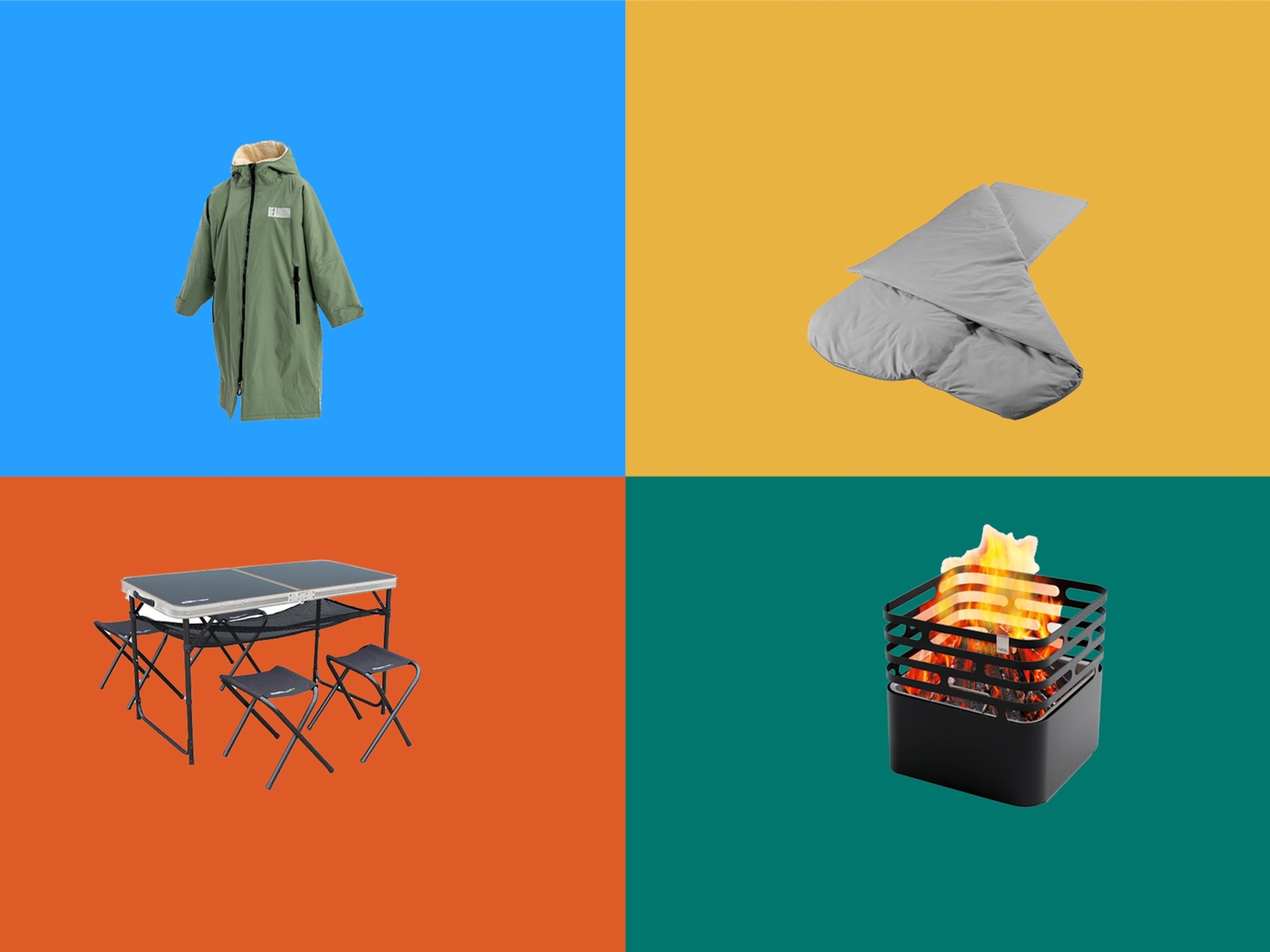
8 campervanning essentials you must have

The travel essentials we’re most excited for in 2024

7 must-visit campsites in Western Australia
- Terms of Use
- Privacy Policy
- Your US State Privacy Rights
- Children's Online Privacy Policy
- Interest-Based Ads
- About Nielsen Measurement
- Do Not Sell or Share My Personal Information
- Nat Geo Home
- Attend a Live Event
- Book a Trip
- Inspire Your Kids
- Shop Nat Geo
- Visit the D.C. Museum
- Learn About Our Impact
- Support Our Mission
- Advertise With Us
- Customer Service
- Renew Subscription
- Manage Your Subscription
- Work at Nat Geo
- Sign Up for Our Newsletters
- Contribute to Protect the Planet
Copyright © 1996-2015 National Geographic Society Copyright © 2015-2024 National Geographic Partners, LLC. All rights reserved
Vanlife: Bloggers share why France is a campervanner’s dream to visit
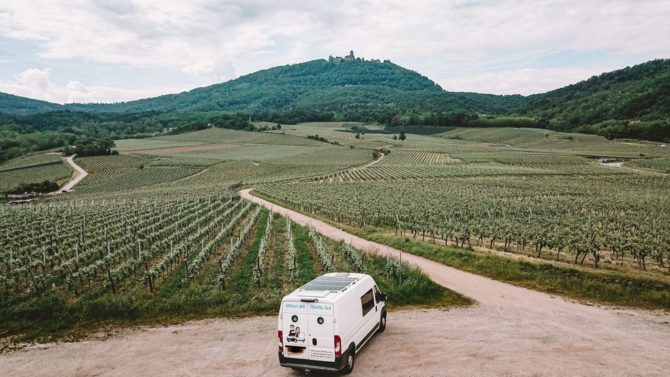
Meet full-time vanlifers, Cazzy and Bradley from Dream Big, Travel Far , as they share their experiences campervanning in France in their converted Peugeot Boxer.
Hi Cazzy and Bradley! Could you briefly introduce yourselves and your van?
Hey! We’re Cazzy and Bradley and we met at university in 2014 and have been travelling together since we graduated in 2016. We travel full time and have been to over 50 countries together. When Covid hit and the world started to lockdown, we saw a halt in our travels, so we used our newfound time to convert a campervan, who is now named Helen. She’s a Peugeot Boxer and she’s truly beautiful, fully equipped with a bathroom, fixed double bed, seating area, oven, and espresso machine!

What inspired you to join the vanlife movement?
We’ve always loved road trips and think that having a vehicle really allows you the freedom to truly see what a destination has to offer. In 2019 we did a couple of cool campervan trips, in Ireland and a three-month trip in Scandinavia. And those trips really pushed us into wanting to get our very own campervan that we could drive around the world.
Tell us about your first post-lockdown trip in the van, to France
France was the first country on our big adventure, and the first place we had visited in over a year due to Covid, so we were super excited.
We headed over to France via the Dover to Calais ferry and decided to visit the Champagne region first. This area of France has been high on our bucket list and it was truly a dream driving through this area, and being able to stop, and camp at actual vineyards. We also made a stop in Paris, because we couldn’t possibly not!
We then headed east to Strasbourg and visited a lot of the cute French villages said to have inspired Beauty and the Beast , such as Colmar, Riquewihr, and Ribeauvillé. We then headed towards the south of France and saw some really cool castles, including the epic Château de Val, and we loved the unique town of Rocamadour. And of course, as the weather got warmer, we visited the famous French Rivera, which was truly one of the most beautiful drives we have ever done. We stopped by the lavender fields as they were in bloom, and that ticked off another bucket list spot in France.

What was your overall favourite place in France to visit on your trip?
It is super difficult to answer this question because we loved so much of France. It’s the sort of country that has something to suit absolutely everyone. But I would say my favourite places were probably the Alsace region and the Verdon Gorge, which was beyond beautiful, and Bradley would probably say the South of France.
Was it easy to find places to stay?
Absolutely, France is the best country in Europe for campervans (in our opinion). It is set up super well and lots of the small villages have Aires, and parking spots for campers, and some even come with water, electricity, and waste disposal. Most times they don’t even charge, but of course, we would always have breakfast in the village (there’s nothing better than a French breakfast!). Even if there was a charge, it’s always very reasonable. We used an app called Park4Night for most of our spots, and also France Passion is a great resource for finding unique, local stays.
What was the best place you stayed overnight at?
It’s definitely a toss-up between the champagne house of Champagne Bouquet . They allowed us to stay on the property with a view of the vineyards, for free, and we got a complimentary champagne tasting. Naturally, we ended up buying 4 bottles because it was so good! But that was a magical evening and in the Alsace region, we spent the night amongst vineyards in a free camper spot that had been set up by the local community and it was amazing.
What was your favourite thing to do in France during your visit?
We love fresh French pastries and baguettes, so every morning we would stop and pick up freshly baked treats, and it became a tradition throughout our time in France. But honestly, we just loved driving through the country. We preferred driving the non-toll roads (if you’re not in a rush) because you get to see so much more beauty and local towns.

What were the unexpected challenges of your trip?
One of the unexpected challenges we had was actually deciding what to see because there is so much to see in France and we really wanted to see everything, but there just wasn’t enough time, so we had to miss out on some spots such as Bordeaux, the ski areas and the Normandy region!
Tell us about your exciting round-the-world trip! You’re ending up in France – whereabouts will you be going here?
It’s going to be a mammoth adventure! We are driving around the world over the next 3 years, things may take longer due to the natural border reactions that Covid imposes nowadays. But we are happy to take it slow and go with the flow.
France was our first country, then we headed East through Europe, and are planning to head east around the world. Through central Asia, to South Korea, then shipping the van to the USA, driving down through South America, then shipping the van to Africa, driving up through, and getting the boat back to mainland Europe, then heading back to France to go back to England! On our return to France we will definitely visit the spots we couldn’t this time around, and I shall be taking a detour to the Champagne region to pick up some local champagne to celebrate (hopefully!) the success of the trip!
What three top tips do you have for someone who wants to follow in your footsteps and do a van road trip in France?
1. Take the non-toll roads when possible: The tolls roads are fantastic for getting from A to B if you’re short on time, but some of our favourite views were on the smaller roads, with amazing views and a real glimpse into traditional French life.
2. Plan an itinerary in advance: There is a lot to see in France, and it can be overwhelming if you don’t know what you want to do. Plan your ideal road trip in advance, and use that as a base for seeing the country, but be prepared to add locations to your route when you get chatting to locals!
3. Travel in the “shoulder seasons”: France is a popular destination for vanlifers, so in the summer months it can get busy. I recommend you travel in either Spring or Autumn. You’ll still get great weather (most of the time!), and everything will be a little less crowded.
Keep up with Cazzy and Bradley’s exciting round-the-world adventures on their YouTube channel and their blog .
Share to: Facebook Twitter LinkedIn Email
More in Alsace-Champagne-Ardenne-Lorraine , Campsites in France , Driving in France , France Travel
Related Articles
The riches of beatrix de rothschild, where to go wild swimming in france, antibes – market, picasso and more, by helen parkinson.


Travel around France in a motorhome
by Helena Makovská | Sep 3, 2020
France is not just about the Eiffel Tower. This large country is where you can find everything – from beautiful sandy beaches to jagged mountain peaks. Not to mention that France offers one of the world-famous cuisines and cultural experiences that you just won’t find anywhere else.
Many local people enjoy caravanning, so you definitely will not look too exotic with your caravan here. On the contrary, you will find many beautiful camps and Stellplatzes (places to park overnight legally) here in France conveniently located next to the popular destinations. We are aware that all visitors will probably head to Paris at some point during their visit, but we think that this location probably deserves its own article. We prefer to focus on other places we visited during our trips and from which we took the most beautiful memories away (not to mention the supply of great wine and food).
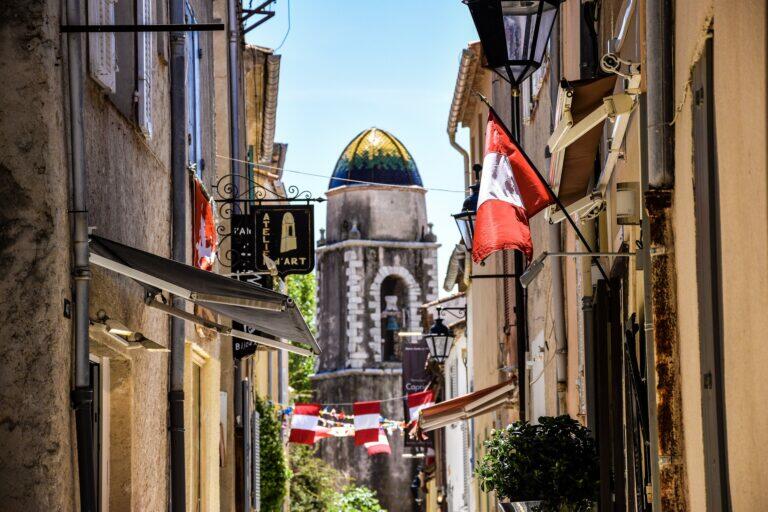
France itself is no surprise, if you have ever visited Germany or another European country west of Czech Republic. The currency to pay with is euros and be prepared for food and various services to be costing more than in Czechia. Even though France is the centre of world fashion, non-luxury clothes are about the same price as they are at home. You don’t have to carry a lot of cash with you, card payments are accepted practically everywhere and restaurant gratuities (or tips) are not expected as they are already included in the total price you pay.
Most motorways in France are tolled (you can expect about 6 euros per 100 km) and you will enter and exit through the toll gates each time you need to get on and off. The speed limit you can expect on the highway is up to 130 km/h, in the villages the classic 50 km/h applies, and outside the village you can drive up to 90 km/h. Be really cautious about your speed, because they do like to put speed control measures in quite a bit of places. And it goes without saying, not to go behind the wheel after drinking any alcohol. Legally, you have the allowance of having 0.5 grams per litre of alcohol in your blood, but we don’t recommend it.
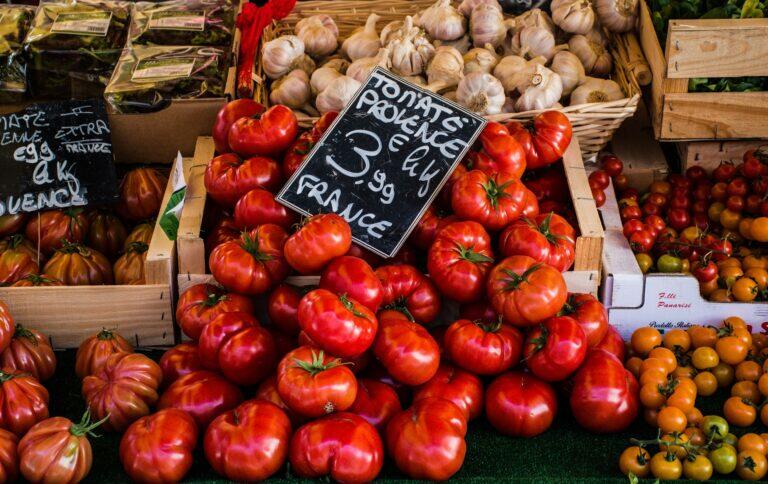
Beautiful beaches with nearby campsites
In the summer months and around the late Indian summer, the beautiful French seaside combined with lounging on the beach while eating good food is very tempting. We were most charmed by these places:
Following in the footsteps of Le Gendarmes de St. Tropez, there lies the so-called Côte d’Azur, also known as the French Riviera. Swimming is an experience in itself here, but we would recommend going a little further from the city to the beach of Pampelone with your own towel. The crowds will find you here, but we have never had a problem finding a place on this 2 km stretch of sandy beaches. St. Tropez is a charming seaside town that lives through tourism, but retains its typical French glamour. About 100 meters from Pampelone Beach is the Les Eucalyptus caravan campsite. You will find everything you need in here, including the chance to wake up to a sea-front view.
Giens Peninsula
Near Hyeres lies the most southern town in southern Provence (still on the Côte d’Azur), the Giens Peninsula, home to the less crowded Almanarre Beach. We’ve seen flocks of flamingos not far from here with our very own eyes and it’s not as busy that you would be swimming head to head here either. Right on the peninsula is Camping Olbia, a very quiet camp near the beaches.
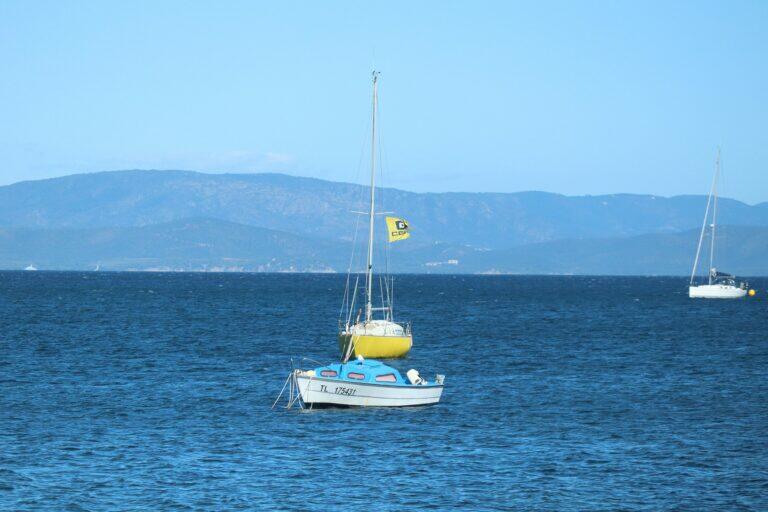
Historical monuments where you can stop without any problems
All history lovers will find something to their liking in France, wherever they go. Seemingly around every corner is a beautiful castle, chateau or a unique church. Many of them are prepared for an influx of not only your regular tourists, but also adventure hunters with caravans. That’s why you will usually find stellplazes in their vicinity. We can recommend a visit to these historic places:
Mont Sant Michel
A much-visited monument not to be missed on your travels. On a small island / outskirt lies a medieval monastery surrounded by a village. Among other things, the architecture of the monastery actually inspired the appearance of The Lord of the Rings film adaptation. The fairy-tale atmosphere that Mont Saint Michel has is amplified by the fact that it is normally accessible only during low tide and several times a year the island is completely cut off from the mainland. You can stop at the Beauvoir Stellplatz, about 5 km from this monument, where you will have access to water, electricity and Wi-Fi.
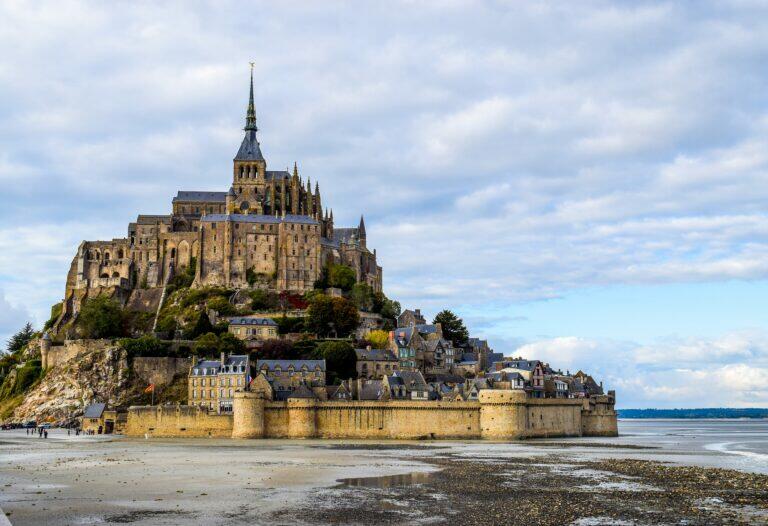
Lascaux Cave
From history right to prehistory! In the southwest of France, in the Dordogne region, is a world-famous cave complex, sometimes referred to as the Sistine Chapel of Prehistoric Art. Unfortunately, you cannot see the original paintings directly in the cave, but an extensive replica was built about 200m from the main entrance to the real Lascaux. An added bonus is the proximity to Motnignac village, where you can find a beautiful beach. You can stop either at the nearby Camping Le Vézère Périgord or at the Chemin des Amoureux ski slope, which is free but doesn’t provide any added services.
A historic town on the Loire River is part of an area often called the ‘Gardens of France’. Be sure to enjoy a walk in the city on the famous Vieux Tours area and visit Saint Gratien Cathedral. Then we’d recommend exploring the many castles located in the Loire Valley. There are plenty of Stellplatzes here, for example Tours in Voie de la Cissé, where parking is free and electricity and water are provided.

Skiing in the French Alps
A winter trip to France should definitely include some good skiing. In the parking lots near the slopes, you will come across parked caravans so there is no need to worry that someone will tell you off or you will be fined. We have tried and tested these ski resorts:
Alpe d’Huez
The south-facing slopes mean that the sun stays on the slopes for a very long time. This is great news as it makes it suitable for skiing for both experienced and complete beginners and don’t be afraid to bring the kids too. This is our favourite resort as the prices here are a bit more reasonable than in other places in France. During the summer (but not until September this year), Alpe d’Huez is full of cycling fans as the Tour de France passes through here.
An experience for more demanding and adventurous skiers or snowboarders is in the Savoy Alps. Although suitable for many fans of extreme winter sports, but you can enjoy it even if you go down the slopes in a casual fashion. For a little adrenaline, be sure to try the local toboggan run too.
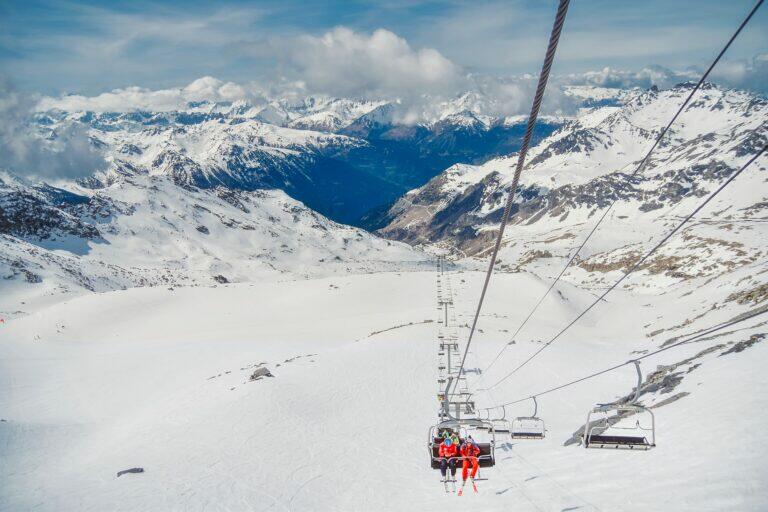
Campervan holidays in France: tips and things to know
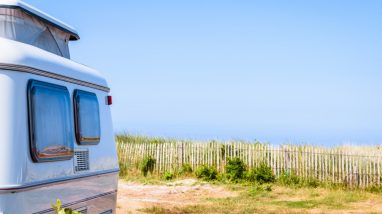
The freedom of driving around France in your own campervan , motorhome or RV is a true escape from the daily grind. There’s something so satisfying about being totally self-sufficient on the road , with nowhere to be and nothing to do. Whether it’s for a holiday with the family or you’re ready to join the #vanlife movement , camping in France with your own vehicle is a wonderful opportunity to enjoy the great outdoors.
Before you set off, it’s a good idea to gather a few nuggets of wisdom to help make your trip go smoothly: practical information for planning your trip, safety tips for while you’re there or general camping etiquette.
Here are our top tips for travelling through France by campervan.
Top tips for campervan holidays in France
Camping with kids.
Kids of all ages love the barefoot freedom of a camping holiday. Campsites are generally safe and secure spaces, where you can give them this freedom, allowing them to feel independent and make friends. Furthermore, many campsites in France , particularly sites in the south of France, have excellent facilities including swimming pools with waterslides, playgrounds, table tennis tables… (don’t forget your own bats and ball). All of this can give every family member space to enjoy things by themselves, as well as the family activities you do together.
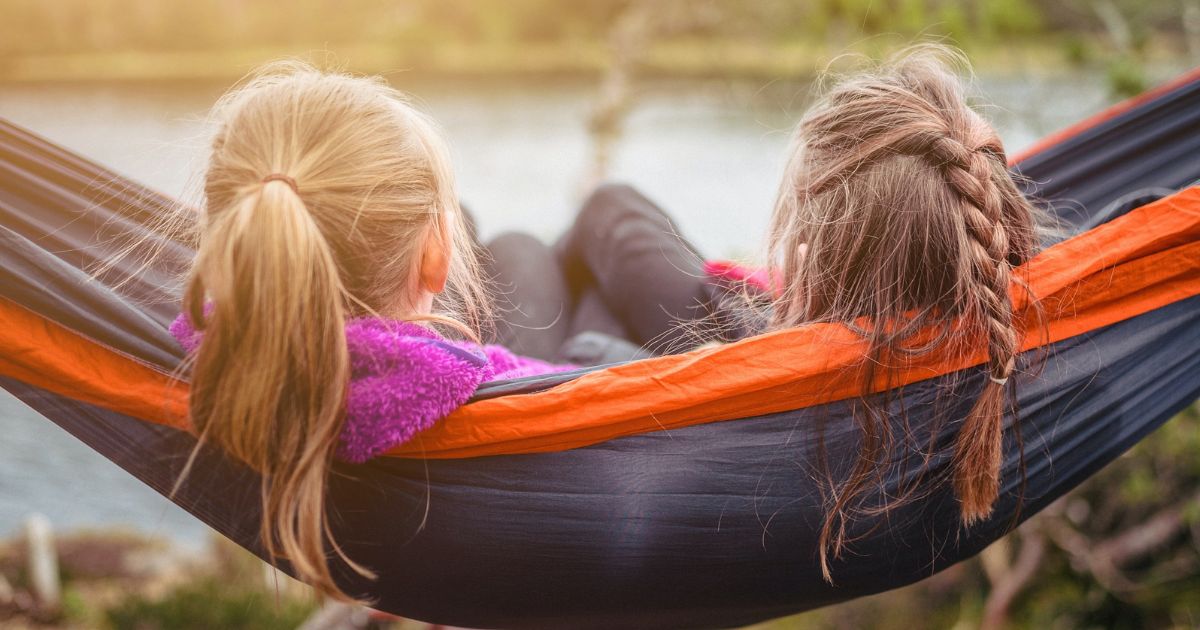
During the summer months, larger campsites even organise a range of activities – the likes of bike rides, cooking classes, workshops and art classes. There may also be evening entertainment for the whole family, such as discos, games nights and talent shows. These things are worth considering when choosing your itinerary and booking your pitches, especially if you are on a longer holiday where a bit of variety may be welcome after the first 4 or 5 days.
Measure your motorhome
If you’re not used to driving a larger vehicle , it’s definitely a good idea to know your van’s weight and dimensions. There are restrictions on certain bridges, tunnels and roads to watch out for, as well as access to car parks and other amenities. The size of your vehicle can also determine the speed you can drive on certain roads, so make sure you check the rules around this before you set off.
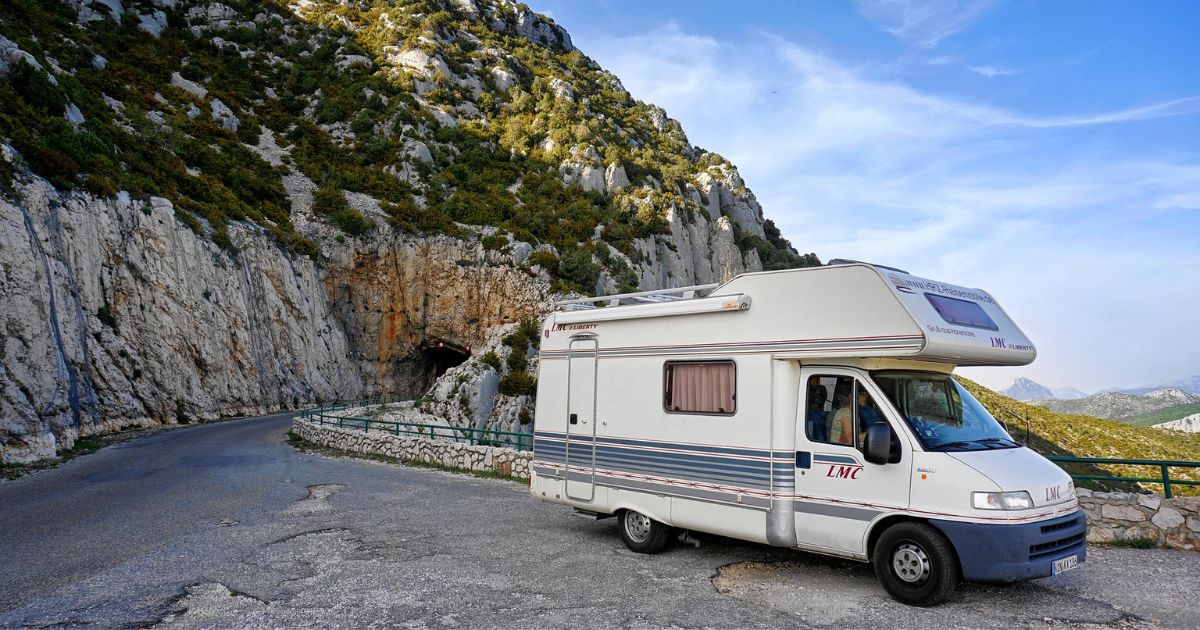
If you have a roof box, bikes or anything else on the roof or on a rack on the back, measure the exact, full height and length of your vehicle including these items and stick a very visible notice on your dashboard to remind you! Losing your bikes and damaging your roof would not be a good start to your holiday and we have seen it happen lots of times!
Stay connected
Camping is a great way to get back to nature, but a reliable internet connection is essential, especially if you’re checking maps , uploading photos or streaming movies in the van in the evenings. Depending on your data roaming coverage, you may want to purchase a prepaid Wi-Fi device on arrival in France, which should work in most areas. A reliable sat-nav system is also invaluable if you will be doing a lot of exploring. Back-up screen grabs of your mapped route and/or an old-fashioned paper map are good to have, in case your battery runs out or you hit an area with no mobile network coverage.
Camper stops in France (“aires”)
Many villages have places where campers and motorhomes can spend the night for free or for a small fee, called aires .
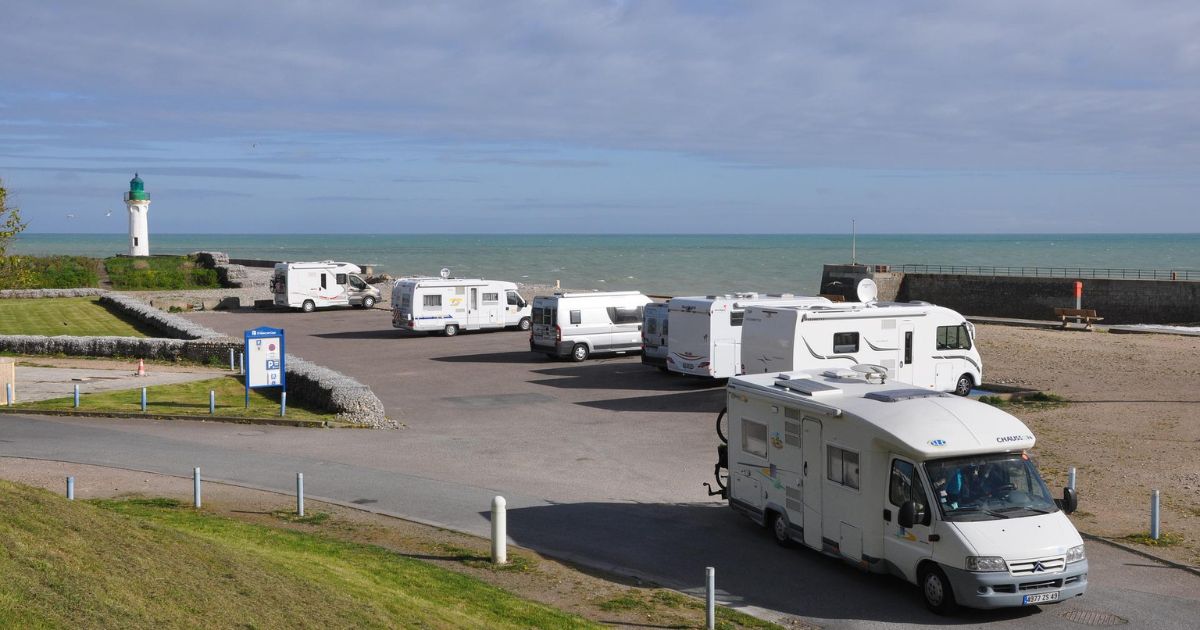
They can be found throughout France and some offer service points for water collection and disposal . You can find them using apps such as Park4Night or campercontact . They cannot be booked, so you just have to turn up and see if there is space. You can arrive and depart at any time, however some have a maximum stay of 24-48 hours .
For longer stays or for if you want to be sure to have a space, we recommend the most comfortable option of booking a campsite. Here are our tips on how to find the perfect one for you .
Take time away from the wheel
Depending on your plans, the size of your vehicle and the intricacy of your camp set-up, you may prefer to choose a campsite in France that is close to a bus stop or train station so you can go sightseeing without your motorhome , leaving it at the campsite. Bringing bikes is also a great way to explore the area without having to drive your campervan everywhere.
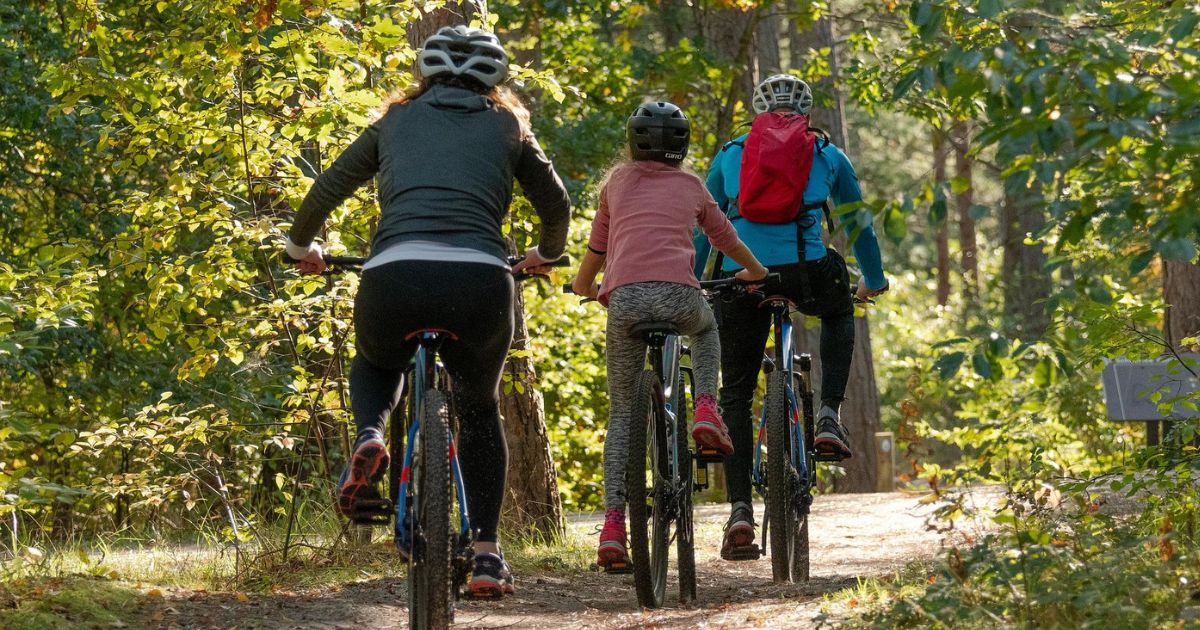
Campervan security
Get savvy with security and don’t make it easy for anyone to break into your home on wheels. You can find all of our top motorhome security tips here .
France safety laws
Here are a few items that, by law, you must have with you or on your camper , while driving in France:
- Headlight beam converters (if you are driving a right-hand drive vehicle)
- Seatbelts for all passengers at all times
- UK sticker if driving a British vehicle
- Hi-vis reflective jackets (one per person and must be accessible without getting out of the vehicle)
- Clean air sticker for driving in larger cities (check rules for your camper)
- First aid kit
- Warning triangle to put on the road if you break down or have an accident.
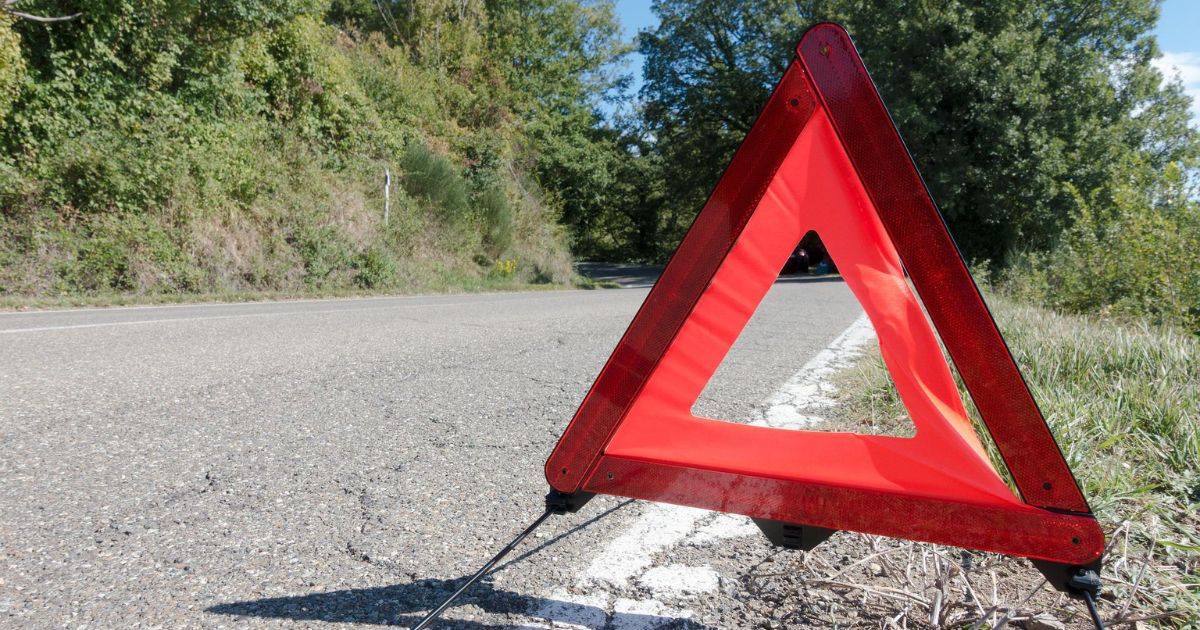
Speed camera detection kits are illegal so make sure you disable this setting on any sat nav or GPS systems. Breathalysers are no longer required in France.
How to organise a campervan holiday in France
Open-air holidays tend to require a bit more preparation than a trip to a hotel. You need to think about what to pack, how to travel around and where you will park your campervan overnight.
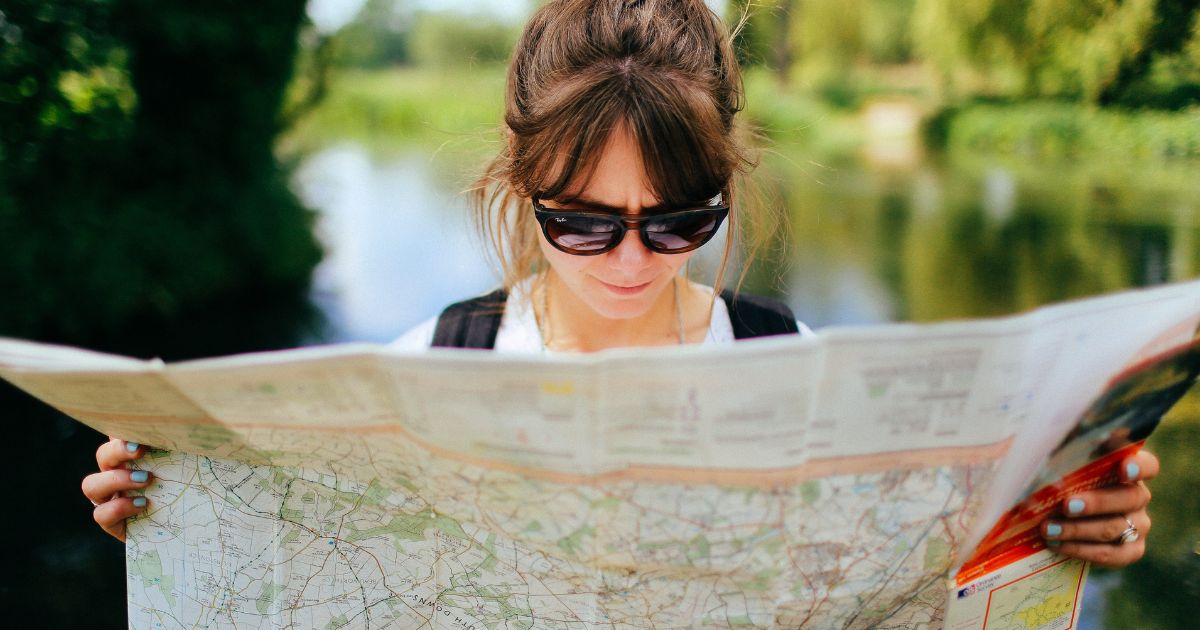
We promise it’s totally worth it. So grab your favourite notebook or set up a colour-coordinated spreadsheet and get planning!
Packing for your campervan holiday
If only there was one place you could go to find out what you need to take on your campervan holiday in France… Well, we’re thrilled to inform you that there is! Check out our Ultimate Checklist for a campervan holiday and don’t forget any of the essentials.
Campervan documentation
If you’re driving in France, you need to have all of these documents onboard:
- Passport and full driving licence (in date)
- Motorhome insurance documents (valid for driving in Europe)
- Breakdown cover (valid for driving in Europe)
- Vehicle V5 logbook (original)
- Personal travel insurance.
Planning your route through France
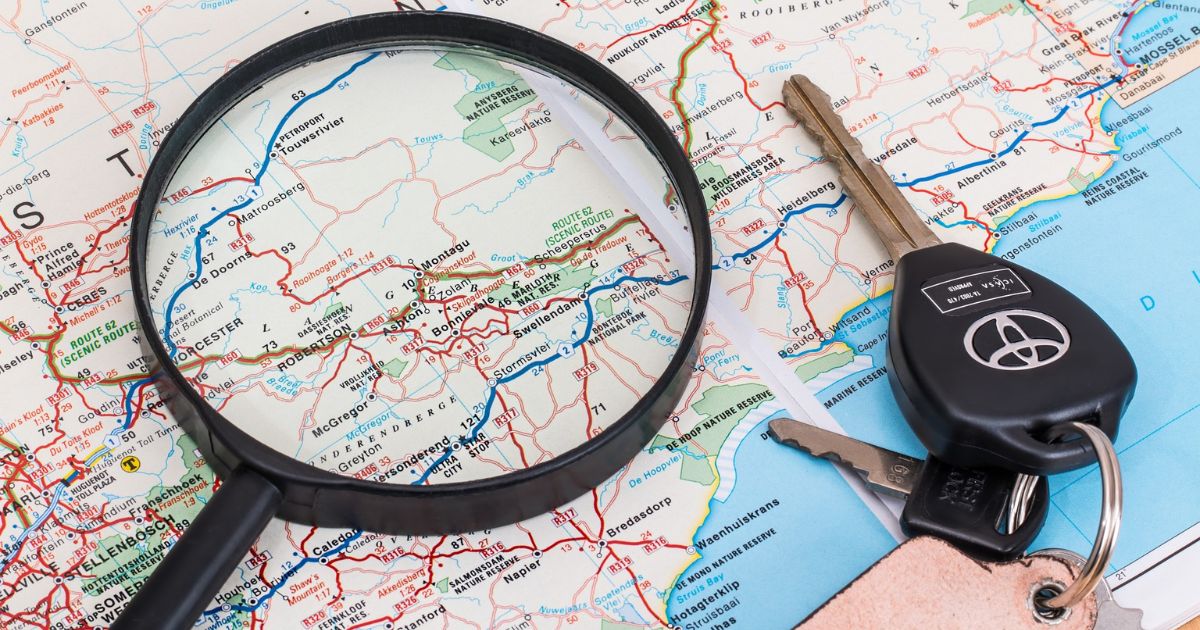
From grand chateaux to verdant vineyards, and spectacular mountain ranges to brilliant beaches, your camping trip to France will be unforgettable. Luckily, we’ve done the hard work for you and found some of the best routes and destinations for you to choose from.
Booking your campsites
Booking your trip couldn’t be easier. Head to Campsited.com and search to your heart’s content. You can filter your campsite search by region, surroundings, amenities and specialist themes, so you can find exactly what you want.
FAQ: Your campervan holiday questions answered
Should i book my campsite in advance.
You may need to book in advance, depending on when and where you are going. Summer is the peak season for camping in France . Campsites tend to fill up for July and August well in advance, particularly larger campsites along the coast and close to tourist destinations. There are also different amenities you may want to look out for. Read this guide to understand why different campsites vary in price .
If you are travelling in the off-season, you may not need to make reservations, especially if you are just stopping over for one or two nights. Just beware that not all campsites stay open all year round, and those that do may close their gates earlier in the off-season.
Can I take my pet with me when I’m camping in France?
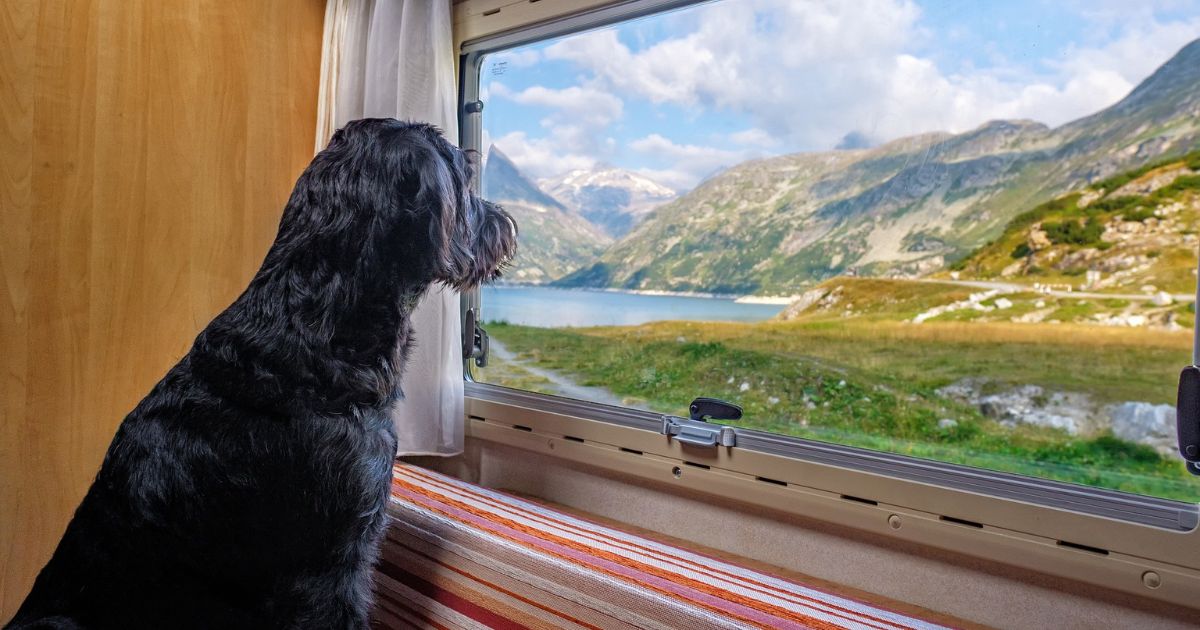
Many campsites welcome four-legged friends ( find our list of pet-friendly campsites here ), but always check the campsite’s pet policy before you make your reservation, as there will be site-specific rules and amenities. Most campsites request that dogs are kept on a lead within the campgrounds, for example. Bringing a pet may also incur additional fees. There are also legal requirements you must follow when taking your pet abroad – check out our article on camping with dogs for more tips.
Can you park a camper anywhere in France?
Parking your campervan in the daytime is much the same as parking a car in France, unless there are specific signs prohibiting it. If you want to know where to park your campervan overnight , see above for information about aires , or below for information about wild camping.
How much does it cost to hire a campervan in France?
The cost of hiring a campervan depends on the type of vehicle you are looking for, the time of the year, the age of the driver and the level of luxury. It can be anywhere between £300 and £1200+ per week. The best way to know is to spend two minutes filling in your holiday details in our campervan hire search tool and get quotes from all the rental companies.
How old do you have to be to hire a campervan in France?
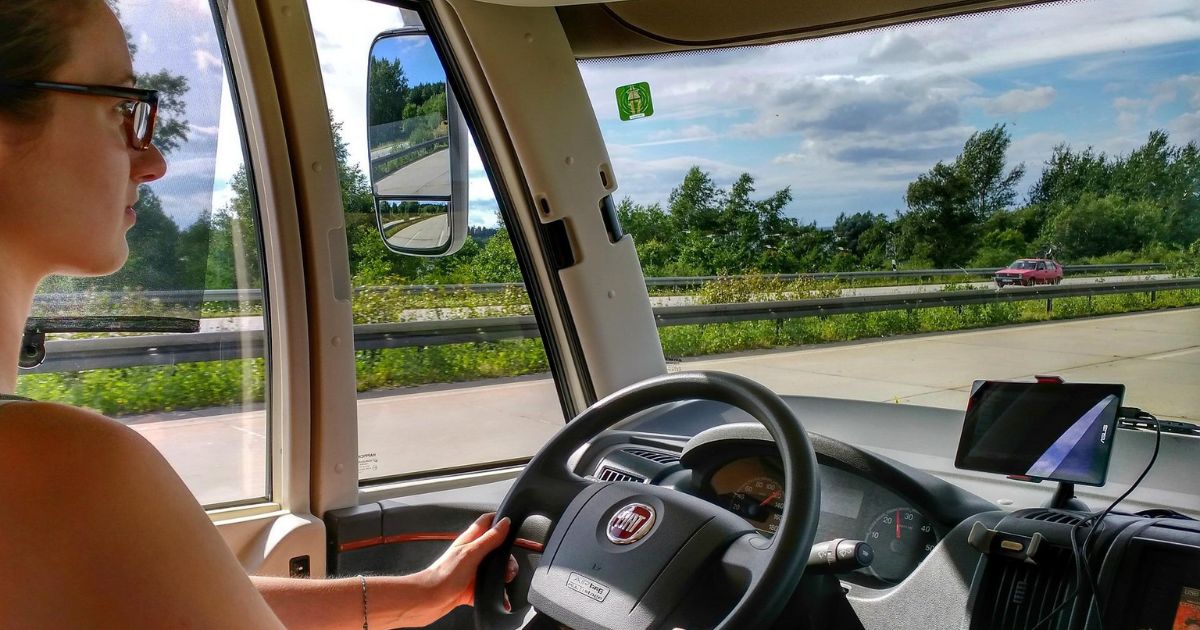
The typical age requirement for hiring a campervan in France is 25 years old . Certain companies will rent to 21-year-olds, but you may need to pay a little extra. Check directly with the rental company – it will be detailed in the terms and conditions of all the quotes offered by our motorhome search tool.
If a company does accept a younger driver, a different insurance policy may apply , so also read the insurance terms and options carefully, as you go through the booking process.
Lastly, check in the terms if your national driver’s licence is acceptable. Some rental companies may require an International Driver’s Licence.
What kind of facilities are available for campervans at French campsites?
If you’re travelling with a motorhome , a fully serviced pitch generally includes electricity hook-up, water fill points, and waste disposal for chemical toilets and grey water. You can also use communal campsite facilities , such as washing machines and BBQ areas, as well as restaurants, cafés and swimming pools.
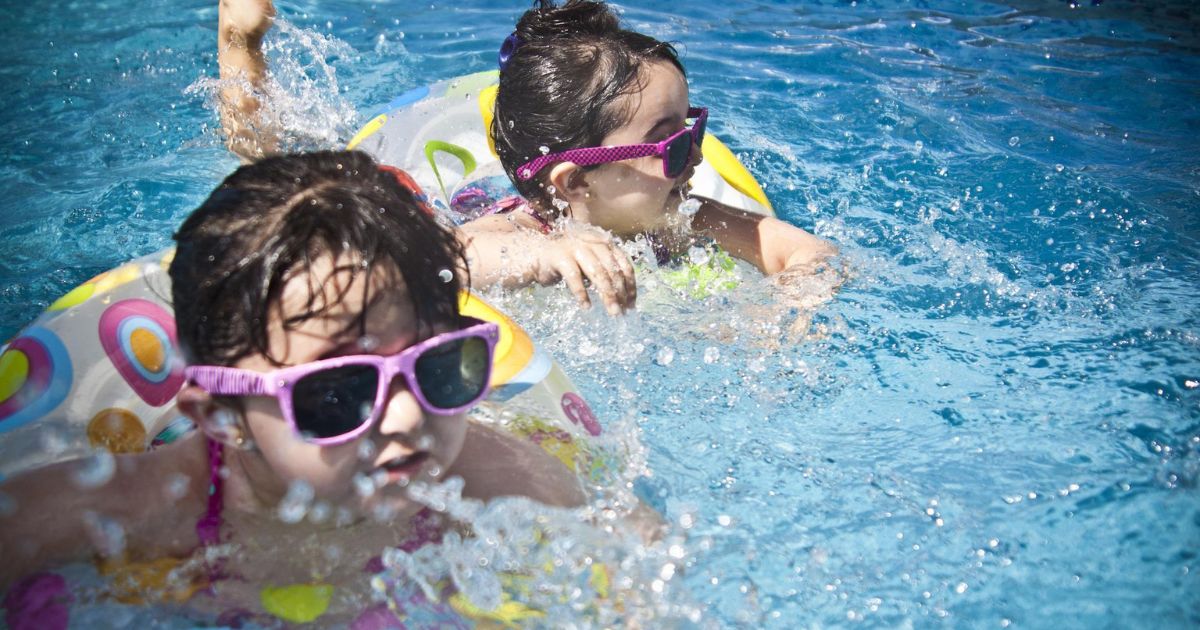
The size of pitches will vary from campsite to campsite, so make a request in advance if you require a larger pitch or something more private. Depending on the campsite, you may also be able to upgrade to a pitch by the river or a place with a view, so you can set up your awning and relax in the shade.
Do all campsites accept campervans?
Most campsites offer pitches that cater for tents, campervans and larger motorhomes, although it is always a good idea to check in advance. The price of a campervan pitch at a French campsite will vary depending on the number of stars and facilities the campsite has, the number of people per pitch, and whether you are camping during high or low season.
Is wild camping permitted in France?
Wild camping is a bit of a grey area in France, with restrictions in national parks , along the coast and close to historical monuments to protect the natural environment and heritage areas. In other areas it is generally tolerated with the permission of landowners, but you should take your waste with you, never light a fire, and try to leave before 9am. Check the signs wherever you are, to avoid paying a fine. See above for information about designated camper spots in France called aires .
We hope you’ve found some helpful tips here, to make your next French camping adventure unforgettable . Now all you need to do is pack your bags, put together the ultimate road trip playlist and get on the road.
Bon voyage!
Similar Items
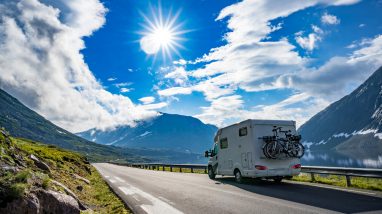
Motorhome and campervan types: how to choose the right one
Campervan and motorhome holidays: everything you need to know
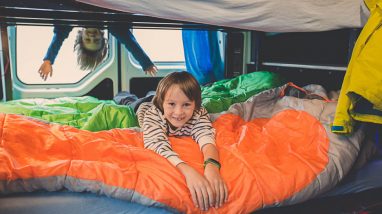
First campervan holiday with kids: what to know
Biggest choice, filters and verified reviews, fast, efficient, secure.
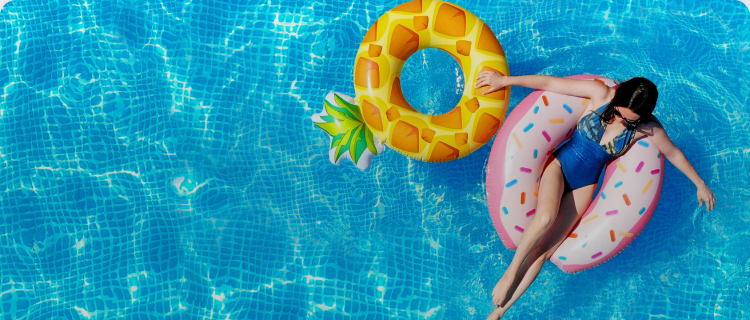
The best deals delivered to your inbox
Sign up for discounts, great destinations and last-minute offers.

- Visit our Customer Support Centre
- Sign up\Login

Travelling to France with a motorhome - All you need to know
It's a foregone conclusion: your next motorhome trip will be to France ! On the way, you will encounter the most beautiful landscapes, eat the most delicious French dishes and feast your eyes on the historical villages and cities. To prepare for your motorhome journey to France, below you'll find a selection of the highlights, important traffic rules, camperstops and camper guides. Bon voyage!
Highlights on a motorhome journey to France
Normandy & Brittany Normandy and Brittany are among the most popular regions in France. This is not surprising with the beautiful landscapes and historical cities that you will find there. This motorhome route takes you to the most beautiful places in Normandy and Brittany. In Giverny in Normandy, you will learn all about the French painter Monet. Afterwards, you continue to the forests of Lyons la Forêt for a pleasant walk. From here, travel to Rouen for the Gros Horloge, an immense watch you can admire from the street. Then tick the 'Venice of Normandy' and the chalk cliffs of Etretat off your French bucket list. Then head on to Brittany, passing the Côte de Granit Rose, Dinan, Rennes and Carnac. The Pyrenees In the French Pyrenees there are several locations worth exploring. For example, go to Cirque de Gavarnie, one of the most beautiful valleys in France, visit Saint-Lizier, which is called one of the most beautiful villages in France. Wherever you go in the French Pyrenees, there are plenty of places to go walking and cycling. So be sure to bring your hiking boots and bicycles on your next motorhome journey through France!
Wine regions If you travel from A to B in your motorhome in France, you're bound to come across them: endless vines ! Burgundy, Alsace and Bordeaux are among the most famous wine regions in the country. So it's time for a visit with your motorhome! Drive a wine route that takes you past the most beautiful vineyards and regularly tastes a good glass of wine or combine your visit with a city trip, for example to Auxerre or Dijon, from where you will be among the vineyards in no time! UNESCO World Heritage Sites: the jewels of France The UNESCO World Heritage List boasts numerous beautiful sights in France. Think for example of the old market town of Provins, the harbour town of Le Havre or the fortress town of Carcassonne where you can admire the enormous fortifications surrounding the city. They are all on the list for a good reason, so it's time to pay them a visit in your motorhome!

Camperstops in France
Special traffic rules during your motorhome journey in france.
- Large motorhomes with a maximum permitted mass exceeding 3500 kg must have a blind spot sticker affixed to the motorhome.
- Previously it was compulsory to carry an alcohol test in the car. From May 2020 this will no longer be compulsory.
- When driving on a narrow mountain road, ascending traffic has priority over descending traffic.
- Along a toll road, repairing your own vehicle is prohibited.

Guides for your motorhome journey in France

More inspiration

Where to go with your motorhome in May?

Discover Vienna by motorhome!

Ruhr region: a motorhome-trip with an industrial edge! - Part 2

6x free motorhome stopovers in the Algarve!

La dolce vita in northern Italy!

Staying overnight during the asparagus season!

Get out and about on the PACTO folding bikes!
As a registered user you can make use of all the functionalities of Camperstop.com. Create an account or log in.
Cycling travel tips, resources and product reviews
Campervanning France Guide

Check that image above out. Looks amazing right? This is the Col du Lautaret (which is right near the famed Col du Galibier) en route to a few days of croissants, coffee and riding the Alpe d'Huez.
Most of us have seen the campers parked on the side of the road whilst watching the cycling on the telly, and boy does it look fun.
And it seems so easy, right?
Hire camper. Drive around. Ride bike. Enjoy oneself.
There are a bunch of tips and tricks you definitely need to know before booking a campervan based holiday.
After all you don't want to spend thousands of dollars and end up not enjoying yourself, do you? (Wait, do you?!)
Enjoy a hassle-free campervan trip, saving hundreds of dollars along the way with this must-read guide.
Planning a holiday overseas—especially a campervanning holiday—is a lot of work.
Most of us want to enjoy the planning without the hassle and loads of wasted time in forums and wading through Google search results.
It's also always useful to use the experience of others to help yourself avoid pitfalls and tricks.
Now, you can save yourself all the time, hassle and get straight into the fun planning stuff for your next Campervanning Holiday.
The Campervanning France eBook is the ultimate guide to planning a campervanning trip in France.
This ebook will help you discover the inside tips and tricks that will make your trip as hassle-free as possible.
Top 5 Reasons You Need My Guide to Campervanning France
- Campervanning is expensive – use my budget calculator to compare campervanning with car/hotels to see which is cheaper for you
- Eliminate problems and pitfalls in your journey – all the insider tips and tricks
- Save time and money and do it yourself with this eBook!
- Easily organize self-guided tours to the Tour de France, Etape or just for a holiday!
- Everything you need in one comprehensive, printable guide
Learn from my Experience and Insights
I've done multiple trips to France in campervans. I've spent over 50 days on the road in a campervan, driving all over France and the north of Spain. I'm a planning and logistics obsessive, and I've noted all the tips and tricks you'll need to know to make your trip as awesome as possible.
Despite countless hours researching and planning this trip, AND a previous campervan trip to France, there were still many pitfalls we were unaware and unprepared for. Some of them cost us many hundreds of dollars.
This guide is designed to make the planning and execution of your trip easy, hassle-free and cover all the angles, by showing you all the ins-and-outs and presenting the information you need, in one easy-to-read, single location.
Campervanning around France is so awesome – And It Doesn't Have to Be Hard to Organise
Watching the Tour de France on TV, one thing that really stands out are the campervans. The campervans and their inhabitants are an important part of creating the Tour de France atmosphere.

It seems like such an awesome thing to do; hire a campervan and drive around France in the summer.
It seems so romantic; sunshine, cycling, the Tour and seeing France.
But, where to start? Who to book through? Is a campervan trip the most cost-effective way to travel? When should I book?
Organising such an epic trip can be a lot of work. Most people want their trips to be as hassle and headache-free, and cost effective as possible.
So to help you save time, hassle and money, I’ve taken all the hard work out of planning and researching your trip by putting everything you need to know in one comprehensive, handy, printable, guide to Campervanning France.
What You'll Get in Your Copy of Campervanning France
The Campervanning France guide is chock-a-block full of the best information you'll find on Campervanning France.
In the guide, you'll find out:
- Car/Accommodation versus Camper: cost comparison download, pros/cons of each choice, other observations and “Get a Camper If…”
- Pre Planning Work: Daily budget estimate covering food, tolls, fuel and campgrounds
- Deciding on the type of campervan: which type according to who is going on your trip
- Booking: What to Look for when Booking, Who to Book Through, Camper Locations, Extras (bike racks etc), Arrangements on Arrival, When to Book, When to Go, Depot Times, What to Do on Arrival
- Before You Leave: Insurance, What to Pack
- Taking Your Bike: to take your bike or not, What Bike to Take, Bike Gearing, Bike Bag (including links to the famous VeloNomad bike bag video reviews), Packing Your Bike Safely.
- On Arrival: At the Depot, Checking the Camper, What to Do Before Driving Off, What to Buy on Arrival
- On the Road: Autoroutes, Alternative Routes, Pulling Over, Towns (traffic, parking), Oncoming Traffic, Passing Trucks, Anticipating Traffic, Travel Times, Fuel, What to Do at Tolls, Parking for the Night, GPS/roadmaps, Campgrounds, What to Eat, Where to Stay, In the Supermarket and Campervan Maintenance
- Riding: Where to Ride
- Seeing the Tour: Planning, On the Day, Planning for all Weather
- Etape du Tour
- Going Home: Dropping Off the Campervan, Cleaning the Campervan, Damage to the Campervan, Getting Caught Out with Baggage
So, if you’re planning a trip to France (and surrounds) to campervan and perhaps follow the Tour de France, do L’Etape, or just to travel in France, you’re going to want this guide – over 70 pages jam-packed full of critical information, tips and research.
So, you’re still not convinced?
Hey, that's cool!
You can use the Google Books preview of the Campervanning France guide below to check out a preview of the guide and make sure it's right for you. You can also check the preview out here .
Convinced Now?
Awesome. Download the Guide instantly as a PDF via the buy now button below. Check out is with a credit card via PayPal (you don't need a PayPal account).
PLEASE NOTE: This product is in ebook format only. You will not receive a hard copy.
REFUND POLICY : I’m so confident you will be completely satisfied with your purchase, that you’ll receive your money back, guaranteed, no questions asked, if you're not happy with the Campervanning France guide!
PS: Just click the button below to get the guide now.

7 comments comments closed

The Best Destinations for Motorhome & Campervan Holidays in France
This post may contain affiliate links, from which we earn an income.
Motorhome & Campervan Holidays in France
France is so easy to get to in a motorhome or campervan. Just hop across the channel and you’re in another world. Find all the best destinations for motorhome and campervan holidays in France here.
For many people, France is the best place to road trip and holiday in a motorhome or camper van in Europe – us included, we have been living and travelling in our campervan in France and Europe for the past two years.
In this guide to motorhome destinations in France, you’ll find information about all the best places to travel to in a motorhome or campervan in France plus tips about where to stay in France in your home on wheels!
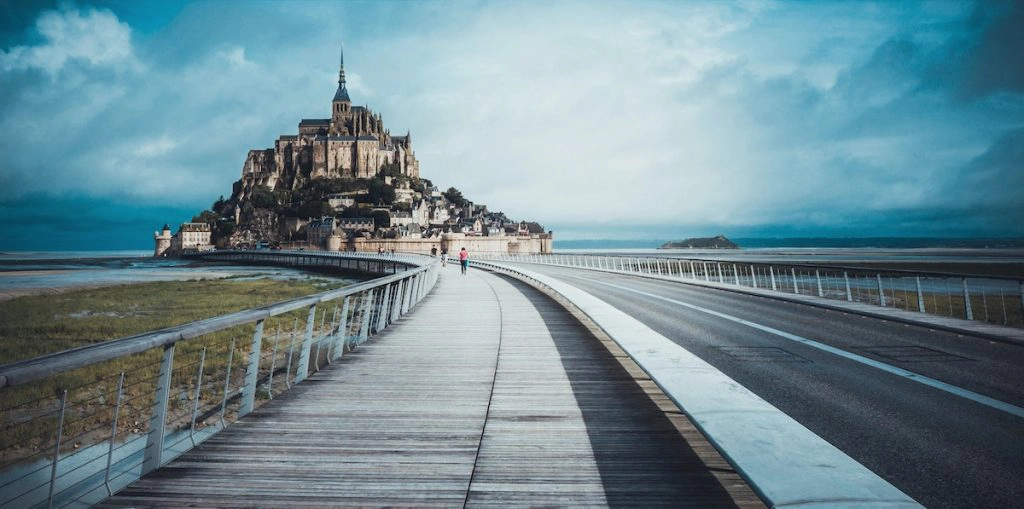
The proximity to the UK, ease of getting your vehicle there and the welcome motorhomers receive makes it a favourite place for motorhome travel. Read on for a quick spin around the diverse regions to find the best French holiday destinations, off the beaten track destinations and some great ideas for fantastic motorhome holidays in France.
If you’re looking for France campervan hire or motorhome rental, check out Auto Europe , who have over 50 pick up locations and a large fleet, for special offers and deals. For help planning a route, read this comprehensive guide to motorhome road trip planning .
Where to Stay in France
Campsites in france for motorhomes.
There are thousands of France motorhome and campervan sites. From five star luxury on the Cote ‘d Azur to caravan and motorhome club sites in France and rustic and rural in the Auvergne, you’ll find a site and pitch that’s perfect for you as you’re touring France. Book the best French campsites with Eurocampings for the best deals on over 2,700 campsites in France.
Use your ACSI CampingCard (which gives you 60% discount at European campsites out of season) for out of season per night deals and discounts and to help you search for the best motorhome sites in France, wherever you’re heading. Check out our pick of the best motorhome campsites in France and Europe .
French Aires
Whoever first suggested the network of aires scattered across France deserves a medal. All around this welcoming country, you’ll find motorhome aires where you can stay overnight for just a few euros (sometimes free) and be provided with fresh water, waste services and sometimes electricity.
Often run by the local municipality and occasionally commercially, aires draw people to towns and villages that would otherwise see no tourist traffic. Use the All the Aires book or Park4Night to find these great alternatives to campsites for motorhomes in France.
Is this your first time visiting France? Get all the information you need in our France Travel Guide , including what to pack, the best time of year to go, getting there and practical tips to help you have the best trip!
Wild Camping for Motorhomes in France
There are lot of opportunities to wild camp in France . Follow the rules, pick your spot and be respectful and you’ll be able to road trip the whole country without needing to stay on a site. Use Park4Night or one of the other wild camping apps to find the best spots.
France Passion
A scheme unique to France, you pay £30 for the book, maps and online access and can stay at any one of over 2,000 vineyards and farms, some even have a swimming pool! France Passion will get you off the beaten track and meeting local people, many of whom have hands on roles in producing the food and drink of the regions and pride themselves on their welcome and customer service.
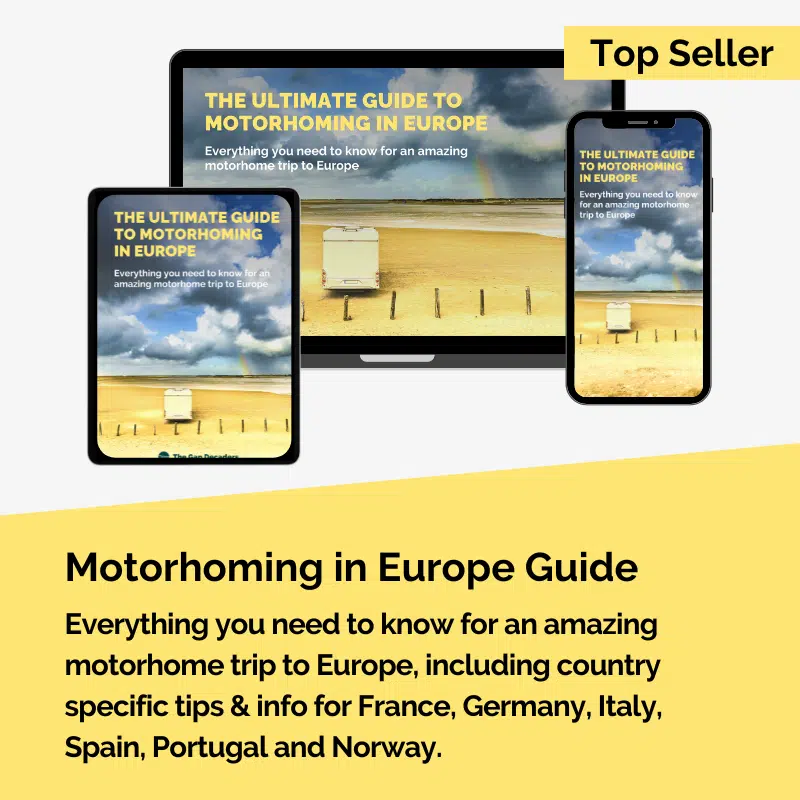
The Ultimate Guide to Motorhoming in Europe
If you’re planning a motorhome trip to Europe for the first time, our guide has tips, advice and info to help you plan your tour.
Don’t struggle trying to plan your European trip, find out everything you need to know before you go + loads of motorhoming tips for when you arrive.
Map of French Regions
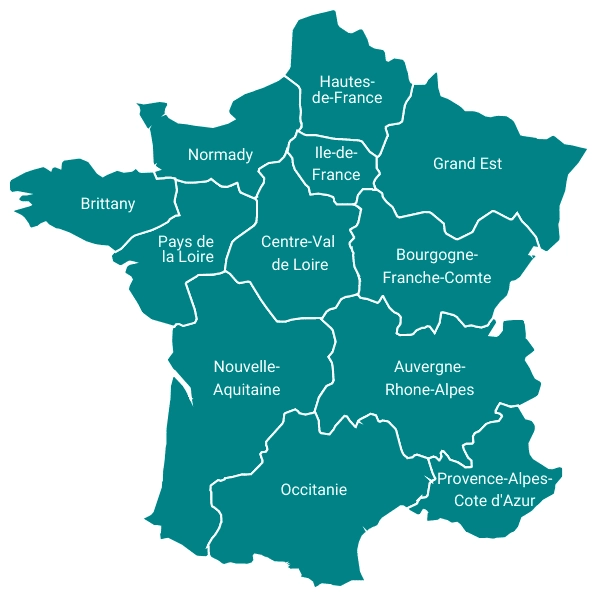
Auvergne-Rhone-Alpes
A huge region, the Auvergne-Rhone-Alpes stretches from the high hills and plateau of the Massif Central in the west to the highest point of the French Alps in the east. Luckily driving a motorhome in France is easy, as Lyon from Calais will take you around seven to eight hours on the autoroute.
Get to Dijon and set your sat nav to non-toll roads for the best scenery as you head into the region. Lyon, considered one of the most beautiful cities in France , is also a great staring point for this region if you’re looking for motorhome hire or campervan rental as Motorhome Republic have lots of collection options from the airport.
Divided by the mighty Rhone river and with the centre of the region being the vibrant city of Lyon, there is great diversity here and four distinct climates. The further south you head, the more you will notice the flora, fauna and climate taking on a Mediterranean feel.
Come here if you like…
- Mountains – there are literally hundreds in this region, across the mighty Alps and Mont Blanc to the medium-high extinct volcanoes of the Massif Central.
- Being active – from extreme sports like paragliding to white water adventures and the more day to day skiing and hiking, this region is a paradise for anyone who appreciates activity in the great outdoors.
- Gastronomic delights – Lyon is not only one of the most beautiful cities in France , it is the food city of this gastronomic country. Regional dishes are influenced by the mountains and tends to be hearty and wholesome. Melted cheese is a favourite from fondue to the divine raclette , just one of many dishes made with melted cheese and potatoes!
- Water sports – with Lake Geneva, Lake Annecy and Lac de Bourget in the region, summer sailing, wind-surfing, paddle boarding and kayaking are on the doorstep.
Bourgogne-France-Comte
This beautiful region of France is famous for its rich history and wine. Sometimes abbreviated to BFC, this area is around a five to six hour drive from Calais on the A26, making it a great area for a one week motorhome itinerary.
Part of this area is the old historic region of Burgundy, once the heartland of France and known for its’ wines, such as Beaujolais and Chablis. With a mix of low agricultural lands and the fabulous mountains of the Jura, BFC is sparsely populated and sees relatively little tourist footfall.
- Great food and drink – the home of the unique Vin Jaune, Boeuf Bourguignon, Coq au Vin, Comte cheese and Dijon mustard is a powerhouse of French cooking, particularly where the use of wine is required!
- Atmospheric historic cities – Beaune and Dijon are just two gorgeous cities in this region, packed with history, Gothic and medieval architecture with a typical French ambience.
- Breathtaking castles – there are well over thirty well-preserved chateaux in this region, find the best of them here .
- Off-the-beaten-track places – you won’t find hordes of tourists here, especially if you head to the Jura mountains for fantastic hiking and their magnificent cirques.
The rugged peninsula of western France, Bretagne, is an ideal place for a two week motorhome itinerary. With Rennes, the capital of the region, being just an hour’s drive from St Malo, it is literally a hop over the channe l. Two to three hours from Cherbourg and five to six from Calais, this is an accessible area wherever your start point and route.
With a wild and dramatic coastline and with an undiscovered feel beyond the well-known tourist spots, Brittany offers a shared Celtic culture, ancient mysticism and every type of beach imaginable, as well as the incomparable Mont Saint Michel, one of the most beautiful landmarks in France .
- Beautiful gardens – also known as the Garden Coast , Brittany has some of the best gardens in France. From English country borders to exotics, there’s something here for every green-fingered visitor.
- The Îles de Glénan – a stunning archipelago off the Brittany coast, perfect for a day trip.
- Delicious cider – Brittany is cider country. With more than 600 apple varieties grown in the region, there’s a cider to suit everyone’s tastes.
- Customs and tradition – the pan-Celtic tradition is very evident here; the Breton language is spoken with pride and wide-spread cultural festivals celebrate Celtic music and dance.
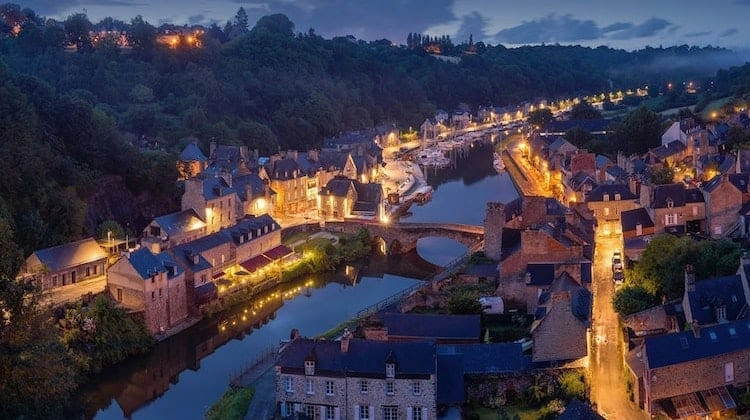
Centre-Val de Loire
Centre-Val de Loire is a landlocked region, located to the south-west of the French capital Paris. As the name suggests this region is all about the magnificent river Loire. Just four to five hours from Calais to the capital of Orleans, and an an hour less from Caen, this region is a popular holiday destination and would be ideal for a motorhome road trip following the river.
Fine historical cities and towns, many of which stand on the banks fo the Loire, offer superb Renaissance religious buildings and architecture and of course, the fabulous and extravagant chateaux the region is best known for.
- Delicious white wine – Touraine, Vouvray, Pouilly-Fume, Sancerre and Valencay are just some of the well-know whites produces in this region. Take a vineyard tour and make sure to enjoy a tasting afterwards!
- Beautiful chateaux – one of the main attractions of the region, the chateaux of the Loire Valley are world famous. There are over eighteen chateaux in this region alone, find ten of the best of them here .
- Historic cities – from Joan of Arc’s home city of Orleans to the royal chateau of Blois and Tours with it’s beautiful old town, the cities of this region are must-sees.
- Bird watching – La Brenne natural park is the hidden gem of Centre-Val de Loire. To the south of the region, this huge park containing over a thousand lakes is a wetland paradise for twitchers. Over 260 species have been recorded here, and over 150 species are known to breed here.
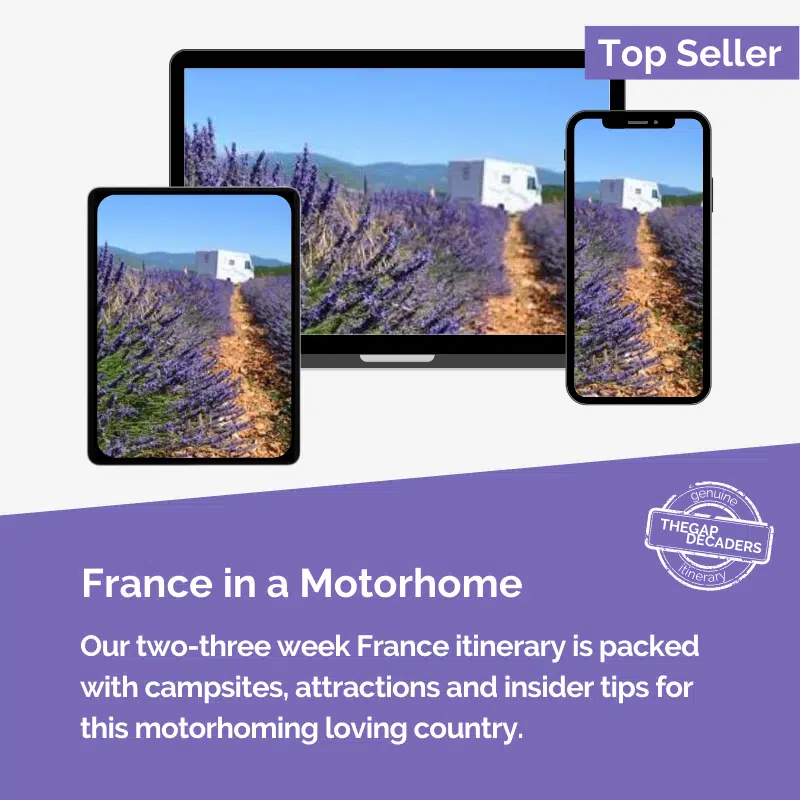
2 Week Motorhome Itinerary France
Let us do the planning for you and grab our France motorhome itinerary, packed with campsites, aires, attractions and insider tips.
Let us do the hard work for you! Get up every day knowing your trip is planned with driving routes, overnight stops and attractions marked out for you on your interactive map.
Grand Est borders Germany, Luxembourg, Belgium and a small part of Switzerland so its not surprising that this region has multi-cultural influences. One of the easiest regions in France to get to if you’re arriving in Calais, a four hour drive will take you to the heart of the rolling Aube, for the fantastic champagne route . In six hours you can be in Strasbourg , the capital of the region and home to one of the best Christmas markets in Europe.
Previously known as Alsace-Champagne-Ardenne-Lorraine, the region is an intriguing mix of vineyards, the low lying Vosges mountains and some of the prettiest towns in France, found in the Alsace department . In some less-visited and remote wooded parts of the Vosges, lynx, boar and wolves can still be found in the wild, making the rich nature and bio-diversity of the area of particular interest.
- Medieval cathedrals – Grand Est is home to some of the most beautiful cathedrals in Europe, many are UNESCO World Heritage sites.
- Champagne and wine – the vineyards of the Champagne and Alsace departments are a must if you’re a wine lover, with Lorraine producing lesser known but no less delicious wines to rival Alsace. The wine route of Alsace is perhaps the best known, but there are others to be explored.
- War history – the moving Verdun & Argonne battlefields and war graves cemeteries of WWI can be found here, along with the WWII Maginot Line forts. The Surrender Room in Reims is where German forces surrendered to Eisenhower in May 1945, brining an end to the long war.
- Accessible hiking and cycling – easier on the heart and lungs, the hiking routes of the Vosges are a pleasure. With stunning rolling scenery and trails to take you through historic villages and make the most of the views, hiking in the Vosges is accessible to all. Cycling in Alsace takes you to the heart of the region, and the smells and sounds of the many vineyards will fill the air as you cycle through the lush, rolling countryside.
Hautes-de-France
This is is the most northerly region of France, to the north of Paris and home to the port city of Calais, meaning it’s on your doorstep. Not a major tourist region, the area is known for the battlefields of WWI, most notably the Somme, a four month battle in which over a million people lost their lives.
Visiting this region is inescapably poignant and most people come here predominantly for the memorials and war sites. But there is more to see here, including the incredible beaches, elegant resort towns and pretty fishing villages dotted along the unspoilt and beautiful Cote d’Opale, or Opal Coast .
- Battlefield tours – the battles of Flanders, the Somme, Vimy and Ypres were all fought on the soil of the Hautes-de France by French, British, Canadian, Australian and African troops. The memorials and cemeteries marking these make for moving visits.
- Mining history – much of the infrastructure in the northern parts of the region has been shaped by mining, a now redundant industry in this part of France. Visit the UNESCO listed Nord-Pas de Calais Mining Basin for a fascinating insight into the industry and a miner’s life in the pits.
- Beautiful belfries – tall and often ornate clock-towers attached to civic buildings, belfries are common in the region and were built to symbolise the power of the local alderman and councillors. The Belfries of Belgium and France is a UNESCO World Heritage listed site and features Roman, Gothic, Renaissance and Baroque styles of architecture.
- Seaside resorts – littered along the coast, the resorts of le Touquet, Dunkirk, Boulogne-sur-Mer and Neufchatel-Hardelot are known for great seafood, wind sports and pretty architecture.
Motorhoming in France Essentials

Ile-de-France
Ile-de-France is the small region surrounding the beautiful city of Paris . The region is home to Paris itself and several other notable cities, the best being the UNESCO fortified city of Provins, the huge forested estates surrounding Fontainebleau and Versailles, the site of the palace of the same name.
A four hour drive from Calais, it is perhaps not the first destination motorhomers think of but it is possible to avoid Paris completely in your motorhome and see see the best bits of this compact region.
RELATED POST: One Day Paris Itinerary – Map, Guide & Tips
- Big cities – although driving in and around Paris in a motorhome is to be avoided at all costs, you can camp outside Paris and get the train in, just follow this perfect Paris itinerary !
- Theme parks – just three and a half hours from Calais, Disneyland Paris is achievable for a long weekend in your motorhome. Check out Park4Night for campsites near Disneyland Paris for motorhomes.
- Modern architecture – there are four Le Corbusier villas in Ile-de-France. Villa Savoye in Poissy and Villa La Roche, Villa Jeanneret and Immeuble Molitor in Paris itself.
- Royal palaces – The Palace of Versailles has to be one of the most opulent and ornate palaces in the world. Glistening with gold leaf, the interiors of Versailles seem to go on for miles. Stuffed with historic paintings, furniture and artefacts this royal palace is an incredible architectural achievement and a real bucket list Paris attraction . If you find the interiors a bit much, the gardens are truly spectacular.
Normandy borders the English Channel and is easily accessible from all the channel ports, the furthest being St Malo around a three to four hour drive. Le Havre is in the region itself and a perfect arrival port which is popular with motorhome travellers. Normandy was a significant medieval empire and controlled much of England and Wales, leaving a rich history for visitors to explore.
The three huge attractions of Rouen cathedral, the Bayeux Tapestry and Mont Saint-Michel are the must-sees of the region. Along with the pretty fishing port of Honfleur and the D-Day beaches, this region has much to recommend and is one of the best motorhome destinations in France.
RELATED POST: Normandy Road Trip: Ultimate 7 Day Itinerary
- Medieval heritage – Rouen, where Joan of Arc was burnt at the stake, is chock full of medieval architecture and history. The Bayeux Tapestry, telling the story of the Norman invasion of England in 1066 is held in the town of the same name.
- Gorgeous gardens – if you are a gardener or painter, then there is no better garden in the whole of France than Giverny, Claude Monet’s country home and garden. Gloriously and unashamedly colourful, this beautiful place has provided inspiration to generations of gardeners and painters alike.
- WWII history – hundreds of thousands of Allied troops landed on the beaches of Omaha, Gold, Juno and Sword on 6 June 1944. The D Day landings and the Battle of Normandy which led to victory on the western front are commemorated at hundreds of moving cemeteries and memorials in the area.
- Impressionist art – known as the birthplace of impressionism after Monet took inspiration in Le Havre and painted ‘ Impression, soleil levant ‘ (‘Impression, sunrise’) in 1872. Normandy houses two major collections and has no fewer than fifteen museums dedicated to impressionist art and history.
Nouvelle-Aquitaine
One of our personal favourites for France campervan holidays, Nouvelle-Aquitaine is the largest region of France. From the ports of Caen or Cherbourg, the capital Bordeaux is a good seven to eight hour drive, making this an ideal destination for a two or three week holiday. Alternatively, Bordeaux is another great destination to fly to if you’re looking for van hire.
This region in the south west of France is incredibly varied, from the mountains of the Pyrenees and the gently meandering Dordogne valley to the almost continuous beach of the long Landes coastline. Pine forests, vineyards, elegant resorts and rustic villages shape this space, along with great regional food and wine which give life and colour to a seriously enjoyable region of France.
- Chateaux and castles – head to the Dordogne Valley for the best pick of local chateaux, including the mighty Chateau de Castelnaud and Chateau de Beynac, literally across the river.
- Beaches – there are hundreds of miles of soft golden beaches along the coast. Stretching from the glamorous resort of Biarittz in the south to La Rochelle in the north, only interrupted by the river Garonne and Arcachon Basin. If you like sand, head for the largest sand dune in Europe, Dune du Pilat. Climb to the top and enjoy the incredible view of the blue, turquoise and green crystal clear waters of the Arcachon basin as the tide ebbs and flows. You’ll also find some of the best caravan sites in France along this glorious coast.
- Surfing – people come here to surf the huge Atlantic rollers coming in from the Bay of Biscay and there is an annual world surf competition held in Lacanau-Ocean. If you can’t stand up, get a body board or just spend hours deciding whether to float over the next wave or power under it.
- Mountains – the eastern Pyrenees are to the south of the region and beyond the towns and cities provide amazing cycling and hiking opportunities.
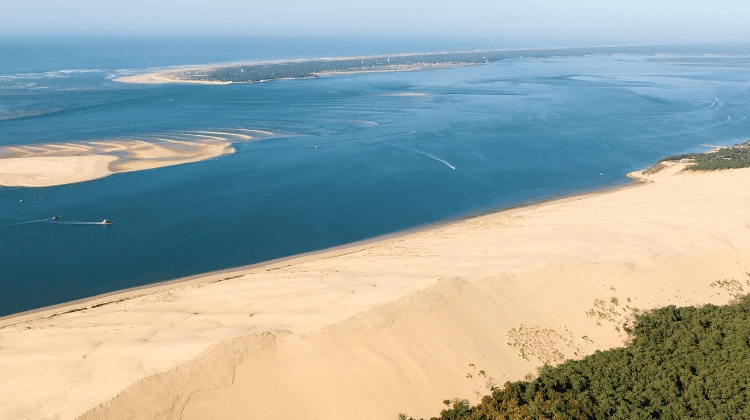
Occitanie (previously known as Languedoc) is one half of the south of France and is a region of huge contrast. A solid ten to eleven hour drive from Caen, Occitanie makes a good destination if you have three or four weeks to travel or, as part of a longer trip. We think it’s worth the drive time for the atmosphere, history and beauty you will find in this region.
From the sun drenched Herault of southern France and the Mediterranean coast to the wild and raw beauty of the Cevennes and the majesty of the Pyrenees, the landscape and climate differs greatly. This is a busy part of France, home to Carcassonne and its’ renovated La Cite, one of the largest castles in the world , Lourdes and the Pont du Gard. These three top the busiest tourist destinations in Europe list and are best visited outside of July and August.
RELATED POST: South of France Road Trip: Route, Highlights & Tips
- Hiking – the Pyrenees are a more compact and gentle mountain range than the Alps, with lots of easy to moderate hiking and fantastic motorhome wild camping . They are one of our happy places and you can even cross into Spain in your motorhome over the high mountain passes.
- Wild swimming – the gorges of the region have some of the best wild swimming and canyoning in France. Tucked into the Montagne Noire or the midi-Pyrenees, the water is crystal clear and refreshing.
- Outdoor adventures – head for the Gard and Lozere departments where you’ll find nature at its finest. Winding rivers are superb for kayaking and often have small river beaches and swimming holes with perfectly placed rocky ledges to jump from. The Cevennes National Park offers great hiking in a wild and natural environment.
- Religious history – The Aude and Ariege have a strong Cathar history and you can see remnants everywhere. Follow the Route of the Cathar’s through fortified hilltops, castles, villages and towns for a fascinating insight into a religion that shaped this part of France for centuries.
Recommended Reading
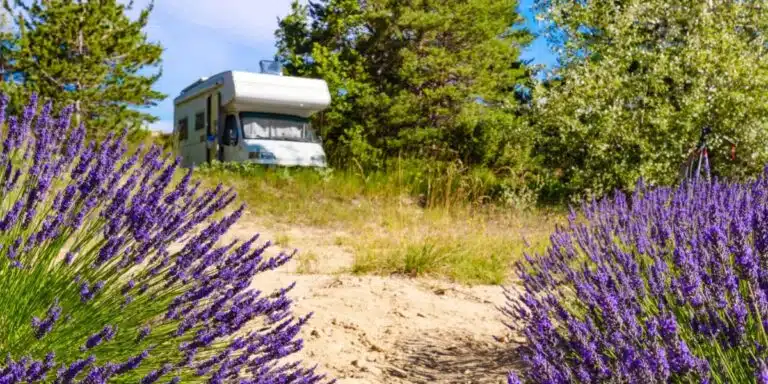
Motorhoming in France: Your Complete Touring Guide for 2024
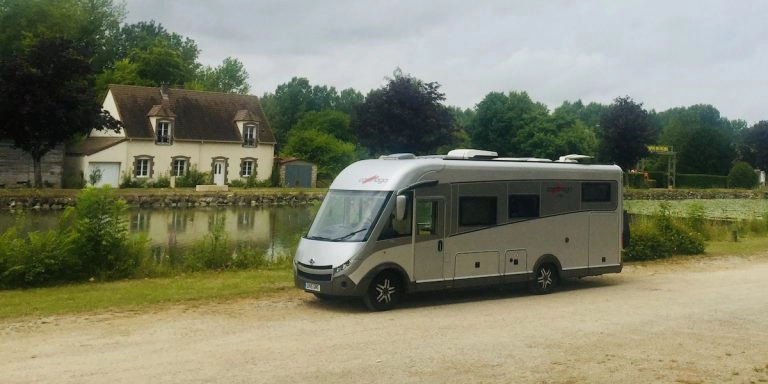
Wild Camping in France for Motorhomes – All You Need to Know
Pays de la loire.
The Pays de la Loire is a region of north-western France which adjoins the region of Centre-Val de Loire. Both regions share many characteristics including the Loire Valley and large numbers of famous chateaux.
One difference is the long Atlantic coastline of the Pays de la Loire known as the Vendee. A very popular UK tourist destination due to its proximity to the eastern channel ports, and enjoyed for its gentle waves, sandy beaches and quintessential sea-side resorts.
An easy three to four hours from Caen to Nantes places you the heart of this region, with the Loire Valley to the east and the beaches of the Vendee to the west.
- Bucket and spade holidays – perfect for family holidays as the Vendee is lined with some of the best French holiday parks offering fantastic facilities. Kids love the beaches for the perfect sand-castle building sand and gentle waves.
- Theme parks – the Puy du Fou historical theme park has over 1,5 million visitors a year and is one of the most popular attractions in the whole of France and perfect for a day out if you are travelling with kids.
- Escaping the crowds – yes, you can do that in one of the most popular regions of France! Head for Vallée du Loir , the lesser known cousin of the Loire Valley, and relax in an unspoilt and charming landscape of pretty villages, manor houses and fields of sunflowers.
- Seaside resorts – the picture-perfect resorts of les Sables d’Olonne, Saint Gilles Croix-de-Vie and St. Jean de Monts have lots of great restaurants, cafes and street markets in the summer months and are relaxed places to while away an afternoon or evening shopping for trinkets and souvenirs.
Provence-Alpes-Cote d’Azur
A favourite of many, us included, this region, often abbreviated to PACA, covers a large and diverse area. From the sparking Mediterranean Sea to the French Alps and from the river Rhone to the Italian border, Provence-Alpes-Cote d’Azur is the furthest from the UK, taking a whopping twelve to thirteen hours from Calais to Marseille. If you don’t fancy that but want to campervan in the south of France, fly to Marseille and rent one!
For the glamorous and fashionable resorts of the French Riviera, the lavender fields and whitewashed towns of Provence and the wilderness of the Camargue, those driving hours are so worth it. The sun baked landscapes, beautiful hilltop towns and villages and the abundant local produce and delicious wines just add to the attraction. If you’re looking for somewhere a little less visited , head for the fascinating village of Fontaine-de-Vauclause, source of the river Sorgue which rises deep underground, and nearby Cavaillon, for delicious Charentais melon , only found in Provence. You’ll also find some of the best motorhome campsites in France in this region.
- Glitz and glamour – St Tropez is one of the most famous French holidays. People flock there for its’ port where the rich and famous berth their mega-yachts and to enjoy the honeyed stone buildings and pretty squares of a slightly more relaxed and authentic St Tropez. If you want more, head to Monaco or Cannes or one of the ridiculously opulent villas which open their doors to the public. You’ll also find some of the best campervan sites in France in this area, giving you great access to the whole coast.
- Iconic Lavender – field upon field and row upon row of beautiful and fragrant lavender carpets Provence in June and July. Go early in the day for the best photo opportunities.
- Local produce – experience a marchés hebdomadaires ( farmers market). Most towns have a weekly market where you will find fresh bread, wonderful fruit and vegetables, pungent cheeses, meaty saucisson sausage, fat olives and pretty much any other fresh food stuff you might want to buy. Alternatively, head to the Menton lemon festival, where 120 tonnes of local citrus fruit is used to build floats and decorate buildings…who knew?
- Perfume – in addition to edible produce, Provence is a world renowned perfume producer. The most prestigious perfumeries are concentrated around the town of Grasse. All sell to the general public, and three prestigious maisons (houses) of Galimard, Fragonard and Molinard are also open to visitors.
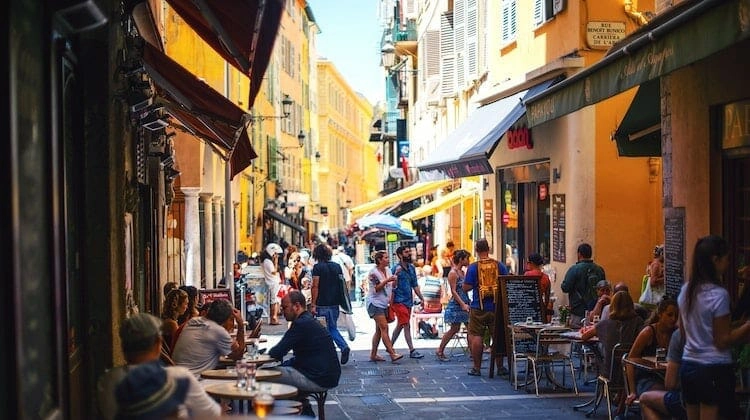
Are you looking for more France travel inspiration? check out these top posts…
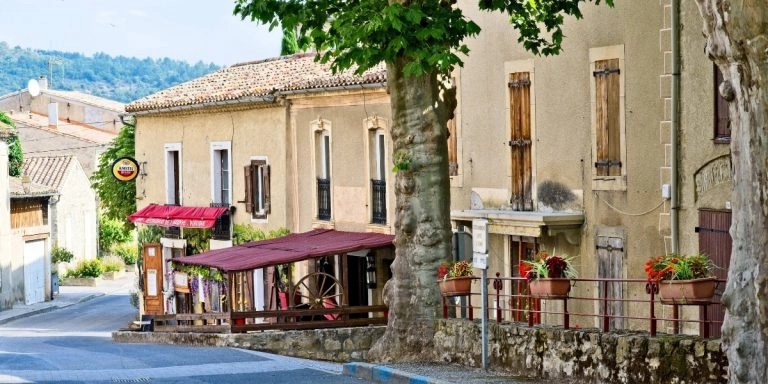
France Road Trip – 13 Amazing Itineraries
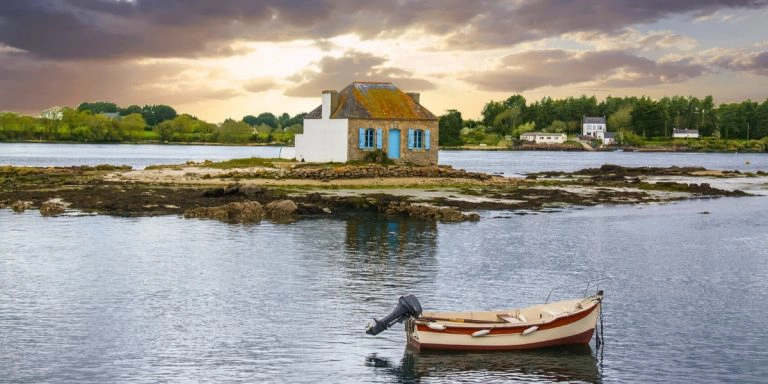
Off The Beaten Path France – 8 Unique Places
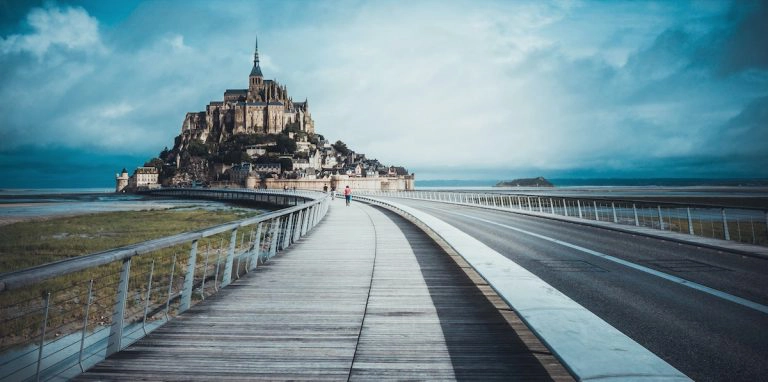
The Best Wild Swimming in France: 12 Most Beautiful Spots

La Bambouseraie: How to Visit the Hidden Gem in Anduze
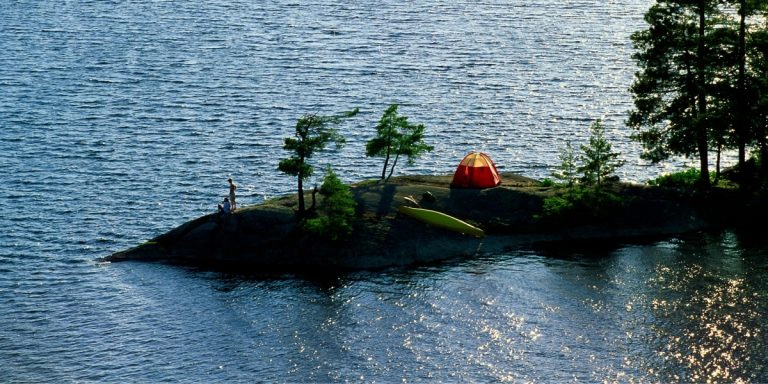
The Best Campsites in Europe – For Campers, By Campers
Love it pin it.
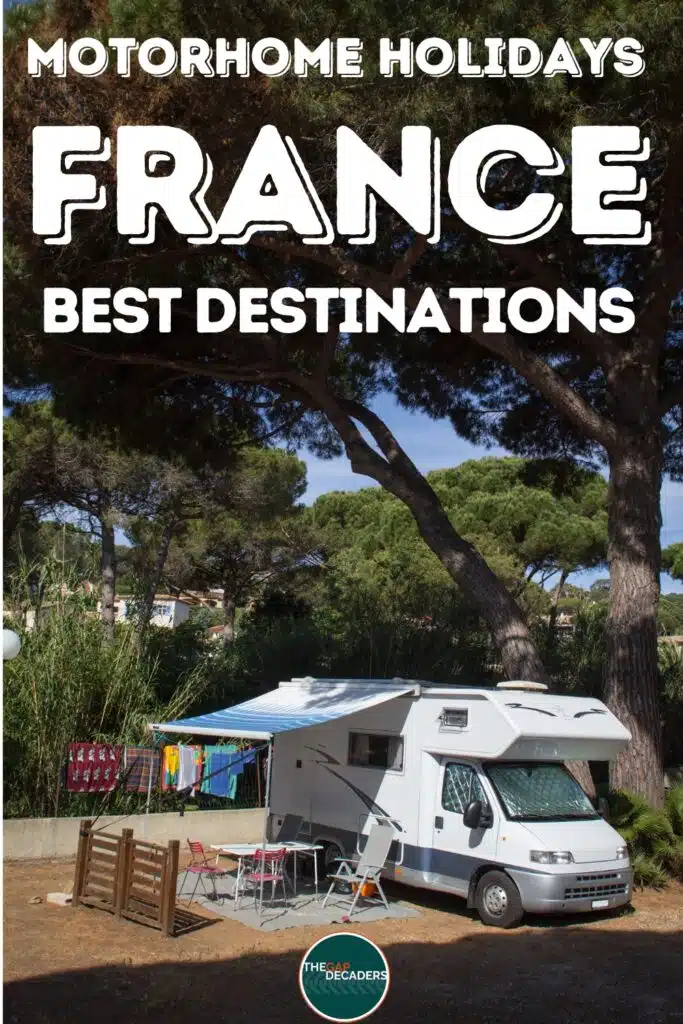
- Mar 26, 2023
- 12 min read
Taking Your Campervan To France: Your Ultimate Preparation Guide
Updated: Apr 26, 2023
If you're planning to take your campervan from the UK into France, there are several things you should do to prepare.

Here Are Some Important Steps You Can Take When Taking Your Campervan To France:
Check your vehicle's documentation: Make sure your campervan is registered and insured for travel in France. You may also need to carry a V5C logbook, a valid MOT certificate, and proof of insurance.
Check the driving requirements: In France, you'll need to drive on the right-hand side of the road, and you'll need to be over 18 years of age with a valid UK driving licence. You may also need an International Driving Permit (IDP) if you have a paper driving licence, although this is not always necessary.
Check your campervan's equipment: Ensure that your campervan has all the necessary equipment required for driving in France. This includes items like headlamp beam converters to adjust the headlights, a reflective warning triangle, a high visibility vest, and spare bulbs for your lights.
Check your campervan's emissions: France has strict emission standards, so check that your campervan meets the required standards. If you're unsure, you can check the vehicle emissions rating online.
Check the regulations for travelling with pets: If you're planning to travel with your pets, you'll need to ensure that they meet the entry requirements for France. This may include vaccinations, microchipping, and pet passports.
Plan your route: Familiarize yourself with the roads and routes you'll be taking in France. Consider using a GPS device or map to help you navigate.
The specific items you are legally required to have in your campervan may vary depending on your location and the type of vehicle you have. However, here are some common items that are often required or recommended by law:
Registration and insurance documents: You should always carry your campervan's registration and insurance documents with you when you're driving, this important for several reasons:
Proof of ownership: Your registration documents provide proof that you are the legal owner of the campervan. This can be important in case of any legal disputes or if your vehicle is stolen.
Compliance with the law: In many countries, it's a legal requirement to carry your registration documents when driving your campervan. Failure to do so can result in fines or other legal consequences.
Insurance coverage: Your insurance documents prove that you have the required level of insurance coverage for your campervan. This is important in case of any accidents or damage to your vehicle or other people's property.
Assistance in case of emergency: If you have an accident or breakdown, having your registration and insurance documents with you can help emergency services and other drivers to identify your campervan and its owner. This can speed up the process of getting you and your campervan the necessary assistance.
Driver's license: You need to take your driver's license with you when you're driving your campervan to prove that you're legally allowed to operate the vehicle. In many countries, including the UK, it's a legal requirement to carry a valid driver's license with you when you're driving.
Your driver's license serves as a form of identification, and it provides important information about you as a driver, including your name, address, date of birth, and the categories of vehicle you're licensed to drive.
If you're stopped by the police or involved in an accident, you may be asked to present your driver's license as proof that you're authorized to drive your campervan. Additionally, if you're renting a campervan, the rental company will typically require you to provide a valid driver's license before they will allow you to take possession of the vehicle.
Warning triangle: A warning triangle is a safety device that is designed to alert other road users of a potential hazard or obstruction on the road. It's a legal requirement in many countries to carry a warning triangle in your vehicle, including campervans.
If your campervan breaks down or you have an accident, placing a warning triangle behind your vehicle can help to warn other drivers of the hazard and give them time to slow down and take evasive action. This can help to prevent further accidents or collisions.
The exact regulations for warning triangles may vary by country, but generally, the triangle should be placed at a distance of at least 50 meters from your vehicle, in the direction of oncoming traffic. It should be visible from a distance and placed on a flat surface.
Carrying a warning triangle is an important safety measure to protect yourself and other road users in the event of an emergency on the road.
High visibility vest: You need to take a high visibility vest with you when driving in many countries, including many in Europe, because it is a legal requirement. The reason for this requirement is to increase the visibility of the driver and make them more noticeable to other drivers in the event of an accident or breakdown.
The high visibility vest, also known as a reflective vest, is designed to be worn over your normal clothing and is made of brightly coloured material with reflective strips. This makes it easier for other drivers to see you, particularly in low light conditions, such as at dawn, dusk or in the dark.
If you have to exit your campervan on the side of a road or a motorway, for example, due to a breakdown or an accident, you are required to wear the high visibility vest to increase your visibility and reduce the risk of being hit by passing vehicles.
It's important to note that in some countries, such as France, you may be fined if you don't carry and wear a high visibility vest when required. Therefore, it's essential to ensure that you have a high visibility vest in your campervan and that it is easily accessible when needed.
Spare bulbs and fuses: Taking spare bulbs and fuses in your campervan is recommended for a couple of reasons:
To ensure your safety: If one of your bulbs or fuses blows while you're driving, it can significantly impact your visibility on the road or cause an electrical system failure. By carrying spare bulbs and fuses, you can quickly and easily replace them and restore your visibility or electrical functions, which can help prevent accidents and ensure your safety.
To comply with the law: In some countries, it's a legal requirement to carry spare bulbs for your headlights, taillights, and indicators, and to replace any faulty bulbs as soon as possible. Fuses are also often required by law, and carrying spares can help you avoid potential fines for non-compliance.
Overall, carrying spare bulbs and fuses in your campervan is a simple and inexpensive way to ensure your safety and compliance with the law.
First aid kit: Taking a first aid kit with you when traveling in a campervan is a wise decision for several reasons. Here are some of the main reasons why a first aid kit is important:
Accidents and injuries: When you're on the road, accidents and injuries can happen. Having a first aid kit on hand can help you to quickly treat any minor injuries or illnesses that may occur.
Remote locations: When traveling in a campervan, you may find yourself in remote locations where medical assistance may not be readily available. In such situations, a well-stocked first aid kit can help you to manage any injuries or illnesses until you can reach proper medical help.
Quick response: In an emergency, a first aid kit can provide you with the tools and supplies you need to respond quickly and effectively. This can be especially important when dealing with injuries that require immediate attention, such as bleeding or burns.
Personal health conditions: If you or anyone traveling with you has a pre-existing medical condition, having a first aid kit on hand can help you to manage any symptoms or emergencies that may arise.
Overall, a first aid kit is an essential item to have in your campervan, as it can help you to quickly and effectively respond to any medical emergencies or injuries that may occur while on the road.
Fire extinguisher: Taking a fire extinguisher in your campervan is recommended for safety reasons. If a fire breaks out in your campervan, having a fire extinguisher readily available can help you to quickly extinguish the fire and prevent it from spreading. This can be particularly important when camping in remote areas where emergency services may take longer to arrive.
Campervans contain various flammable materials, such as fuel, gas, and electrical components, which can be a fire hazard if they're not used or maintained correctly. A fire can start accidentally due to a malfunctioning appliance, electrical wiring issues, or other causes. Having a fire extinguisher on board can help you to quickly respond to a fire and prevent significant damage or injury.
In some countries, taking a fire extinguisher in your campervan may be a legal requirement. Therefore, it's essential to check the specific regulations for the countries you'll be traveling through and ensure you have the necessary safety equipment on board.
Headlamp beam deflectors: Headlamp beam deflectors , also known as headlamp converters, are required for UK drivers traveling on the continent because they ensure that your headlights don't dazzle other drivers.
In the UK, cars are designed with headlights that are angled to illuminate the left side of the road. However, in countries that drive on the right-hand side of the road, this means that the headlights will be angled in a way that can dazzle oncoming drivers.
To prevent this, headlamp beam deflectors are required to adjust the angle of the headlights so that they point downward and to the left. This ensures that they won't dazzle oncoming drivers and helps to ensure that you can see the road ahead clearly while driving on the continent.
Failing to use headlamp beam deflectors when required can result in a fine or penalty, so it's important to make sure you have them installed and adjusted properly before driving in a country where they are required.
Breathalyser: In some countries, including France, it is a legal requirement to carry a breathalyser in your vehicle. The purpose of this requirement is to encourage responsible driving and to reduce the number of alcohol-related accidents on the roads.
The Breathalyser is used to measure the alcohol level in your breath, and can help you to determine whether you are safe to drive. If you have consumed alcohol and are found to have a blood alcohol concentration (BAC) above the legal limit, you may face fines, penalties, or even criminal charges.
Carrying a breathalyser in your campervan is important because it allows you to test your BAC before you get behind the wheel. This can help you to make responsible decisions about whether or not to drive, and can help to prevent accidents and keep you and others safe on the road.
It's worth noting that while carrying a breathalyser is a legal requirement in some countries, it is always important to exercise caution and avoid driving if you have consumed alcohol. Even if your BAC is below the legal limit, you may still be impaired and at a higher risk of causing an accident.
Tips For Driving On The Right-Hand Side Of The Road:
Driving on the right-hand side of the road can be a new and challenging experience if you're used to driving on the left. Here are some tips to help you adjust to driving on the right-hand side of the road:
Familiarise yourself with the traffic rules and signs: Take time to study the traffic rules and signs of the country you're driving in, as they may differ from what you're used to.
Practice in a safe environment: If possible, practice driving on the right-hand side of the road in a quiet and safe area before you head out onto busy roads.
Position yourself correctly: Make sure you're positioned correctly in the lane when driving. Drive in the right-hand lane, and position your vehicle closer to the right-hand side of the lane.
Stay alert and focused: Pay extra attention to your driving and be aware of your surroundings. Keep your eyes on the road and avoid distractions.
Use your mirrors and indicators: Use your mirrors and indicators to communicate with other drivers and ensure that you're aware of your surroundings.
Take it slow: Take your time and drive at a slower speed than usual, especially when you're first adjusting to driving on the right-hand side of the road.
Get a GPS or navigation system: A GPS or navigation system can help you navigate unfamiliar roads and ensure that you stay on the correct side of the road.
Have a passenger act as a co-pilot: If possible, have a passenger sit in the front seat and act as a co-pilot to help you stay focused and alert.
By following these tips and taking your time, you can adjust to driving on the right-hand side of the road and enjoy your travels safely.
Options For Crossing The Channel With Your Campervan:
There are a few ways to get from the UK to France in a campervan, depending on your preference and budget. Here are some of the most popular ways:
Using a ferry with a campervan is relatively straightforward, but there are some things you should keep in mind to ensure a smooth and stress-free experience. Here are the steps to take when using a ferry with a campervan:
Book your ferry tickets in advance: It's recommended to book your ferry tickets in advance, especially during peak travel times. You can book your tickets online or by phone.
Check the ferry's height and weight restrictions: Before you book your tickets, make sure to check the ferry's height and weight restrictions to ensure that your campervan is allowed on board.
Arrive at the port early: Arrive at the port at least 90 minutes before your scheduled departure time to allow enough time for check-in and boarding.
Follow the signage and instructions: Follow the signage and instructions given by the port staff to board the ferry. In most cases, you'll be directed to a lane specifically for campervans and other larger vehicles.
Secure your campervan: Once on board, park your campervan in the designated area and make sure to apply the handbrake and turn off the engine. It's also a good idea to secure any loose items inside your campervan to prevent damage during the journey.
Enjoy the journey: Once you're on board, you can relax and enjoy the journey. Most ferries have restaurants, shops, and other facilities to keep you entertained during the journey.
Prepare to disembark: As the ferry approaches the port, follow the instructions given by the crew to disembark. Be sure to turn on your engine and prepare to drive off the ferry.
By following these steps and being prepared, you can use a ferry with your campervan and enjoy a hassle-free journey across the sea.
Eurotunnel:
Using the Eurotunnel with a campervan is relatively straightforward. Here are the steps to follow:
Book your Eurotunnel journey: You can book your Eurotunnel journey online or over the phone. Make sure to select the "campervan" option when booking.
Arrive at the Eurotunnel terminal: Arrive at the Eurotunnel terminal at least 45 minutes before your scheduled departure time.
Check in: Follow the signs to the check-in area and present your booking confirmation to the staff. They will provide you with a ticket and direct you to the correct boarding lane.
Board the train: Follow the instructions of the staff and board the train when directed. Make sure to park your campervan in the designated area.
Travel through the Channel Tunnel: The journey through the Channel Tunnel takes approximately 35 minutes. During this time, you must remain in your campervan.
Disembark the train: Follow the instructions of the staff and disembark the train when directed. You will then exit the terminal and proceed to your destination in France.
It's important to note that your campervan must comply with the Eurotunnel's size and weight restrictions. The maximum height for campervans is 4.2m, and the maximum length is 18.75m. You will also need to ensure that your campervan is fitted with headlamp beam deflectors if you're driving in France.
By following these steps and complying with the Eurotunnel's regulations, you can use the Eurotunnel with your campervan and enjoy a convenient and efficient journey from the UK to France.
If you prefer to fly, you can book a fly-drive holiday that includes a rental campervan in France. Many major airports in the UK have flights to French cities such as Paris, Nice, and Lyon.
Some Final Tips:
Driving a campervan around France for the first time can be an exciting adventure, but it's important to take some precautions to ensure your safety and enjoyment. Here are some precautions to consider:
Familiarise yourself with the rules of the road: The rules of the road in France may differ from those in your home country. Make sure to familiarize yourself with French road rules, including speed limits, road signs, and regulations for driving a campervan.
Plan your route: Before setting out, plan your route in advance and use a GPS or navigation system to ensure that you stay on the right track. Avoid busy city centres during peak traffic hours, and stick to well-lit roads whenever possible.
Take your time: Driving a campervan in a new country can be stressful, so take your time and drive at a comfortable pace. Avoid rushing or making sudden turns, and be patient with other drivers on the road.
Be aware of your surroundings: Stay alert and aware of your surroundings at all times. Keep an eye out for other vehicles, cyclists, and pedestrians, and be prepared to make sudden stops if necessary.
Park in designated areas: When parking your campervan, make sure to use designated parking areas and avoid parking on the side of the road or in unauthorized areas.
Keep your documents handy: Make sure to keep your driver's license, vehicle registration, and insurance documents handy at all times, in case you're stopped by the police.
Consider taking a driving course: If you're feeling unsure about driving a campervan in France, consider taking a driving course to help you feel more confident and prepared.
By following these precautions and taking your time, you can enjoy a safe and enjoyable experience driving your campervan around France.

In conclusion:
Van life in France can be an incredible experience, offering a sense of freedom and adventure that's hard to match. Whether you're driving your campervan through the French countryside or exploring the bustling streets of Paris, there's no shortage of sights and experiences to be had. However, it's important to take the necessary precautions to ensure your safety and enjoyment while on the road. By familiarizing yourself with French road rules, planning your route in advance, taking your time, and staying aware of your surroundings, you can make the most of your van life experience in France. So pack your bags, hit the road, and get ready for an unforgettable adventure! And remember, for more tips and information on van life, check out our other articles on this topic.
Recent Posts
Navigating Campervan Insurance in the UK: Why Comparison is Key
Unplug and Unwind: The Importance of A Digital Detox While Living Van Life in the UK
Riding the Waves: A Van Life Guide to UK Surf Spots
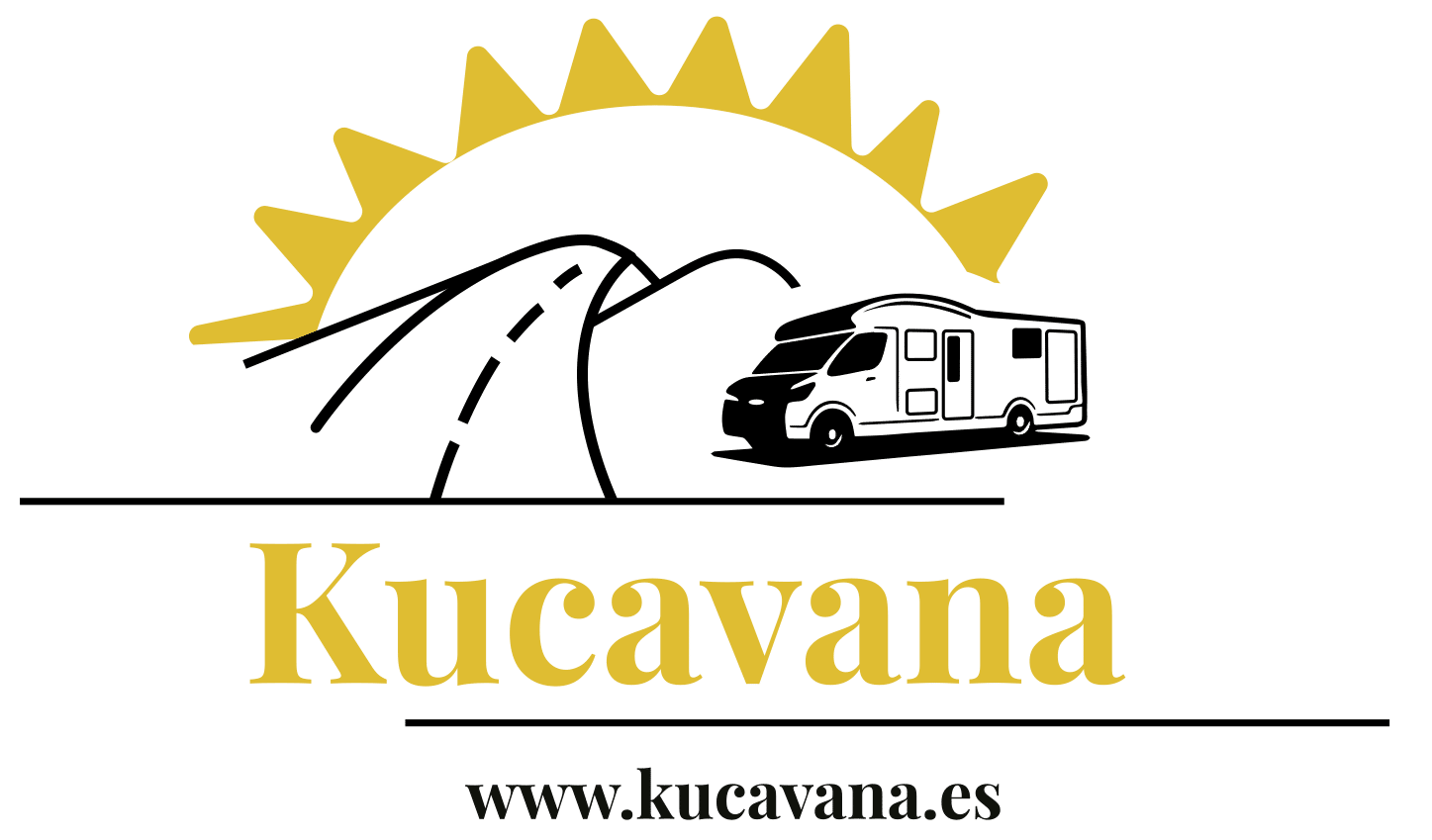
France by motorhome: Guide + 21 essential routes
Table of Contents
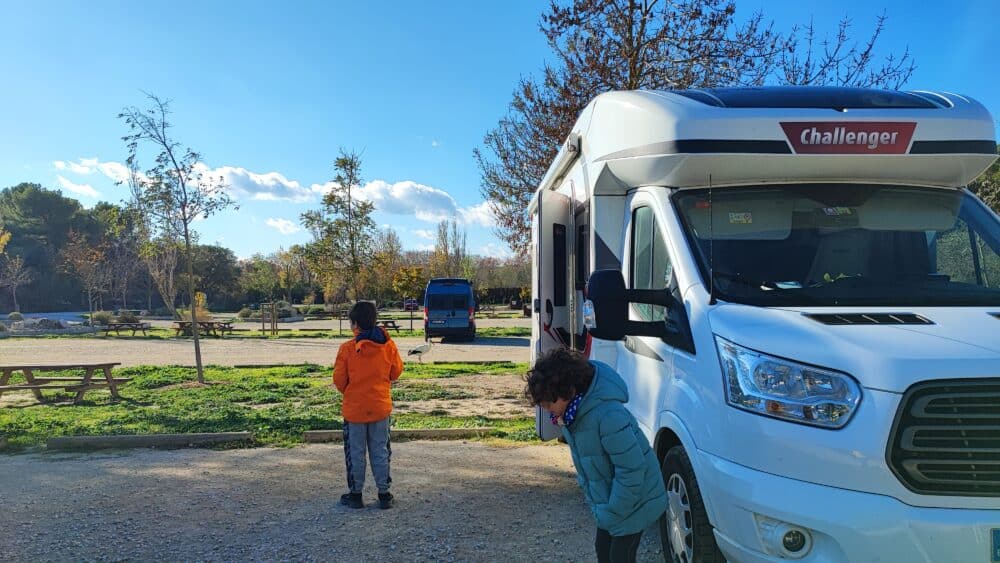
Guide to France by motorhome or camper
Discover quintessential camper country , the most motorhome-friendly country in Europe. And find out with this travel guide to France by motorhome that we have prepared from our own experience of our many motorhome trips through France.
Here you can find r everything you need to know to travel by motorhome to France. Regulations on parking, spending the night and camping in a motorhome or camper, recommended places to spend the night, tips and tricks.
Additionally, in this guide we show you the 21 motorhome routes through France or in a campervan essential that will help you decide your next trip to France in a motorhome or camper. 21 routes that we have done and we tell you about our own experience.
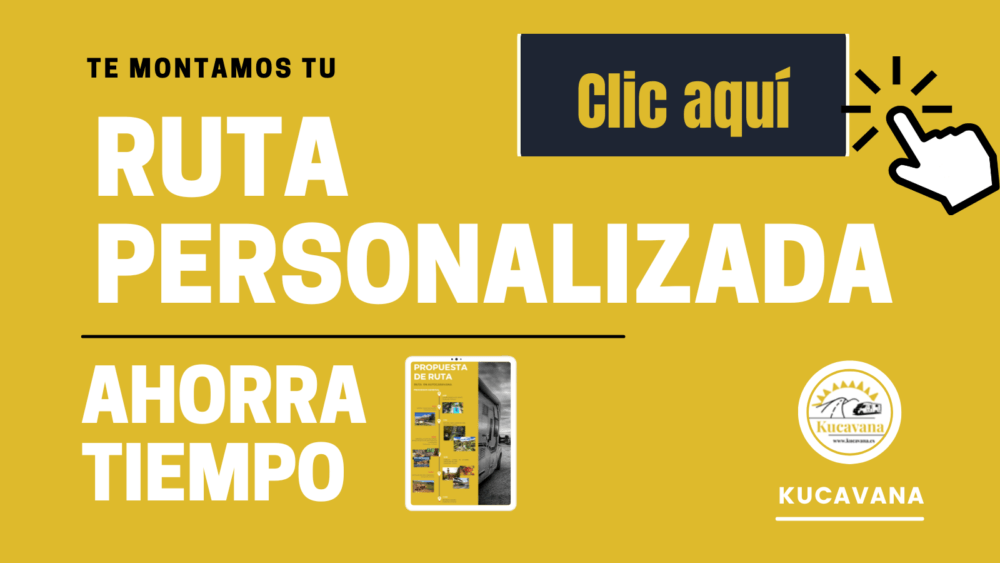
The first tip before starting
A tip: Don't travel without travel insurance . Avoid medical co-payments, have a lawyer who specializes in what may happen to you during the trip and avoid bad times due to cancellations or incidents on your route. The travel insurance that so far convinces us most for traveling as a family is Iati Family, Coverage price is ideal for traveling both in Spain, Europe and outside of it. It covers everything on your trip, not just medical topics essentials with a doctor and pediatrician 24 hours a day through the chat of your App . I leave you here a discount that they will give you at the end of requesting the quote.
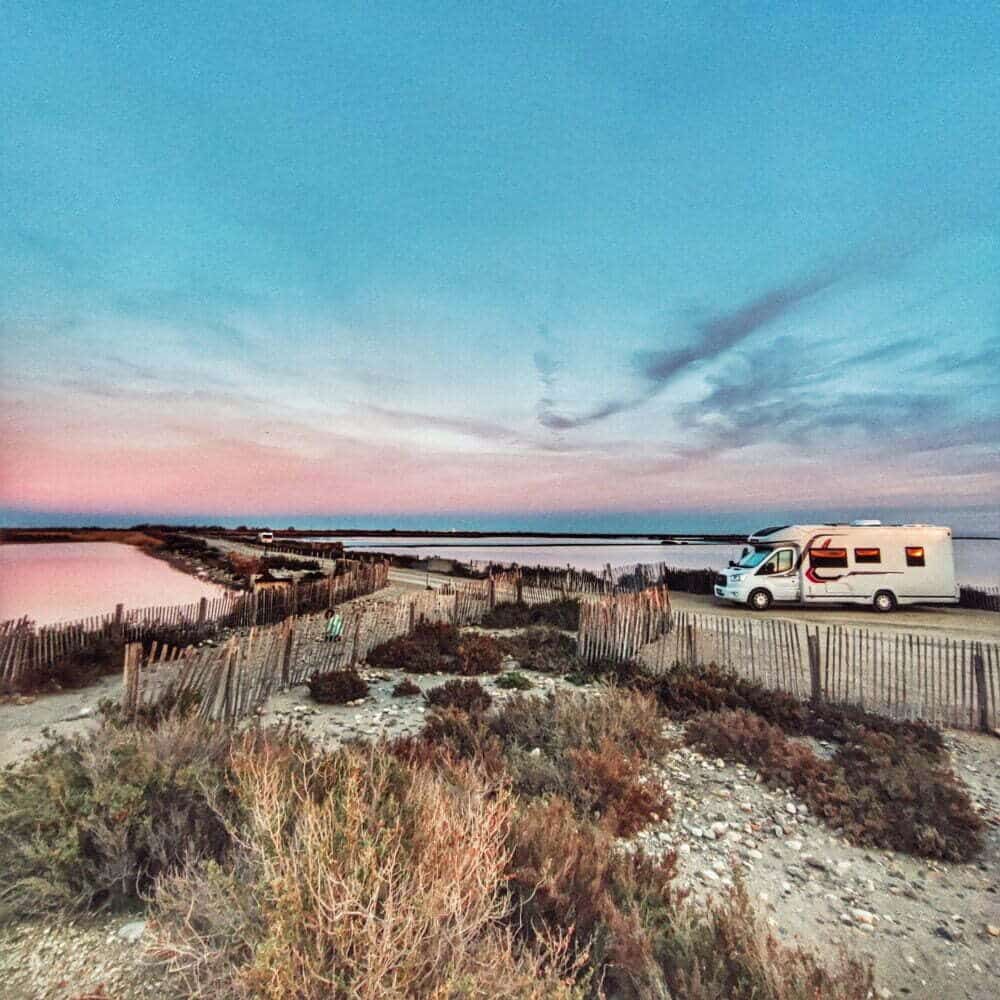
Basic guide to France by motorhome
Welcome to the adventure of exploring France by motorhome !
This basic guide is designed for those intrepid travelers who want discover the cultural wealth, exquisite gastronomy and impressive landscapes of this beautiful country on wheels.
From the lovely medieval villages to endless vineyards , France offers a unique experience for motorhome travel lovers. Join us on this exciting journey as we unravel the secrets of life on wheels in the land of elegance, history and good food.
Get ready for an unforgettable journey on French roads!
Prepare your trip to France by motorhome or camper
Mandatory chains or winter tires for your motorhome or camper if you go in winter.
You should know that between November 1 to March 31 in 48 departments of France, including those bordering Spain, it is It is mandatory to carry chains (at least for the two drive wheels) or winter tires.
If you want to see an article about what chains and / or winter tires are better for motorhomes, here We leave you an article that we talk about from our experience in our motorhome.
Finally I leave you here, an article on recommendations of what you should never do in the snow in a motorhome. and a video summary of the problems and solutions that you may encounter traveling in a motorhome in snowy places.

Documentation that you must bring for your trip to France by motorhome
To go to France, you must have the valid DNIs or passports of adults and also children as identification documentation.
On the other hand for medical issues you must take the European sanitary card in force, although you should know that in France there is medical copayment for foreigners in most things. For this reason, and due to various experiences of colleagues, we decided to always carry a travel insurance that for the cost it has we are safe and calm. We always take out the Iati Family or Getaway insurance, which is designed for traveling as a family in a motorhome or camper, which apart from the medical insurance even includes accident insurance for the pets you travel with or even a small theft insurance for the interior of the property. mobile home. For the price it is really worth it. Without obligation we leave you here a discount of 5% of the insurance What we tell you in case you want to request a quote to have the best price.
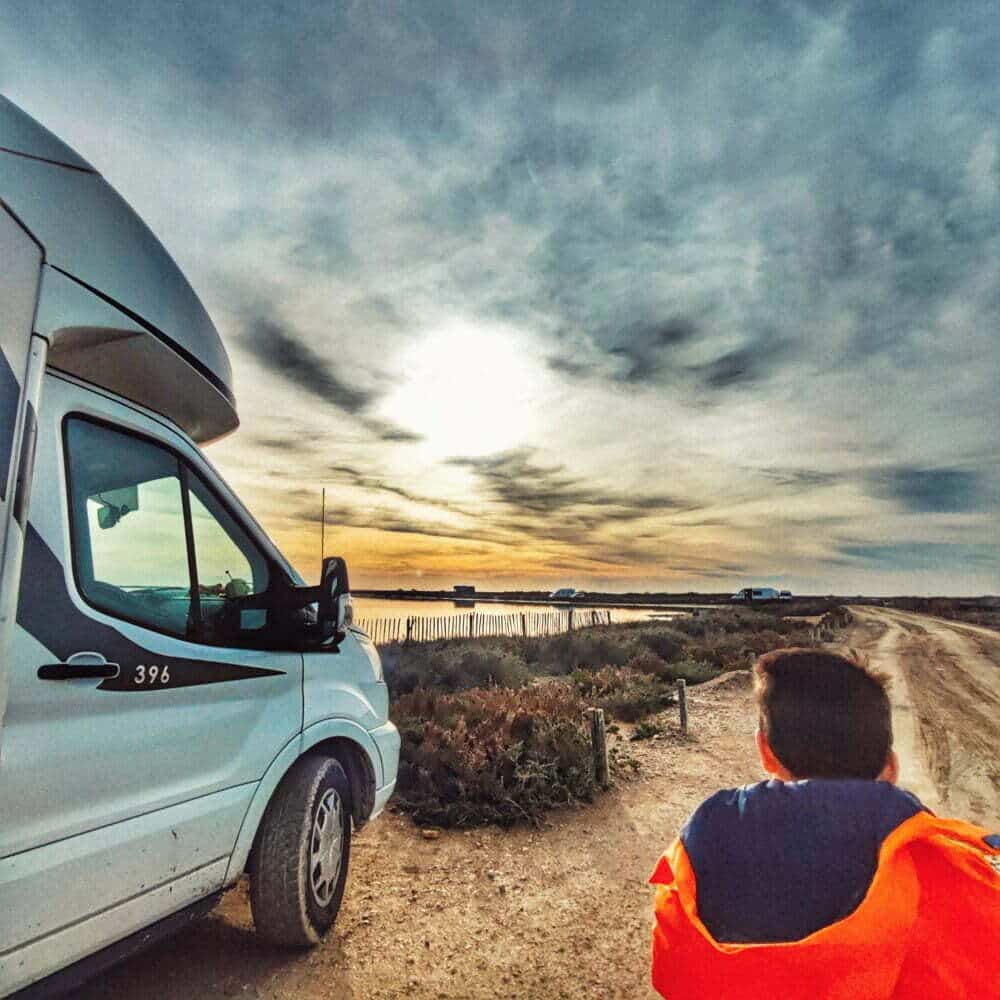
We set up your motorhome route in a personalized way, a route that you will do: Click & Go!
If you would like to save time, setbacks, fines and trust our experience In the camper and motorhome world, we remind you that we have a assembly and organization of personalized route in motorhome of which many people are more than happy.
With our service you will have a fully interactive Click & Go So that just click and the GPS will take you to each of the essential places without losing in setbacks and spending the night in the better places possible. Access the service so that we can send you your budget by filling in the following form.
Regulations on parking, overnight stays and camping in a motorhome in France
Traveling through France in a motorhome is very easy. Without a doubt, the motorhome routes through France are among the best in Europe and being camper friendly, France makes it easy for you. Now I'll detail why.
Regulations on parking and spending the night in a motorhome in France freely
The regulations in France regulate that You can park and spend the night anywhere a vehicle can, as long as don't camp (leave the perimeter of your vehicle, that is, take out tables, chairs, etc.).
It is exactly the same as in Spain, although with particularities, which we will see later. This is the general rule, you can park and spend the night without a problem if there is no explicit prohibition.
Regulations on camping in a motorhome in France
Camping in France is meticulously regulated in various ways depending on the region and site.
Now as a general rule Free camping (taking out table chairs, opening windows, awning...) throughout France is prohibited in these places with close surveillance:
- In natural parks or protected environmental areas
- In the streets and public roads
- Less than 500 meters from a tourist attraction
- On private farms without permission
Outside of these sites, we must look at each case about the region we are in and place, a normative tidal wave. .
But as a general rule, outside of the sites mentioned above, if there is no prohibition, we could take out our awning, table and chair to eat without problem. Although if you look closely, few places are outside of them. Another important thing to know is that the French motorhome culture is of great respect and education , which makes it impossible for anyone to leave their table and chair and awning anywhere all day. And if it They do it, they do it only at the time of using it and then they collect everything quickly. You must always do this as well, so that free camping is still tolerated in France outside of the sites we have mentioned above.
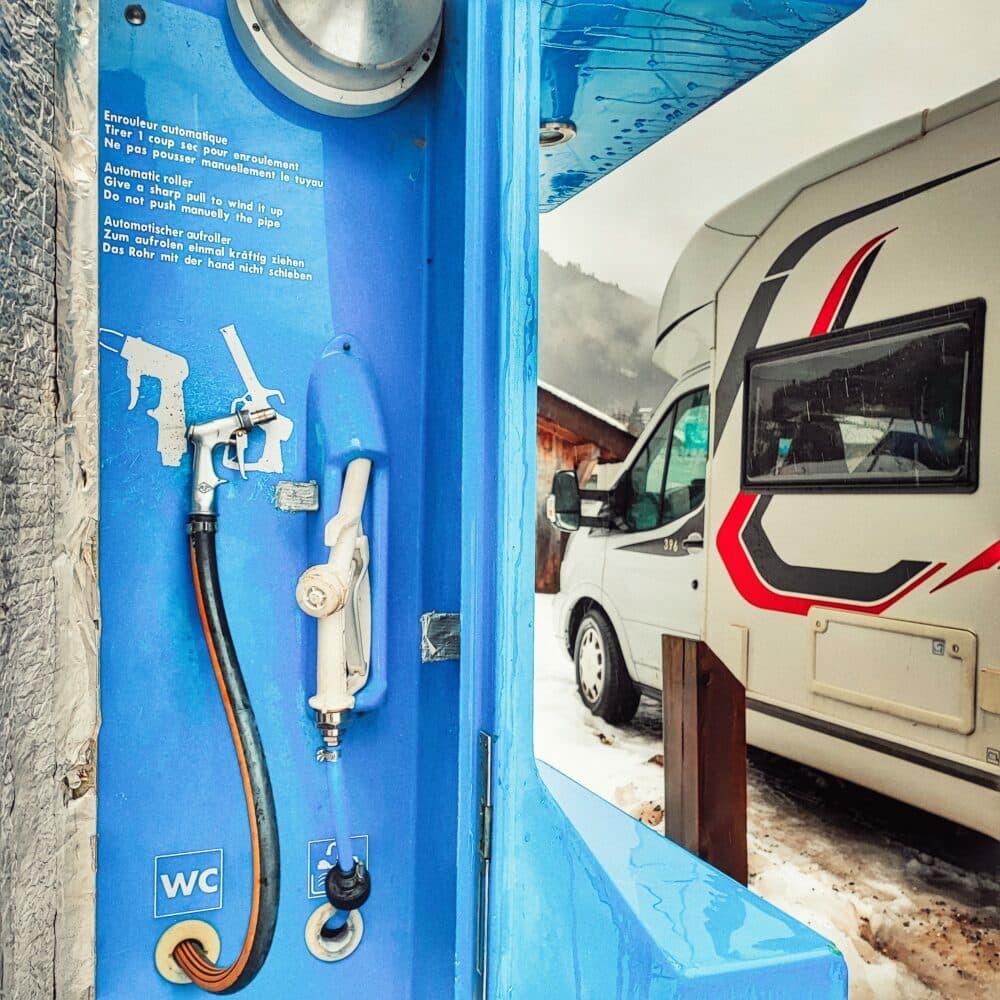
Motorhome services and areas in France
France by motorhome is very easy since has the largest network of motorhome areas in Europe with more than 6000 motorhome areas . Motorhome areas with all the services of emptying and filling with water and many with electricity.
Most of the overnight areas for motorhomes or campers are municipal and free or at very low prices, less than € 10 for 24 hours.
In practically all points of interest or tourist towns you will find a motorhome area, and generally always central or well connected to the center of the towns.
The French have a PhD in camping and caravanning and it shows.
In addition to these motorhome areas, we find a network of overnight areas in very important farms and vineyards where they allow to spend the night and camp in exchange for the purchase of km0, this network is what makes France Passion.
Farms as places to sleep, camp and do services in France
Many farms in France, have spaces enabled for motorhomes in France . You just have to search for them on Google Maps to find some of the best ones.
Here is an example of a farm that we stop at every time we pass through the central east of France:

In general, the roads They are very good in France. The national roads usually have a shoulder and are usually good, although depending on the area you will find many changes in grade, curves and a lot of two-way traffic.
The Highways are excellent, but on the other hand the prices are abusive. In some sections there are highways, however they are minimal.
Finally, you should know that between November 1 to March 31 in 48 departments of France, including those bordering Spain, it is mandatory to carry chains (at least for the two driving wheels) or winter tires.
Buy what is necessary and useful for this trip by motorhome or camper: list of 50 useful things that we carry in our motorhome
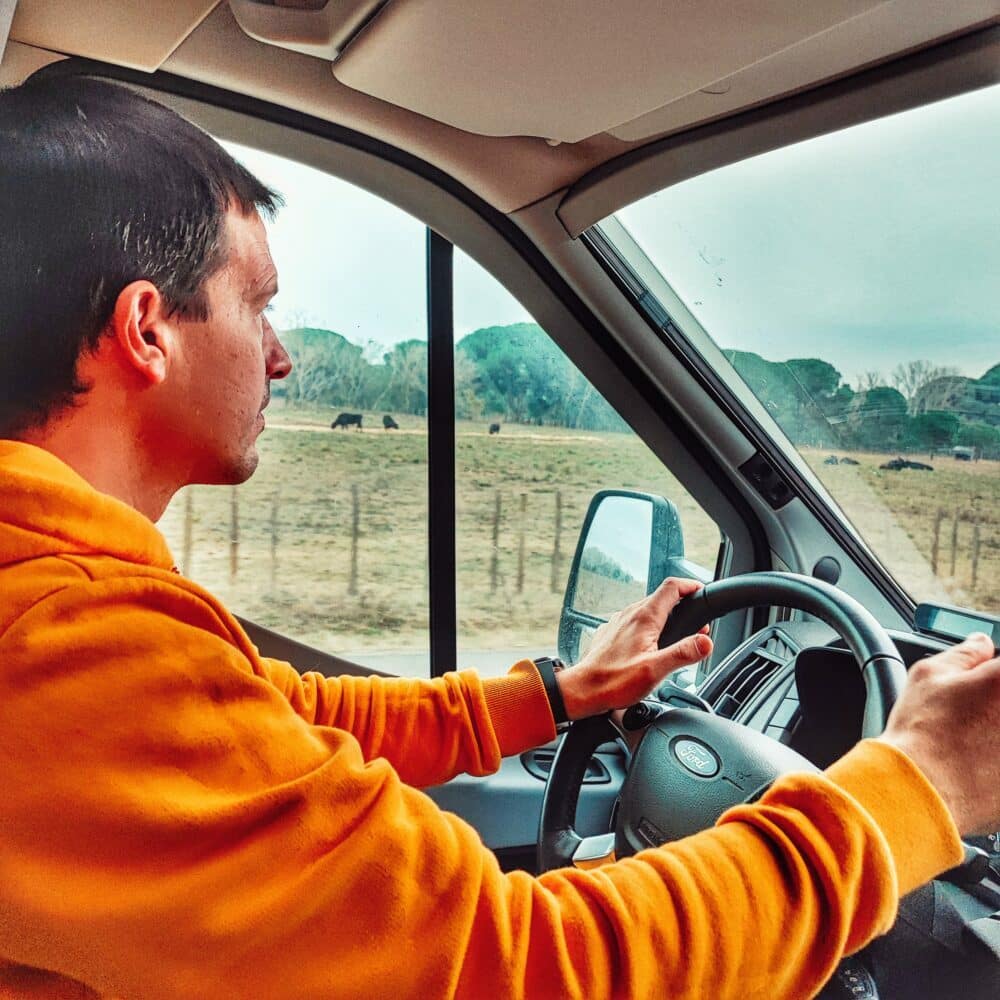
21 routes and trips in France by motorhome or camper to inspire you
Discover different routes through France by motorhome. Routes through France in a motorhome to the different regions and departments of this great camper-friendly country, where traveling in a motorhome will be easy and you will enjoy great natural and cultural paradises.
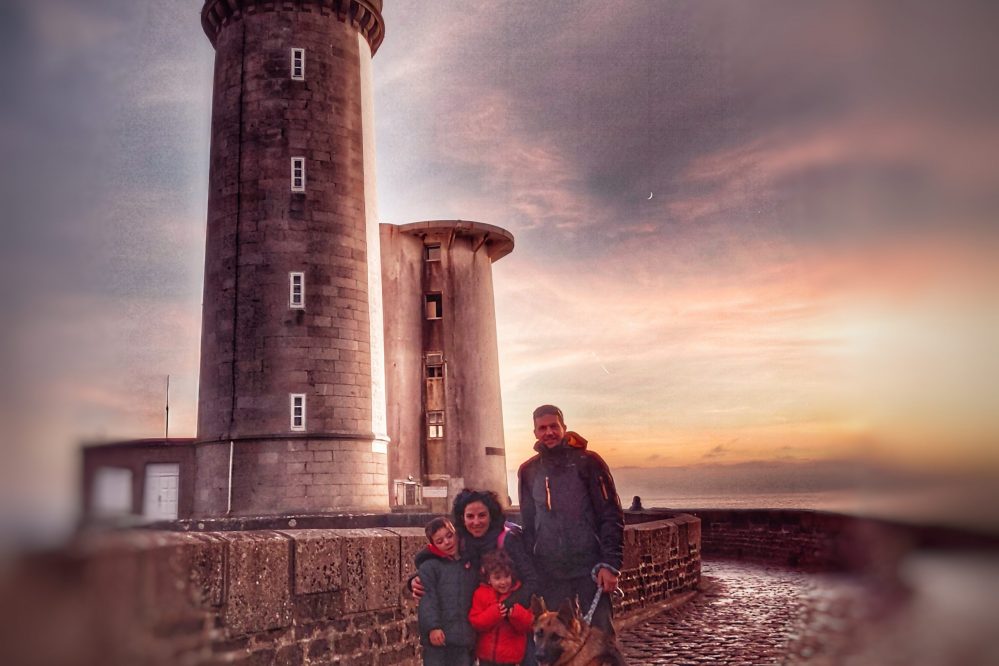
1. The magical French Brittany
Enjoy one of the most magical places in France in a motorhome. In the French Brittany in a motorhome You will discover an incredible coast and nature, full of mysteries, impressive lighthouses, menhirs and incredible prehistoric sites such as Carnac, a World Heritage Site.
Also, if you go to French Brittany, make a note visit Vannes, make a musical tour of the hobbit cottage village of Meneham and since you will be next visit the impressive Abbey of Mont Saint Michell, a World Heritage Site , which you must also reserve in advance so as not to be left without a ticket or wait in eternal queues.

2. Tarn et Garonne by motorhome
The French department of Tarn et Garonne by motorhome You will love it if you are looking for a quiet place, without crowds but with a lot of charm.
Located in the Occitanie region, it is a hidden treasure that captivates those seeking an authentic experience in the heart of France. With a rich history, picturesque landscapes and charming rural life filled with medieval villages, Tarn et Garonne offers a peaceful and enriching getaway.
In short, Tarn et Garonne is a destination that invites exploration, where natural beauty, history and culture converge to offer an authentic and enriching experience to those who venture to discover its charms.
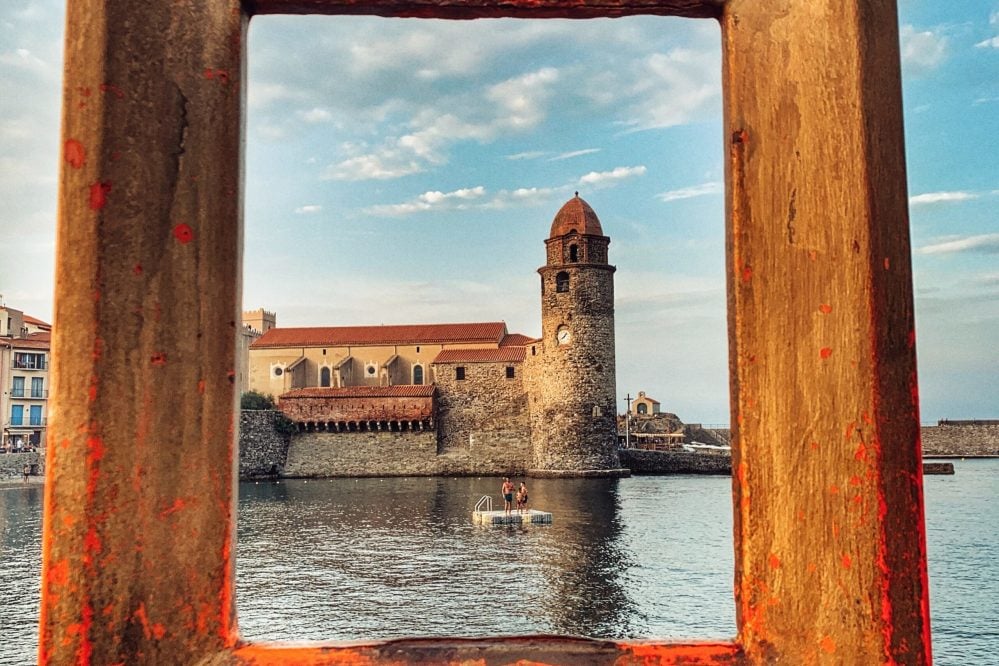
3. Picturesque towns on the Red Coast by motorhome
La Costa Roja in motorhome It is an ideal complement to a route through Cap de Creus. A trip through picturesque and charming fishing villages along the Catalan Costa Brava
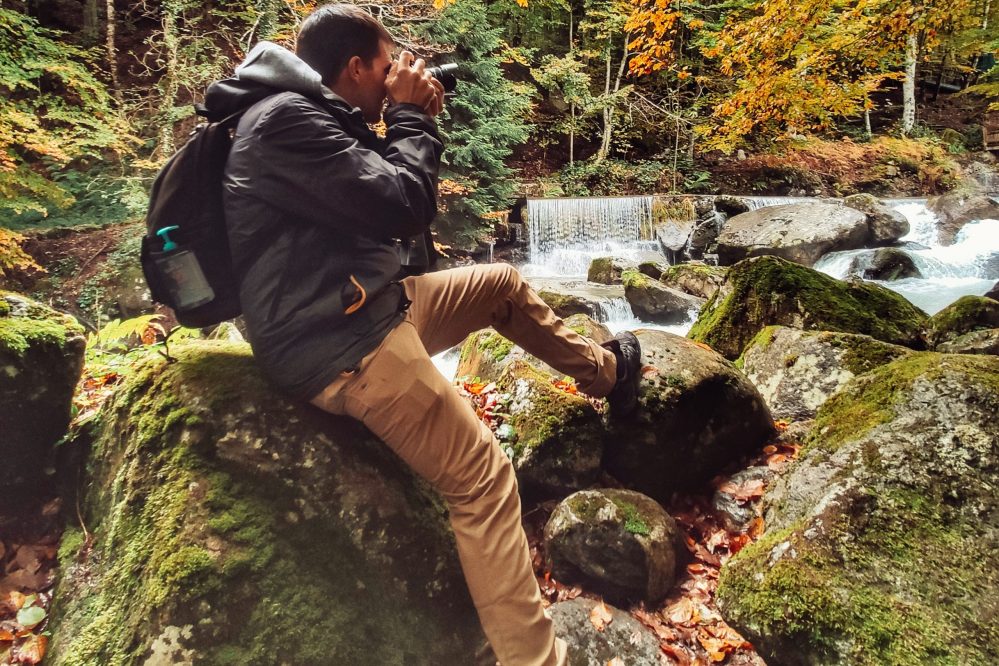
4. The Ariège in the heart of the Pyrenees
In the heart of the French Pyrenees, touching Andorra, we find a route that you should not miss because of the Ariege in motorhome . Nature, peace, hot springs and ski resorts await you.
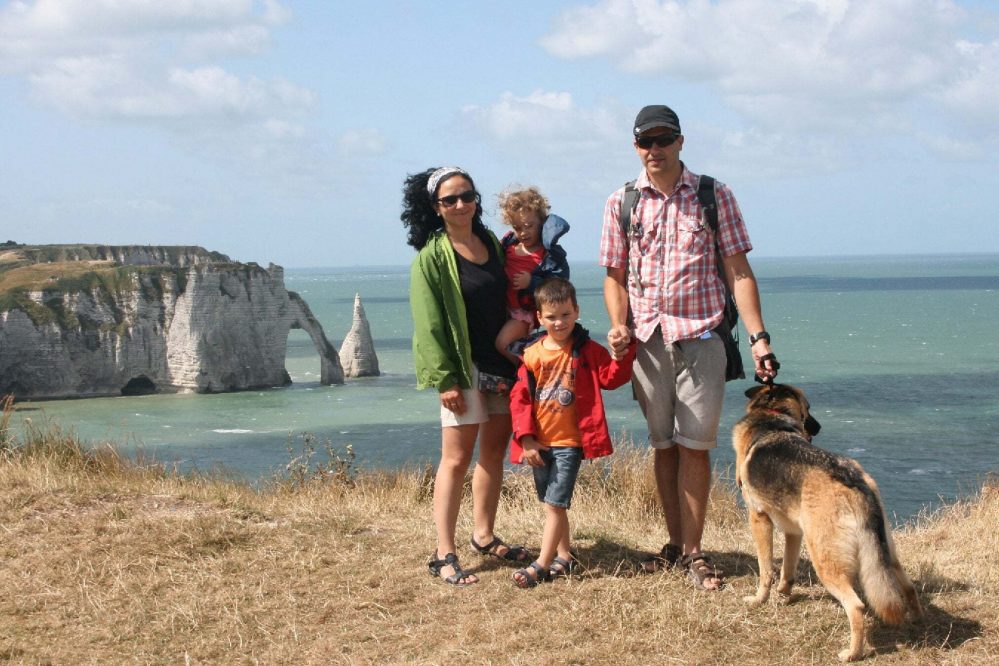
5. Normandy between cliffs and traces of war
Normandy by motorhome It is one of those trips that leave no one indifferent. Between contrary feelings, a trip takes place that every motorhome driver must do.

6. From castle to castle along the Loire
Discover a route where fairy tales, princesses and princes will accompany you at all times. visit the Castles of the Loire in a motorhome accompanied by our bicycles is one of the most dreamed routes.
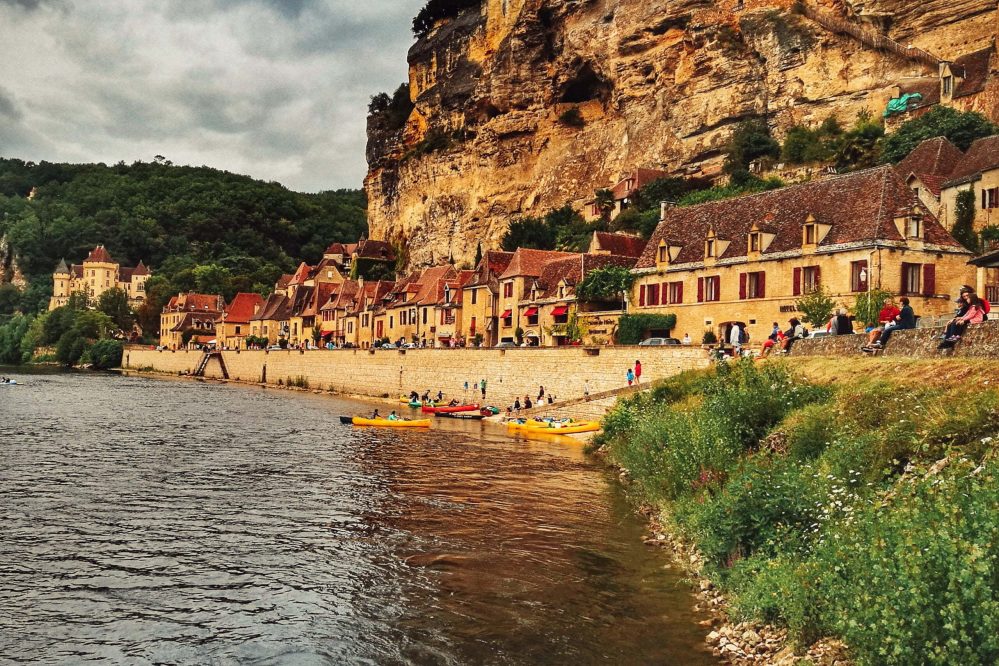
7. Singular places in the Perigord and the Dordogne
On a trip through the Perigord by motorhome and through the Dordogne by motorhome you can discover the most beautiful villages in France, unusual farms, caves and prehistoric archaeological sites and much more!
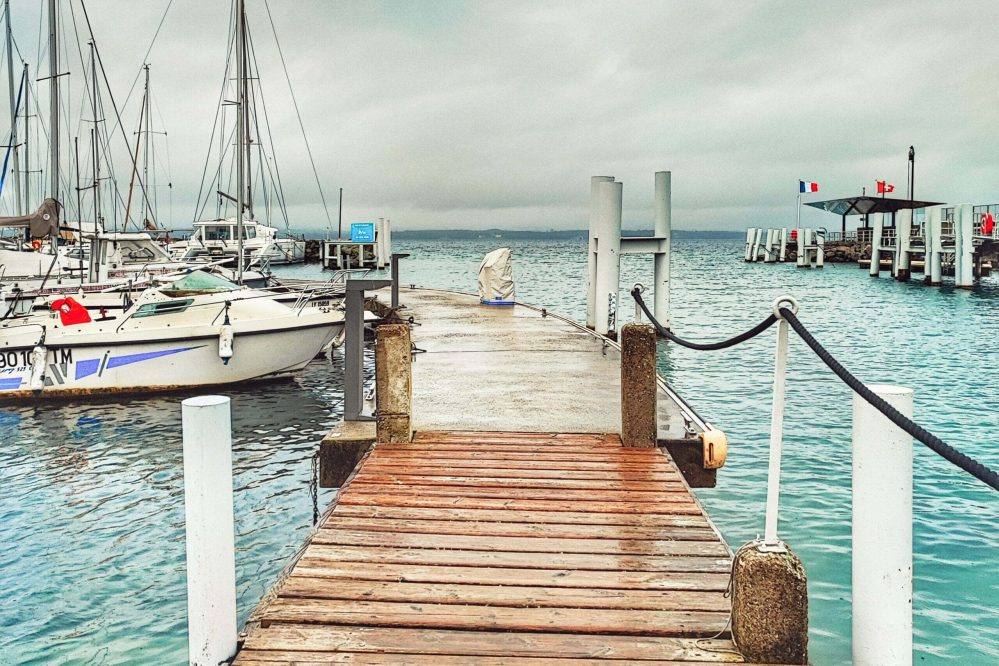
8. Lake and mountain in the French Lac Leman
Near the border with Switzerland we find this destination, within one of the largest lakes in Europe. Discover the shores of Lake Geneva by motorhome , a territory in France full of beautiful villages, where the great mountains of the Alps rise a few kilometers away. A territory that will surprise you!
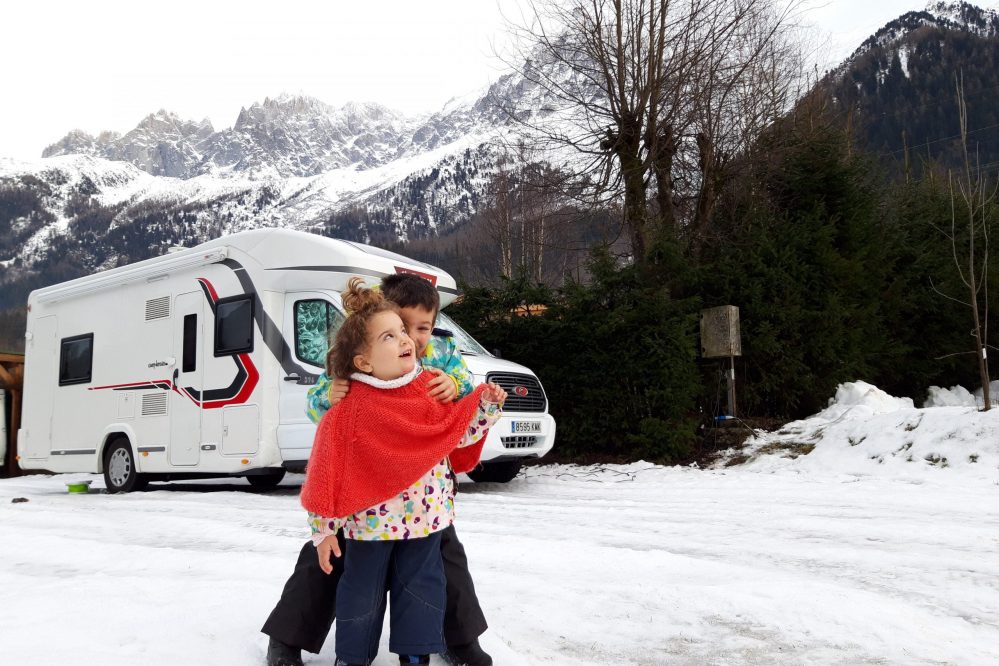
9. The French Alps
Whether to ski in winter or to enjoy its trails and landscapes in summer, the French Alps by motorhome They are always a good destination. And on this route you must never forget the precious Annecy in motorhome , french venice.

10. Disneyland in a motorhome a MUST with children
Whether you like it or not, there is a destination with children that is never missing on a motorhome trip through France. Enjoy Disneyland in motorhome or camper and get carried away by the Disney world,
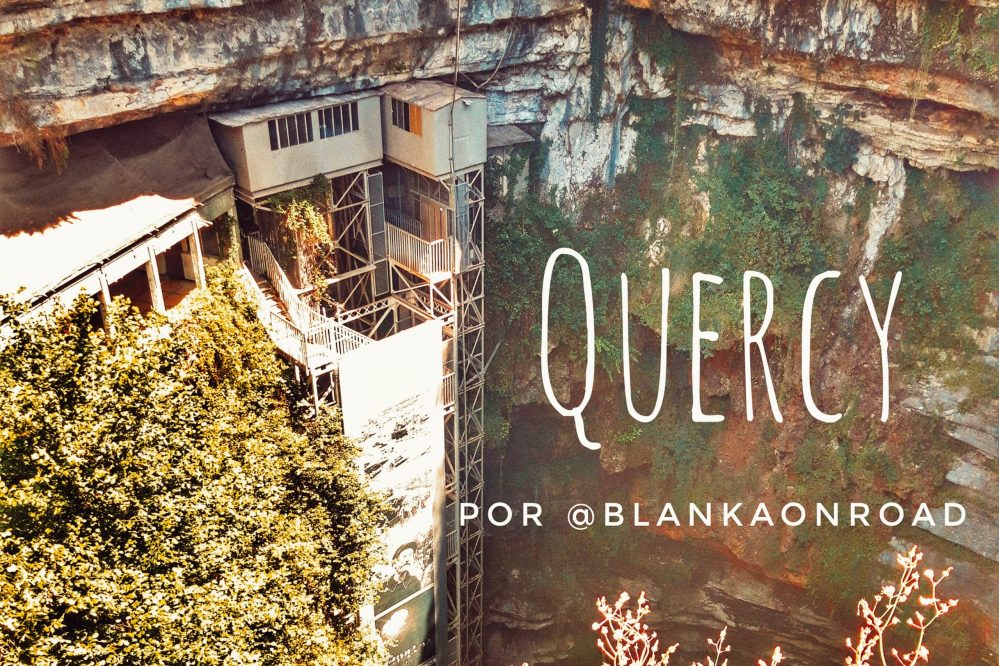
11. The Quercy Natural Park, a little-known place in France
Discover a destination that perhaps sounds little to you and that, on the other hand, has a lot to offer you. The Quercy in a motorhome It is a destination that will not disappoint you.

12. Alsace at Christmas, a must with a motorhome
If we talk about a Christmas trip, without a doubt this is the great motorhome trip in France. Discover Alsace by motorhome at Christmas .
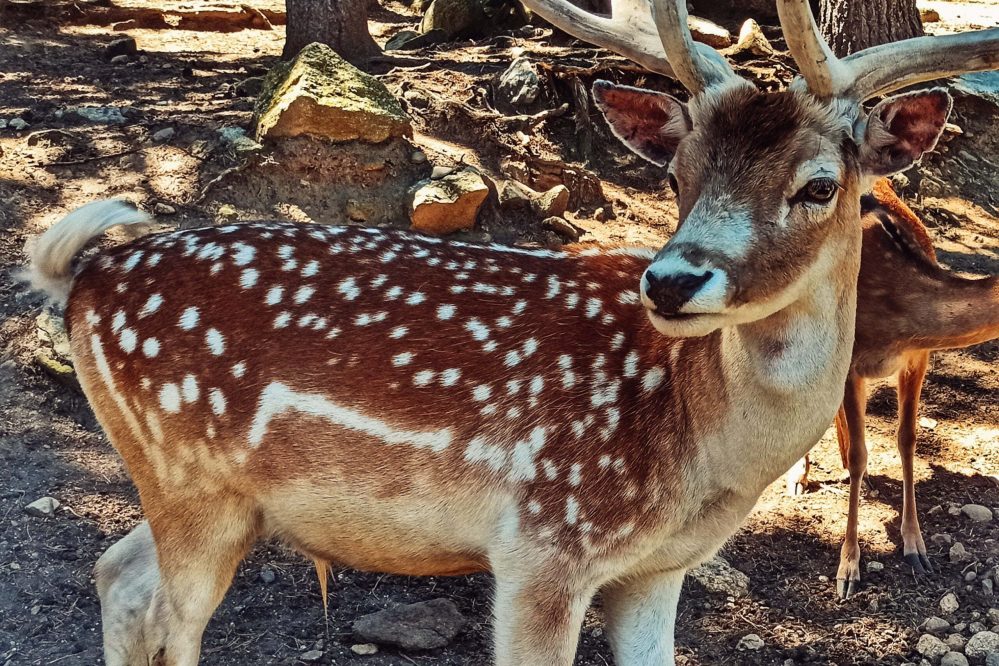
13. Vallespir, Capcir and French Cerdanya, hot springs and pure nature in the French Pyrenees
Discover a place full of hot springs, ski slopes, castles and trails full of nature in the heart of the French Pyrenees. The Vallespir in a motorhome , Capcir in motorhome or the Valley of Eyne and Llo in a motorhome for the French Cerdanya in motorhome You will fall in love summer or winter.
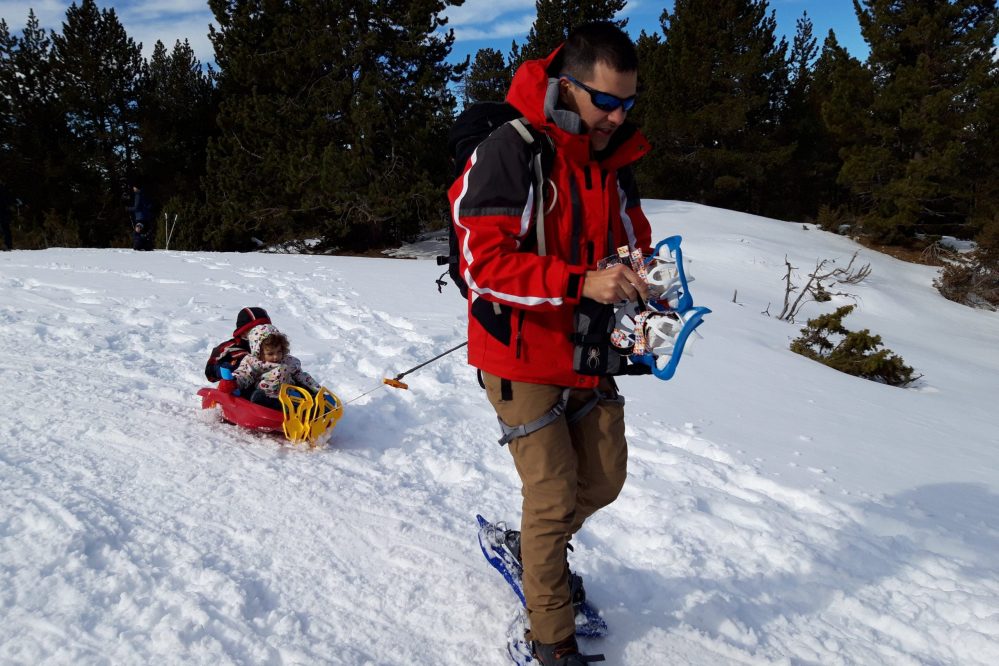
14. Skiing and snowshoeing in the French Pyrenees
Discover ski slopes as great as those of Font Romeu by motorhome , Les Angles by motorhome or Portè Puymorens in a motorhome . Ideal places to go with the family and also to learn to ski, as they all have a free slope for beginners.
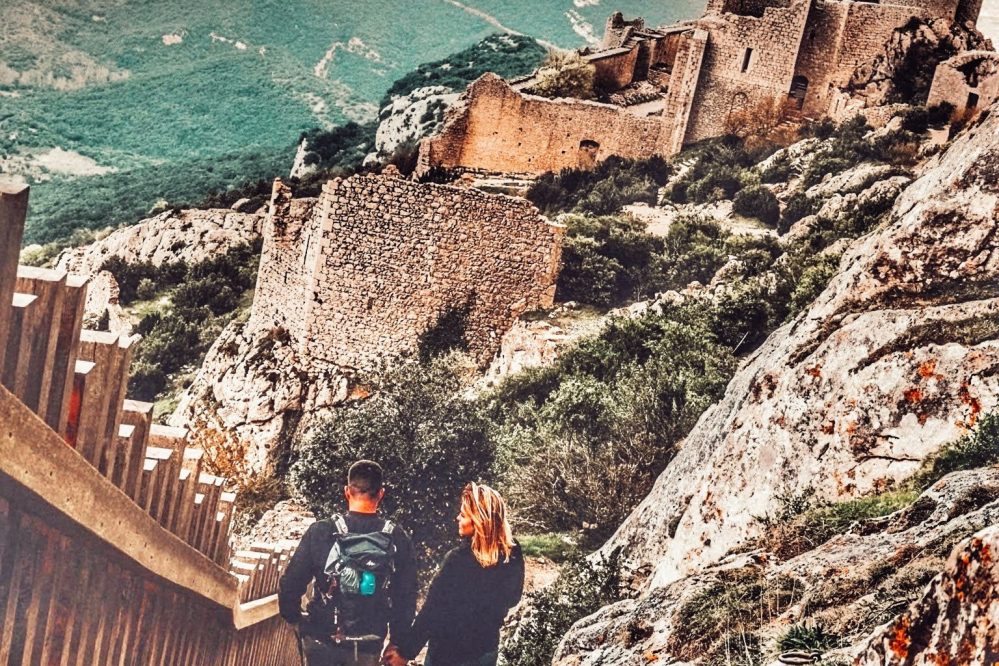
15. Route through the Cathar castles and Orgues Ille sur Tet
In the south of France you can discover the route of the Cathars among its castles and magnificent natural landscapes. Enjoy a route through the Cathar castles by motorhome and discover the authentic France.

16. Lavender fields and the sea in Provence and the Côte d'Azur by motorhome
Enjoying walks among lavender fields and vineyards is possible in a motorhome trip to Provence . A region where you can discover some of the most beautiful small villages in France and enjoy incredible landscapes.
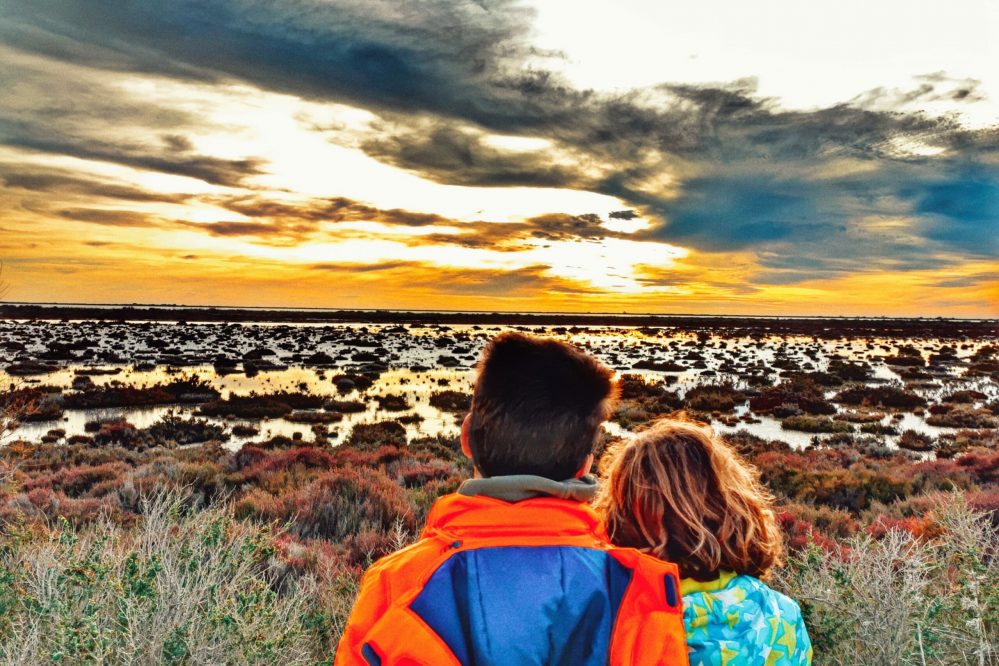
17. The Camargue National Park, between marshes
Between marshes, birds and Roman archaeological sites of the surrounding populations we discover the Camargue by motorhome.
18. The Landes and Bordeaux in a motorhome
In a unique setting, we find the Landes on the French Atlantic coast and close to Bordeaux, the epicenter of good French wine.
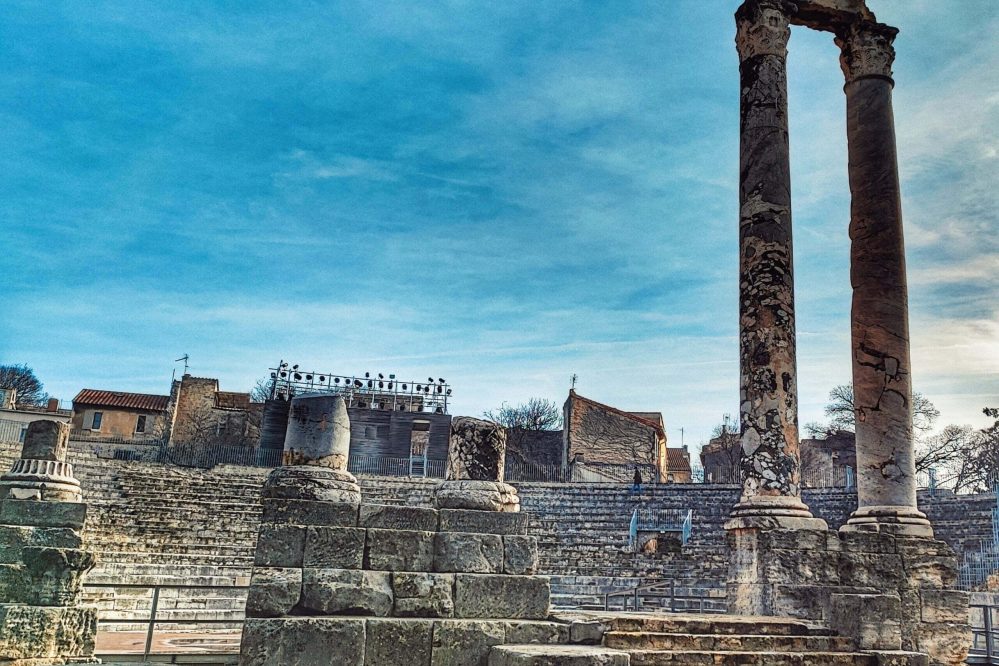
19. Roman and medieval Occitanie
Occitania is home to great treasures, Roman and medieval archaeological sites that surprise any traveler and where it is worth getting carried away in a motorhome.
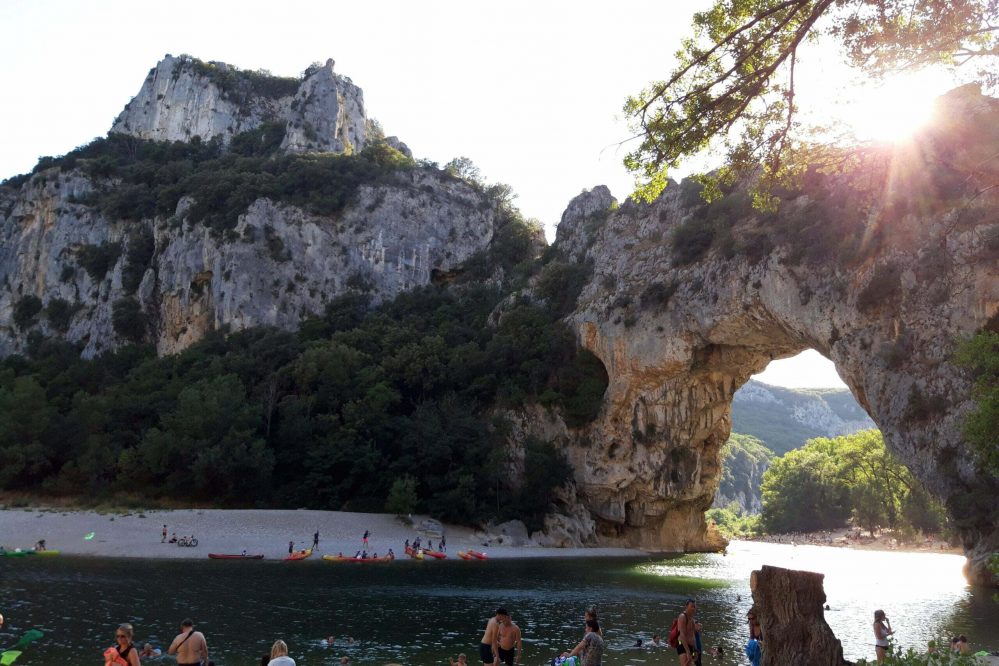
20. The Ardèche
We spent 5 days in the Ardeche in a hot summer. There in the waters of its river we enjoy the coolness of the sunsets. The Ardeche in a motorhome is a river, a kayak adventure, prehistoric caves and charming villages.
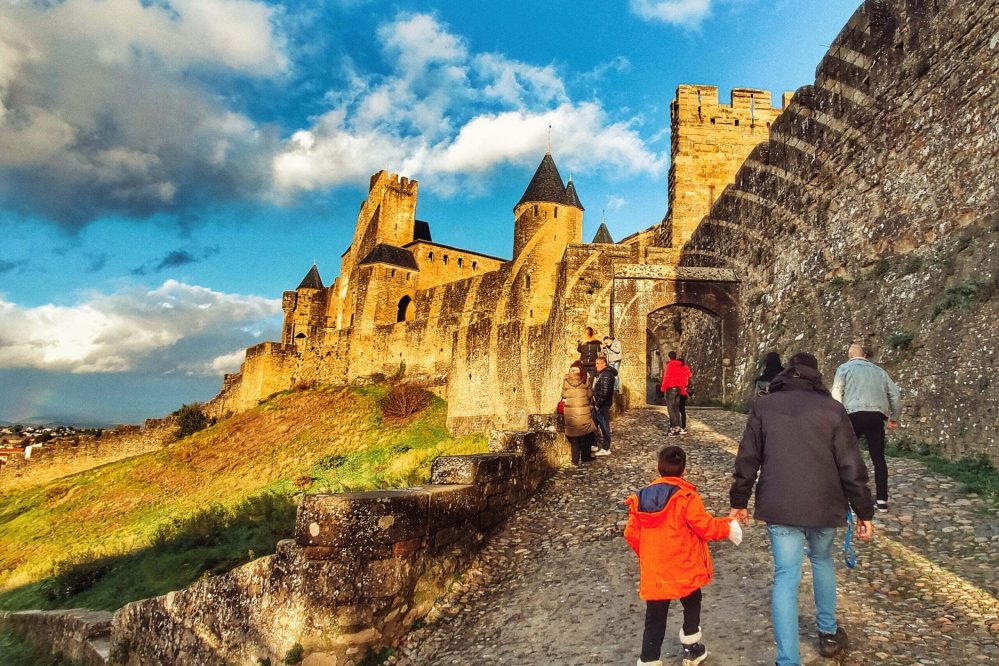
21. The South of France in a motorhome Carcassone, Toulouse and more
A route through Narbonne, Carcassone until we reach Toulouse by motorhome, discovering its surroundings is a route 10, especially at Christmas when all these cities together with Le Bacarès become Christmas stories full of Christmas markets and attractions, an essential route through the South of France at Christmas that you can't miss.

Other countries and motorhome routes
motorhome routes in spain.
Next, access different useful articles that can help you plan your getaways in a motorhome or camper van in Spain.
Latest posts from our blog
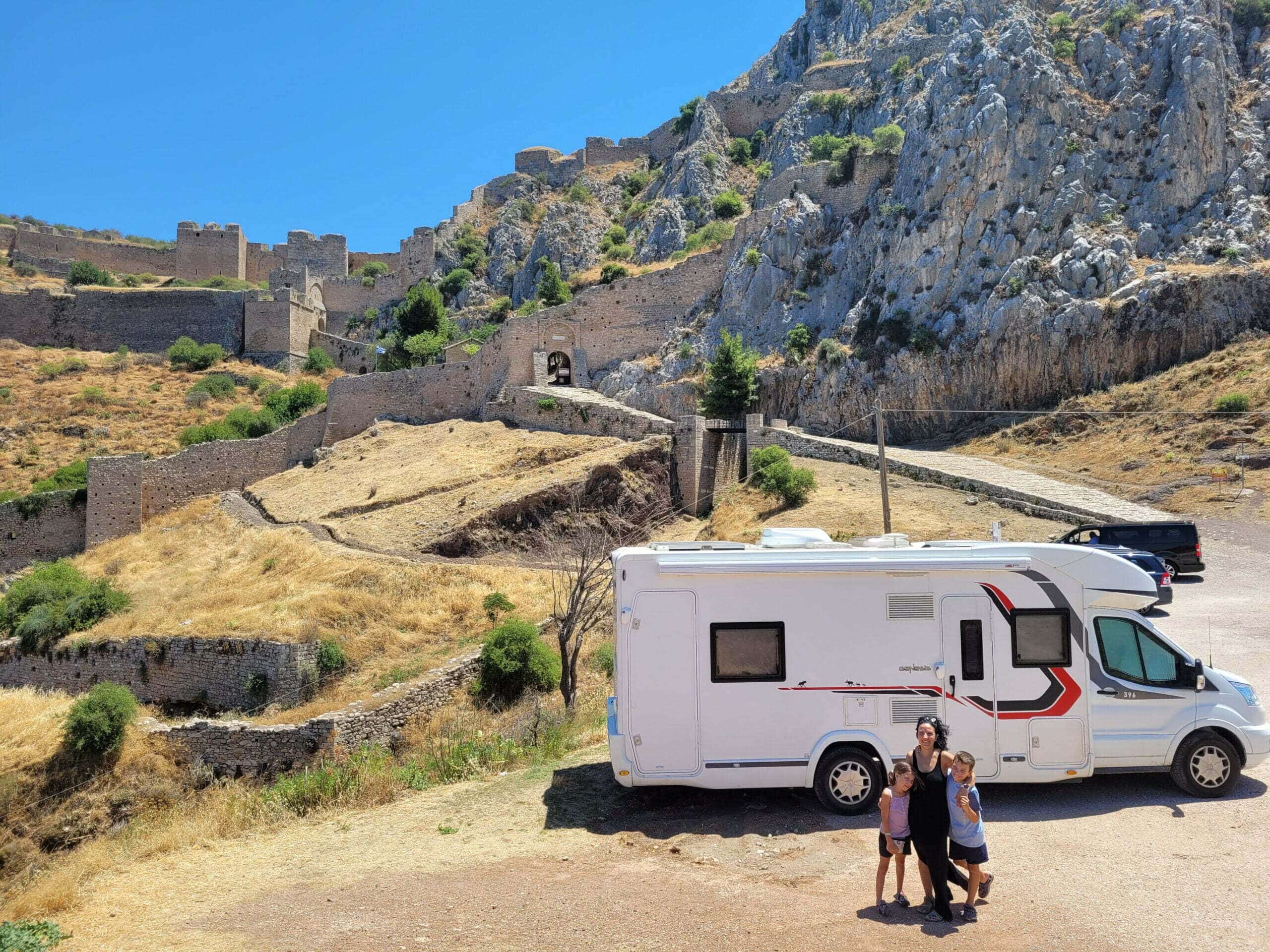
Definitive manual for traveling by motorhome【2024】
Super complete manual for traveling by motorhome with all the answers to your questions.
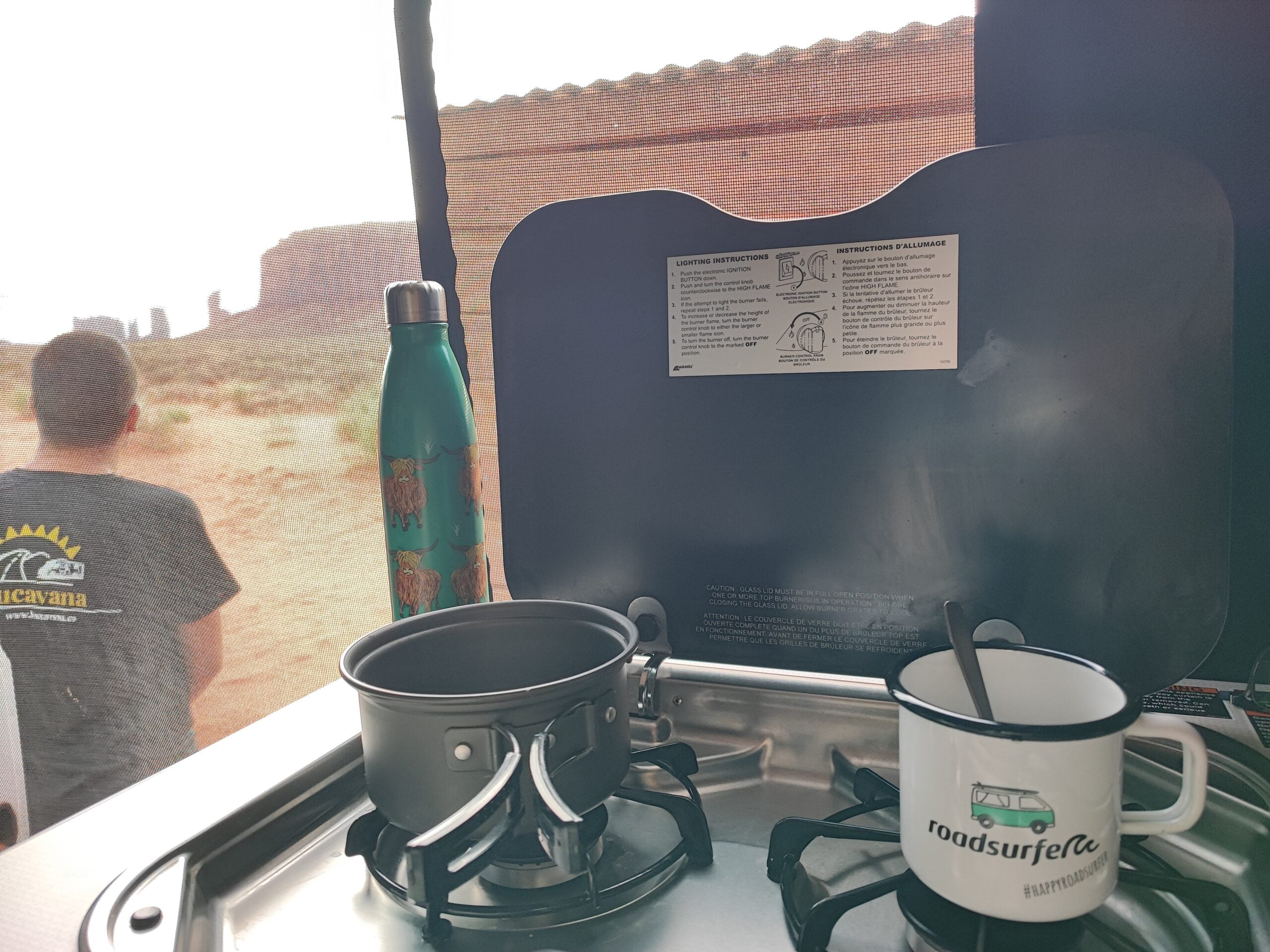
Guide to traveling to the United States by motorhome. Driving for the American dream!
Hello adventurous traveler! If you are reading this it is because you have surely been bitten by the adventure bug and you are planning to tour the United States in a motorhome or camper or, RV (Recreative Vehicles) as they call these vehicles in the US, a choice that promises to be epic and full! of unforgettable moments! As a mother of two…

Conquer Olympus on wheels: The definitive guide to traveling by motorhome in Greece
Greece in a motorhome has been a great gift. A dream come true from years ago. We are Pilar, Jose, Arnau and Anna, a traveling family who loves life and this planet. We normally travel by motorhome, previously by van, but we also like cycling and even backpacking trips. In our Kucavana blog, we share with you,…
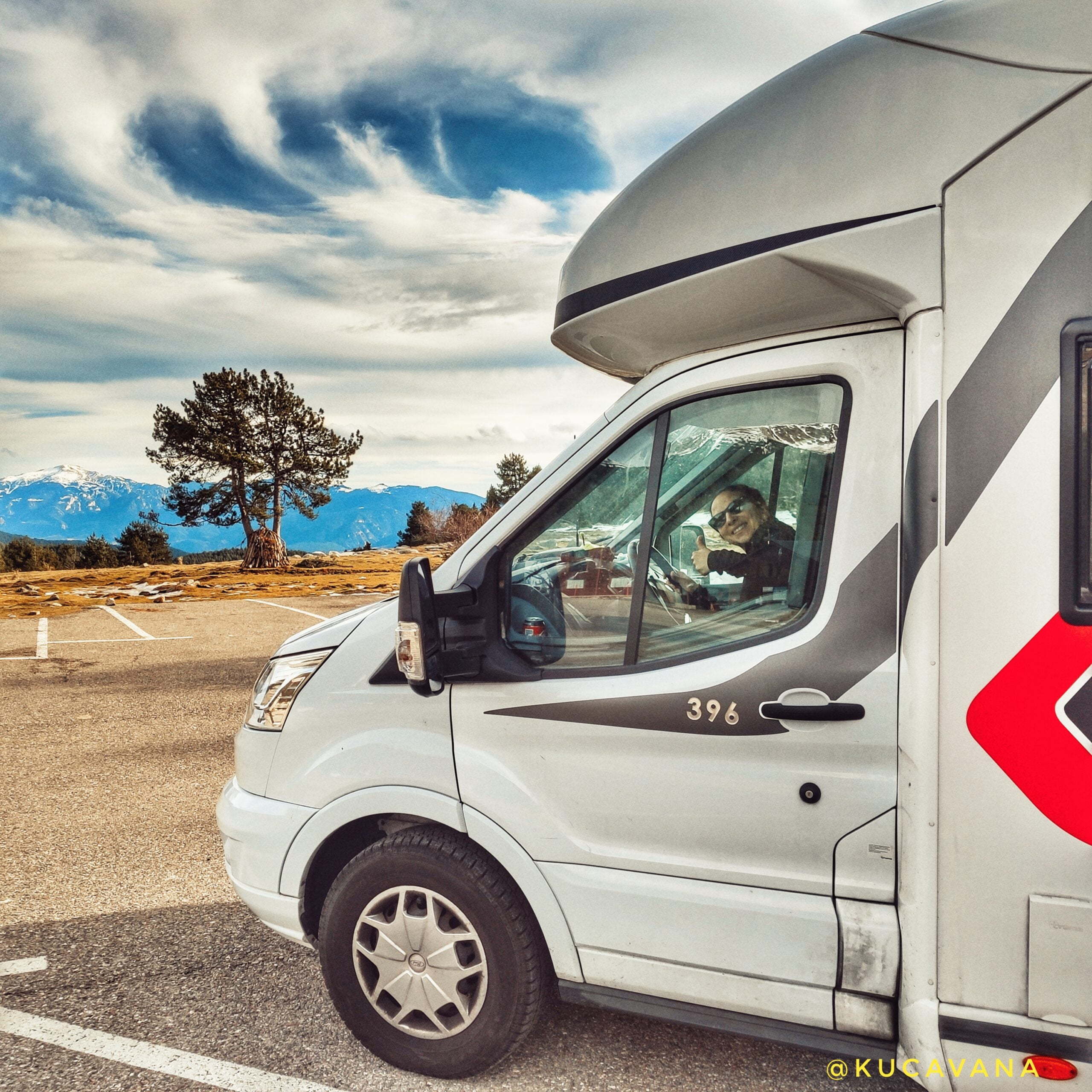
Driving, parking, spending the night or camping a motorhome in Spain: guide to regulations, technology and more
We explain where you can drive, where you can sleep, camp and park your motorhome or camper van
Ethical code:
On our blog you will find affiliate links. These are always placed with our highest ethics. We never publish any service or product that we have not used before and that we are sincerely happy with. That is why our recommendations are always ethical. In addition, there is no additional cost for you to book through our links and, on the other hand, it means a small commission for us that helps us maintain this blog so that you can continue enjoying it for free.
This entry has 2 comments
Boon day!!! I love your adventures described here, Marxem de Solsona capped the Dune du Pilat and I do not advise to open one of your routes: Perigord with a motorhome and for the Dordonya with a motorhome, could you pass me the info please? I don't know if ens will be molt aprop del desltí but fa bona pinta.
Thank you so much!!
I check the links, potser hi hagut some problem. I review and the grounds are now mateix. 🙂 Thank you for notifying family and thank you for all of you who are a fan of following and want to share travel stories! One abracada!
Leave your comment Cancel reply
Subscribe to the mailing list!
To provide the best experiences, we and our partners use technologies like cookies to store and/or access device information. Consenting to these technologies will allow us and our partners to process personal data such as browsing behavior or unique IDs on this site and show (non-) personalized ads. Not consenting or withdrawing consent, may adversely affect certain features and functions.
Click below to consent to the above or make granular choices. Your choices will be applied to this site only. You can change your settings at any time, including withdrawing your consent, by using the toggles on the Cookie Policy, or by clicking on the manage consent button at the bottom of the screen.
Shopping Cart
Join our Adventure: Get all my insider tips for motorhoming & road trips
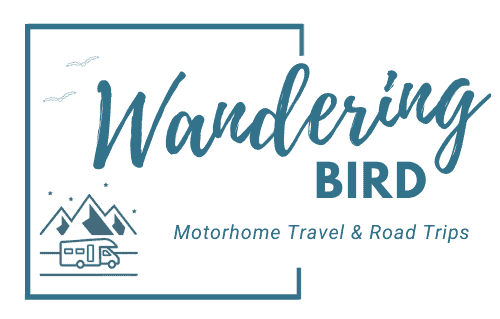
How to tour Europe in a Motorhome-the ULTIMATE guide
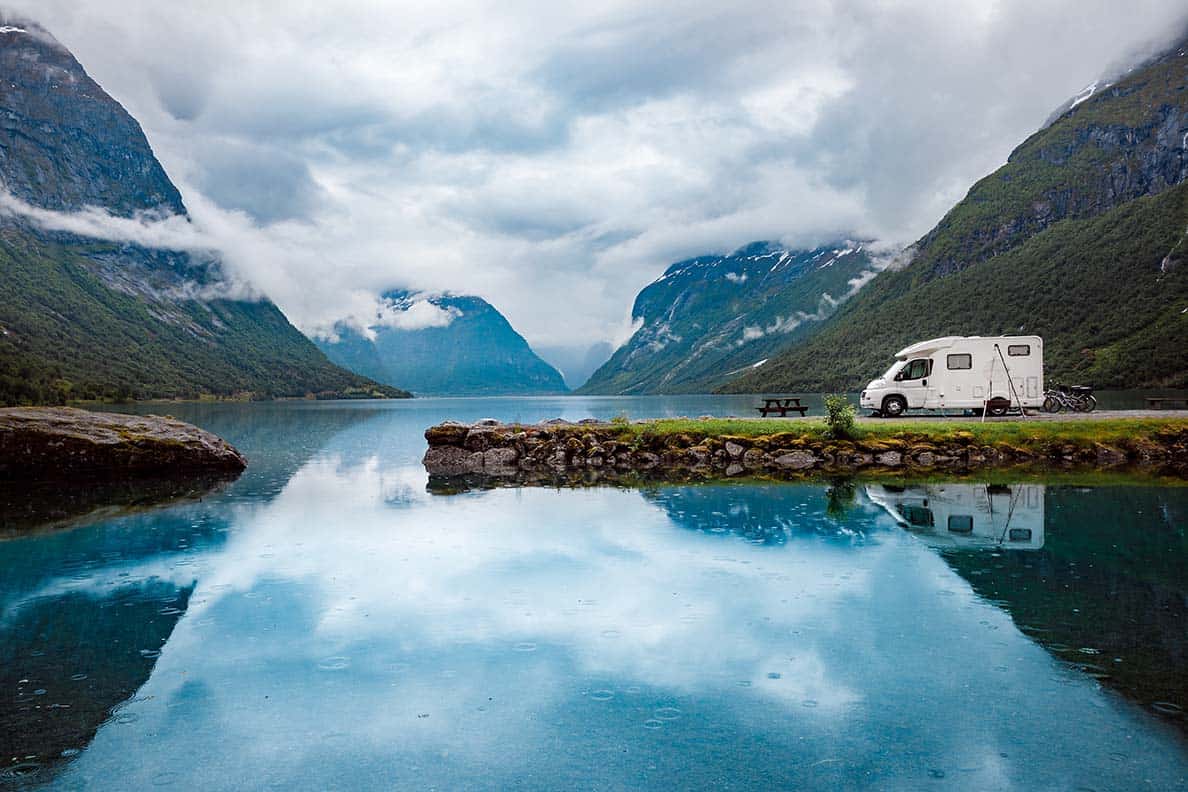
Want to tour Europe in a motorhome or campervan? Feeling a little overwhelmed and not sure where to start? Here’s everything you need, from what kit to pack, what paperwork you need to carry, how to prepare your van, European road trip itinerary ideas and tips for life on the road.
Don’t forget to grab your free Europe motorhoming checklist below.
*We work hard to make this the best motorhome travel blog and road trip website possible, full of helpful content for you. The website is supported by our readers, so if you buy through links on this site we may earn a commission- at no extra cost to you. All opinions remain our own .
If you find this post useful, you can also treat us to a coffee – we promise to enjoy it while creating more useful content like this- we might even indulge in a biscuit (or two!)
JUMP AHEAD TO...
Touring Europe in a motorhome blog- our story
I remember the first time we took our motorhome to Europe. There were SO MANY rules and things to pack and what the heck are aires and how do I book one and what route should we take and do we need…
To say I was daunted was an understatement. Everywhere I looked for advice had totally contradicting information. I spent the first few days of our Europe road trip feeling exhausted and terrified that I’d forgotten something vitally important.
If you’re also feeling intimidated by the idea of travelling Europe in a motorhome, camper van or even a caravan, don’t panic. Since that first trip, I quit my job so we could explore Europe by motorhome as often as possible (let’s just not talk about 2020…)
We’ve travelled nearly 60,000 miles and visited 17 countries. We have made many MANY mistakes… but we’ve also learnt a lot about vanlife in Europe and what NOT to do. And I’m going to share that with you today.
I promise- it’s not as scary as it feels right now.
Today I’ll walk you through the various steps you need to take to plan your own motorhome road trip to Europe and, hopefully, you’ll feel much more confident by the end of it.
Don’t forget to grab your free printable Europe motorhome travel checklist , which will help you remember everything you need.
Unsure what you need for your Europe road trip? Worried you’re missing something important?
Grab your FREE Europe Road trip Checklist NOW- everything you need: essential kit, paperwork and useful gear to take.
This form subscribes you (free!) to the Wandering Bird mailing list. We share tips, itineraries, and helpful guides like this for road trippers and motorhomers.
We never spam (yuck) and you can unsubscribe at any time.
How to Tour Europe in a Motorhome, campervan or RV – where to start
Let’s start with the basics. Before you can head off to Europe in a motorhome, you need a motorhome or camper van! You can either buy one or hire one and there are pros/ cons to both.
TOP TIP: If you’re planning a 3 month or more trip to Europe, definitely buy a motorhome- it will be MUCH cheaper. Here’s our complete motorhome buyer’s guide to choosing the camper for you.
If you don’t already own a motorhome and are considering getting one, hiring a motorhome or campervan for at least a weekend, preferably a week, is the perfect way to know if motorhome life is for you, before you spend a lot of money on one.
Also, if you are looking to buy a motorhome for the first time , hiring one is a great way to learn what layouts work for you, what you like and dislike and what you’re looking for in your own vehicle.
Having said that, we bought our first motorhome with no experience and no planning and set off to tour around Europe after only 15 days… So do whatever feels right for you.
Want to rent a vehicle for your road trip?
These might help:
- Discover incredible deals for motorhome/ camper rentals
- Find the best deals for car rental
READ: 10 essential questions to ask before you rent a motorhome
Motorhoming in Europe- 25 Essential things to know
Watch this video for 25 things you need to know about touring with a motorhome or campervan in Europe:
We hope you found the video useful. If you did, we’d love it if you followed us on Youtube . New videos with tips for motorhoming and campervanning in the UK and Europe are released weekly.
Motorhome Touring in Europe- where to stay?
Once you’ve got a vehicle to tour around Europe in, the next thing to consider is how do you want your trip to Europe to be and where are you going to camp/ park overnight?
- Do you want to stay at a campsite with pitches for motorhomes, campervans and caravans which has loads of facilities and activities for the kids to do?
- Would you prefer to wild camp in your motorhome and stay at a new place each night, far from crowds and cities?
- Do you want to use aires/ free overnight parking spots in Europe and stay 2/3 nights in a place before moving on?
Deciding the type of holiday you want to have will make planning your motorhome trip a lot easier. Here’s a bit more information about the types of motorhome parking available in Europe to help you decide.
Motorhome campsites in Europe
Campsites in Europe are very similar to ones in the UK; you arrive, are given or can select a pitch with or without electric (depending on what you booked) and that’s it. Often, you will need to provide ID when you arrive and some places even keep hold of your passport while you stay.
Campsites often have great facilities- like swimming pools or a beach on a lake, watersports, play area, restaurants, fresh bread delivery, shop etc. Dogs are normally always welcome, but there isn’t always a dog walk/ run where they are allowed off lead.

European motorhome travel in the school holidays- or not?
If you’re travelling in the school holidays, you’ll want to book up the campsite (if you’re using one) asap- the best ones get booked up months in advance.
If you’re NOT travelling during the school holidays, you might want to consider getting an ACSI camping card – you’ll save a lot of money on campsite charges.
Aires in Europe
For us, we prefer to travel around Europe in our motorhome and explore different places during our trips instead of staying in one area. We generally stay only one night in a place (unless we’re planning to ride the motorbikes, in which case we find somewhere for a few nights.)
There are two types of motorhome overnight parking options instead of campsites. The first are approved Motorhome parking places, which are called Aires in France , Stellplatz in Germany and Sostas if you’re campervanning in Italy . They’re all pretty much exactly the same!
Motorhome Parking Tips for Aires
You cannot pre-book Aires- they operate on a first-come basis. We found people tended to move on about 10-11am and most were parked up by 4pm, so try and move within that window for the best chance of finding a space. When we toured Italy, we left a little earlier (around 9ish) and aimed to be parked for lunchtime-ish, which we think helped us get in where we wanted without problems.
We like aires, as we feel happier leaving our motorhome if we want to go off an explore, and don’t want to deal with the noise or expense of a European campsite. We tow motorbikes behind our motorhome and love being able to use them without worrying if the van is ok.
You can find more on how to use aires and find motorhome parking around Europe here.
Wild camping with a motorhome or campervan in Europe
The other option for overnight motorhome stopovers in Europe is wild camping, which is staying somewhere that’s not an ‘approved’ place overnight and then moving on the next morning.
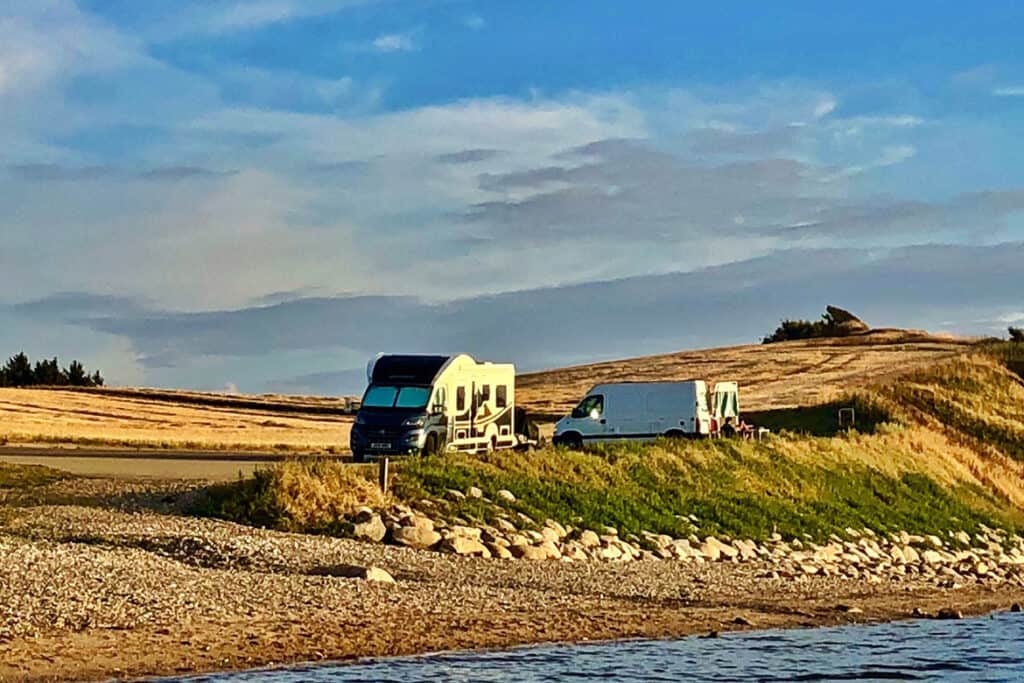
Rules for wild camping with a Motorhome in Europe
There are many different rules and different stories about motorhome wild camping across Europe. Wild camping is technically illegal in many countries, such as Switzerland – but we’ve stayed off-grid in our motorhome hundreds of times without any trouble at all. Heck, it was a night wild camping in the Alps in Switzerland in our motorhome which made us decide to change our lives and go motorhome travelling (almost!) full-time!
Wild camping in France in a motorhome or campervan is tolerated, as long as you’re not near the coast or in a restricted area. Find out more about motorhome wild camping in France.
My advice is to research the rules for the country you’re visiting, and then check out Park4night. Don’t park if it says ‘No Overnight Parking’. Also, always trust your gut. If you’re not sure and not happy, move on to an approved Motorhome stop point, so you can get a good nights sleep without worrying about being woken up for parking illegally.
You can find everything you need to know about how to wild camp with a motorhome or campervan here.
How to find free/ cheap Motorhome Parking spots in Europe
So, HOW do we find these overnight stopovers in vans in Europe? There are three apps we use. They’re all great but work in slightly different ways.
Park4night is what we mainly use when motorhome touring in Europe- and it is BRILLIANT. It’s both an app and a website- we tend to use the app most while travelling. There is a small annual fee but it’s well worth paying for.
This is how we use it:
- Drive to somewhere we want to explore- or a place en-route if we’ve got a long route planned.
- As we get closer, open up the app on my iPad or laptop (read more about getting internet in a motorhome )
- Put in the area you are heading for into Park4night and filter your options.
- Look at photos and comments to remove any with bad reviews, or which are too small for your motorhome to fit into.
- Check to make sure the place is open! A lot of places close between Oct- Apr.
- Then I tend to go on gut feel. I might have two or three options at this point but if I’m honest I’ll know which one of those three I like the idea of most, and that’s the one we head for first. If we get there and it’s full/ closed/ turned into a building site (has happened twice to us!!) then we have other options we can fall back on and we can head to those next.
We use Park4night as it tends to have the most options for places to stay in Europe. However, there are some other good choices too.
Planning to take your motorhome to Europe?
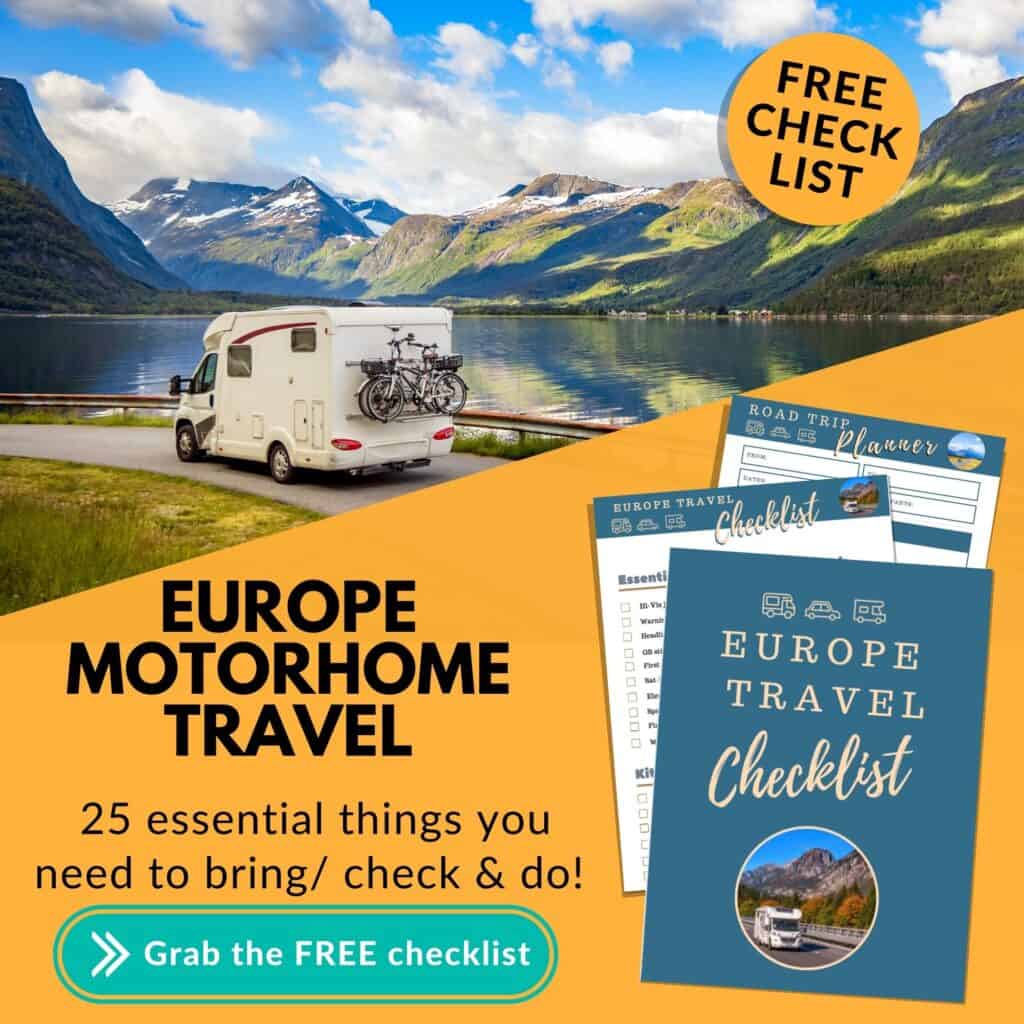
GUIDE: Stop the overwhelm with our step-by-step guide. Contains eBook, checklists and more. Complete Europe Motorhome Travel Toolkit
CHECKLIST: Don’t forget to grab your FREE Europe motorhome travel checklist HERE
GEAR – If you need any motorhome gear for touring Europe, here’s what we recommend.
Camper contact
Camper Contact works in a very similar way to Park4night, however, the BIG thing it offers which we love is you can remove all parking spaces which aren’t suitable for longer motorhomes. We love this feature when we are towing a trailer behind our motorhome and want to make absolutely sure it’s suitable for a longer vehicle.
Camper contact is free on the website but the app requires payment, which is another reason we prefer Park4night.
Searchforsites
Search for sites is another motorhome parking app but is better for in the UK. Again, it’s a really useful site and well worth checking as occasionally there are different places on here than on the other two. Pretty much all the reviews on here seem to be in English, which can help when you want to read what people thought!
Between the three of these motorhome parking apps, we’ve travelled around Europe without any problems. Once, in Italy in August, our preferred Aire was full, so we had to move on elsewhere and a few times the place we’ve been heading for no longer exists!
If you find out of date information, please take the time to update the app so other motorhomers don’t do the same thing. They are all great resources and, without them, motorhome road trips in Europe wouldn’t be nearly so easy.
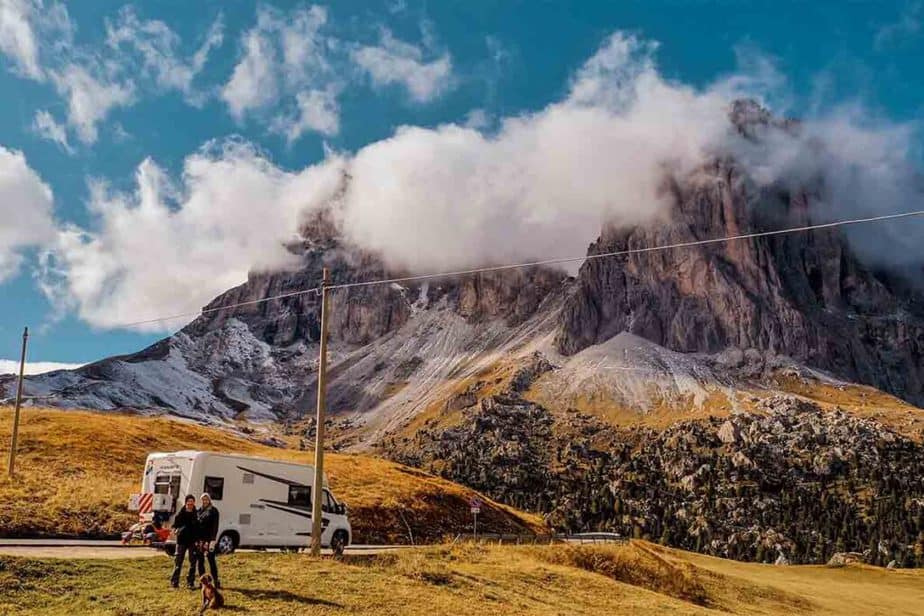
Other parking schemes in Europe
In Europe, there are several schemes similar to Britstops as a great source of free overnight parking stops for motorhomes. In France, France Passion is a similar set-up, and there are others around Europe.
You can find a list of all the motorhome overnight parking schemes and how to find them here.
Motorhome Route Planning for Europe trips
Once you’ve decided where you’re staying, you can start planning a motorhome route in Europe . Obviously, if you’re just travelling to one campsite and back again, then the route will be fairly straightforward.
However, if you’re planning to use aires or wild camping, then you can decide where you want to visit, what you want to see and if you’re going to be using toll roads or not.
One thing to note is that we rarely plan an actual road route until we’re driving. or just setting off for the day. I don’t plan the roads in advance- just the places we want to visit during our trip. Everything else I do as we travel. If we want to visit a specific aire or campsite, I’ll note that in our plan. You can grab our free road trip planner and use that to help you plan your route and things to do.
The other thing you’ll need to plan is how you’re going to get to Europe. If you’re in the UK, will you take the ferry or use Eurotunnel ? There are pros and cons of both but it’s worth deciding quickly so you can book in advance and hopefully save some money.
TOP TIP: If you want some ideas for where to visit, here are some of the best Europe road trip itineraries for motorhomes and campervans.
Tolls in Europe
Many people are concerned about tolls in Europe and like to plan their routes to avoid them. There are pros and cons to this. Tolls occur in nearly every European country which doesn’t insist on a vignette. If you’re motorhoming in Germany you can enjoy some free autobahns (same if you’re motorhoming in Holland .)
When you plan a route in a country without a vignette, you have two options:
- The quick way (which uses tolls roads when necessary)
- The cheap way (which doesn’t!)
There is no right answer- it’s whatever’s best for you. If you only have a week for your motorhome holiday , many people will want to get to their destination asap, which means using toll roads.
If you have more time, you may want to save money and take the slower, but usually prettier, back roads. Do whatever’s right for you.
If you want to get an idea on how much a toll route might cost, use the website https://www.viamichelin.com/
This site will tell you the approximate driving costs for your trip, both in fuel consumption and tolls. The fuel setting is annoying as you can’t select for a motorhome/ camper, although you can select the appropriate mpg, but the toll charges & vignette costs (as long as your motorhome is under 3.5 tonnes and 3m tall,) are very accurate.
Motorhoming in Europe- paperwork you need to carry
So, you’ve got a vehicle, a plan for overnight stays and the beginnings of a route. Now it’s time for the paperwork you need to carry, both for your motorhome/ campervan and also for you.
Nobody likes this bit, because it’s pretty boring, but it’s also essential. We’ve been stopped twice, both times in France and both times near the ferry at Caen. The police seem to love waiting there and pouncing on Motorhomers and campervanners who might have forgotten something.
In France, fines for speeding or incorrect paperwork must be paid in cash on the spot, or else you’ll be escorted to the nearest police station- not the most welcoming start to your holiday! However, if you have all the following, there’s nothing they can do except wish you a ‘bonne journee’ and see you on your merry way.
READ MORE: Essential advice for motorhome touring in France
Complete list of paperwork needed to tour Europe in a motorhome
Here are your next steps for paperwork and staying organised (don’t forget you can download our FREE Europe motorhome travel checklist to keep organised)
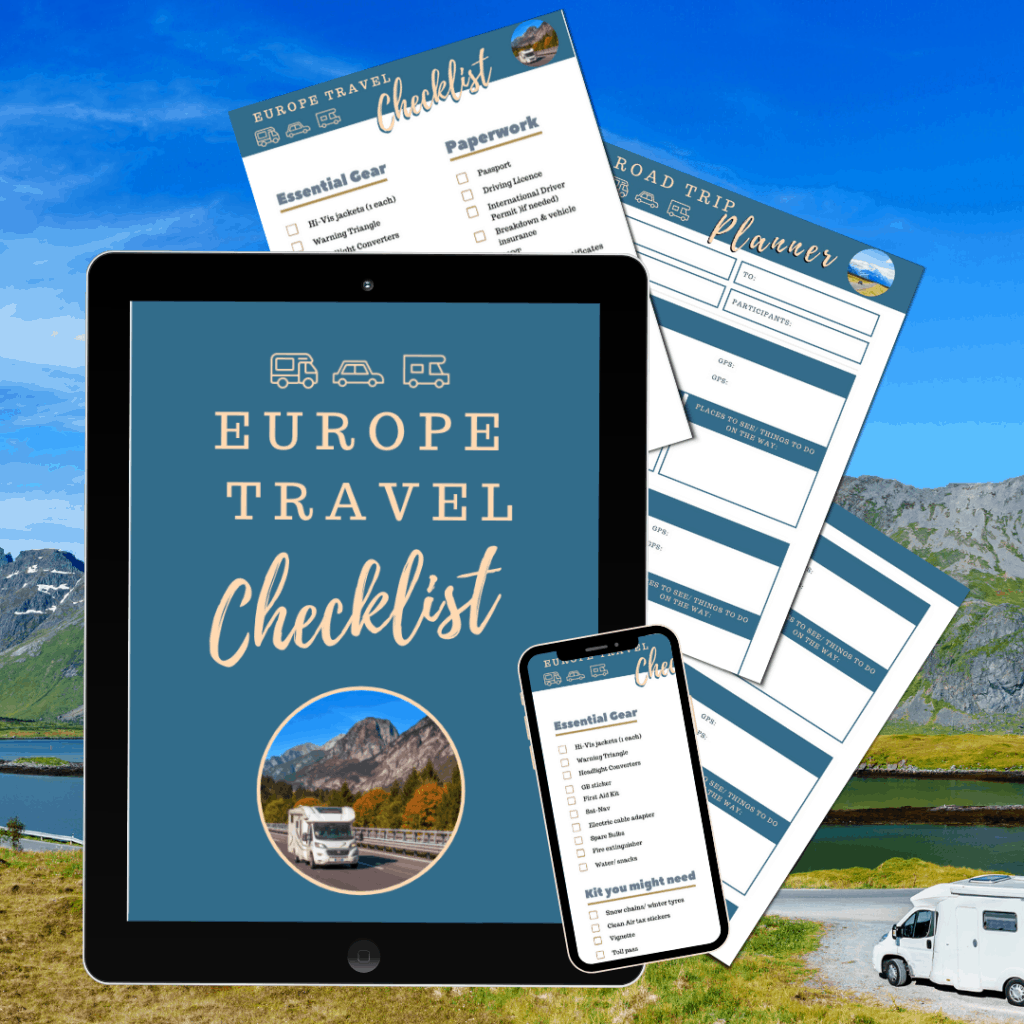
Want to head to Europe with your motorhome?
Grab your FREE (printable) checklist and discover 25 things you NEED to take with you when you travel in Europe. Make your life easier today.
- Make sure your passport is in date (with 6 months left)
- Make sure your motorhome insurance covers Europe travel
- Read the rules for driving in Europe after BREXIT
- Get a green card (if required- check with your insurer)
- Motorhome logbook (the REAL one- not a copy)
- If the vehicle is company-owned, hired or leased, you need a letter from the company stating their permission for the vehicle to go to Europe.
- MOT (date of)
- Driving licence- yes, your UK driving licence is legal in Europe but you might need an International Driving Permit .
- MOTs & logbooks for any other vehicles you are taking (like our motorbikes)
- Trailer EU certification if necessary
- Animal health certificate for pets (read about how to take a pet to Europe after BREXIT )
- Personal Travel insurance
- Drone Insurance (read our review of the best travel drones here)
- Put together an EPIC road trip playlist
- Do your last minute vehicle checks
- Details of ferry/ train bookings
- For larger motorhomes visiting France, you might need blind spot warning stickers
Motorhome Insurance
You need motorhome insurance which covers travel in Europe (and other places like Morocco if you’re planning to venture further afield). You also might want to get Breakdown cover which includes recovery to Home- just in case the worst happens. Bring your original certificate with you, not a photocopy.
Health Insurance
The rules for health cover for UK residents in Europe have changed after BREXIT. You now MUST have travel insurance. Make sure you read the conditions carefully- many ‘cheap’ policies don’t cover you for more than a week or two at a time, so if you’re planning on going away for longer you’ll need to find an appropriate insurer. Ideally, get repatriation cover to the UK- just in case.
Europe Motorhome Travel- Essential items you need to carry
Unlike in the UK, there are some things you legally NEED to carry in your motorhome, campervan or car when you’re touring Europe. These essentials Europe travel accessories include:
- UK vehicle sticker or UK on your reg plate- with the British flag, not an EU circle
- First aid kit – did you know it is illegal to NOT stop at an accident in France and many other places in Europe?
- Warning Triangle
- Hi-vis jacket which must be easily reached without leaving the vehicle (or getting off a motorbike!) We recommend carrying one per person, including for toddlers.
- Spare light bulbs for vehicle
- Headlight deflectors as our UK headlamps are pointing the ‘wrong way’ for European roads-
- Radar detectors are forbidden EVERYWHERE in Europe.
- Motorhome speed stickers for some vans
- NO- you do not need a breathalyser.
- You might also need a red/ white striped reflective board if you have bicycles or a motorhome storage box.

Useful kit for travelling Europe in a Motorhome or camper
Assuming your van is already packed with these essential motorhome accessories , there are a couple of things which will make your life easier when touring Europe in a camper.
Motorhome Wi-Fi
Is wifi in a motorhome an essential? For us it is- we work from the road, so we need a reliable way to contact the outside world (and upload blog posts like this!) Our life just wouldn’t work if we didn’t have a decent Internet connection.
For years, we had a wifi dongle in our motorhome and, quite seriously, it’s BRILLIANT. We’ve travelled all around Western Europe and it didn’t let us down once. Oh ok, it’s failed to get a signal just once and we were parked on the top of a mountain in the Swiss Alps at the time- I’m not sure I can blame it for that!!
We use data SIMS with Vodafone, 3 and EE and we find EE and 3 to have the best coverage across Europe. You can buy Prepaid SIM cards of data from Amazon ( like this one ) or take out a monthly contract (which is what we did)
More recently, we’ve installed this internet system in our van and it has been equally good, although we haven’t been able to travel much to really test it out.

Data Roaming in Europe
If you are travelling outside your home country, you need to make sure that data roaming is enabled on your phone AND that you have a plan which allows you to use data in other countries cheaply.
You will also need to know how to avoid paying high charges for data roaming in Europe.
Also, be aware that the data limit you have at home will probably NOT be the same as your allowance abroad- so be cautious with how much you use. It’s hard to track data usage, but things like using maps, watching TV in your motorhome , streaming videos or putting photos on Facebook can all use up a LOT of data very quickly.
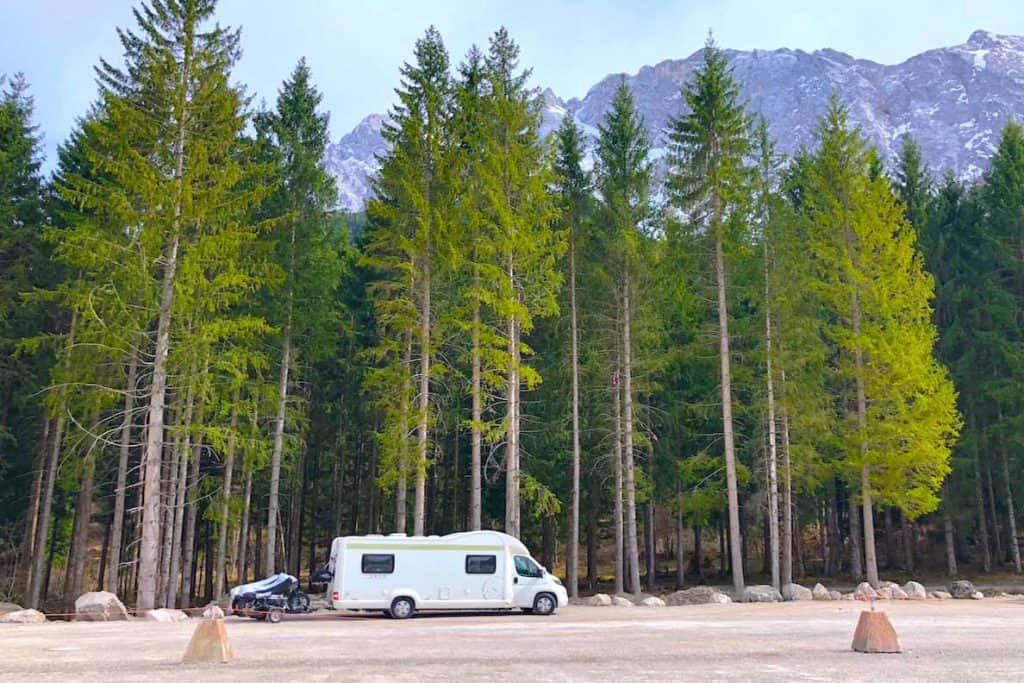
We highly recommend investing in a proper motorhome sat-nav before your start driving around Europe, especially if you have a larger motorhome, RV or campervan. You want something you can put your vehicle dimensions into and be able to avoid narrow roads, low bridges or weak crossings.
Here are some of the best motorhome and campervan sat-nav systems on the market- have a look and make sure you know how to use it before you set off.
Never, ever rely entirely on the sat-nav; keep an eye out for road signs and height restrictions as well. I also use my personal iPad or phone to find us an alternative route should we hit a traffic jam- both of those have ‘traffic’ setting enabled on them so we can see where the traffic is and how to get around it.
I often end up navigating our motorhome down tiny country lanes in the middle of nowhere- after all, it’s not a proper adventure unless there’s grass growing in the middle of the road!
Also, be careful where you mount your sat nav, especially if you’re using an ipad. Many countries now say it’s illegal to have the satnav mounted on the windscreen or blocking the driver’s view. We use this mount and mount our iPad on our dashboard, where it’s low enough to not cause any problems.

Campervanning in Europe – POWER!!!!
One of the joys of touring Europe in a Motorhome is the freedom that you can find on the continent which you just can’t get in the UK. Being able to stay off-grid in our van gives us that freedom. But, in order to do that, we need to manage our motorhome power requirements.
The solution to this is an inverter (and possibly a power pack, depending on how power-hungry you are!) We are VERY power hungry- we have two laptops, two iPads and 4 phones! ( Don’t ask!! Yes, I know there are only 2 of us!!)
We charge as much as we possibly can whilst we are driving the motorhome, including the laptops. We do this by running the invertor as we drive. The inverter is connected directly to the motorhome leisure battery and then we added a 2-plug extension lead, which allows us to charge our laptops on a drive, saving our precious battery power while we’re camped.
We fitted and love this inverter but there are many other options out there if you need a different size/ power output.

I didn’t want a generator on our motorhome . I didn’t want to be THAT van with the generator going all evening, ruining everyone else’s peace and quiet. But, as my husband said, if we’re going to camp in the middle of nowhere for days at a time, we need an alternative power source ‘just in case’.
We’ve agreed that we will NEVER use it except in an emergency or for servicing, and we did a lot of research to find the best one for us in terms of noise levels and size. I have to say we’re really pleased with this one . It’s small enough to fit in a tiny cupboard under our seats and I can lift it with one hand.
We’ve used it several times of the past couple of years, including while touring Norway and Austria. We’re really impressed at how quiet it is and how well it works even after months of not being started!

12v Hairdryer
Whilst we’re on the subject of power, both Jade (our daughter) and I have long hair. We love letting it air dry on hot summer days, but if we’re motorhoming in winter it’s essential for us to have a hairdryer.
RELATED: Planning winter motorhome living or a trip? Read this first…
Believe it or not, we actually carry TWO hairdryers onboard (much to my husband’s ‘delight’…)
One is a good, powerful but lowish wattage one we use when we have electric hookup, and the other is a 12v one , which plugs into a cigarette lighter socket in the cab. Honestly, it’s not the best hairdryer we’ve ever tried, but better than nothing on a cold winter’s day.
Alternatively, a rechargeable hairdryer .

Solar Panel
We do have a solar panel onboard our motorhome- we believe it’s an essential motorhome wild camping accessory. It keeps the battery topped up whilst we’re camping and allows us to stay off-grid for a little while longer- at least if it’s sunny!
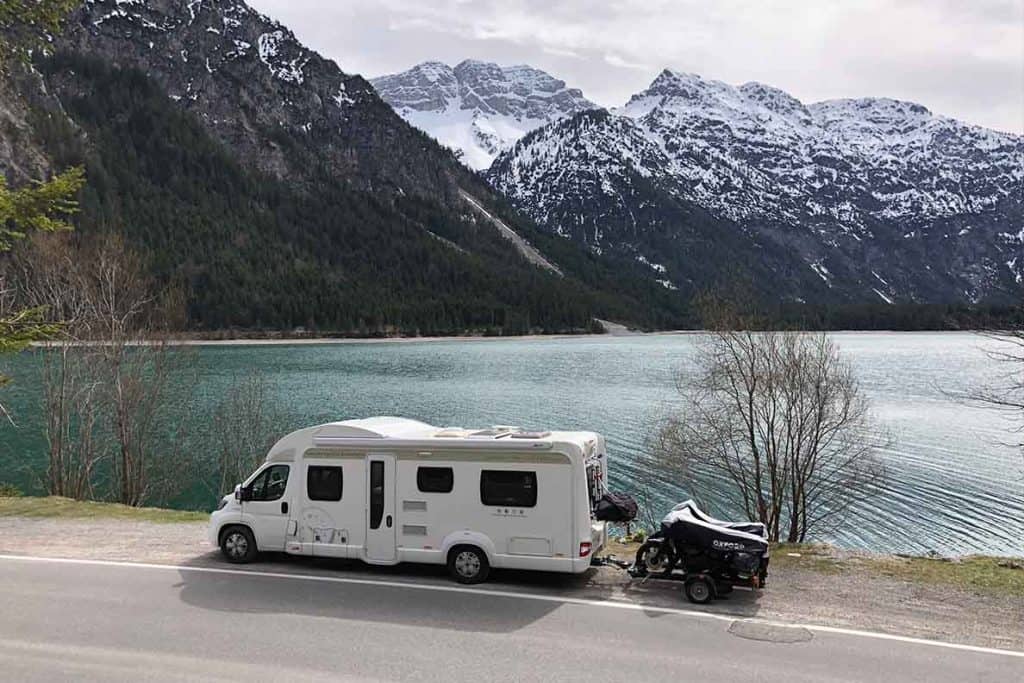
One of our very first motorhome trips to Europe almost ended after 2 days due to…err… gas. Or rather, a lack of it and an inability to get any more! There are some important lessons we learned and things you need to know about how to find LPG (gas) in Europe .
To combat that ever happening again (we hope!!) , we fitted Gaslow refillable bottles . These went easily into our existing motorhome gas locker and we were able to fit them ourselves. We used them for the first time last week and we’re really happy with them. Filling took a little while to figure out- turns out you need to TWIST the nozzle clockwise, but so far, so good! We’ve now had these installed for a year and wouldn’t switch back- refillable gas is SO MUCH cheaper and easier while travelling Europe in a motorhome.
Motorhome Touring in Europe – Other items which might be useful
ACSI is a scheme you can buy a membership to (like a motorhome club ), which then gives you massive discounts on campsites for motorhomes, campervans, RVs and Caravans- as long as you travel outside the peak seasons.
We LOVE our European toll pass. It’s sooooooo satisfying being able to sweep past all the huge queues at some of the tolls and go through the automated toll pass lane in France. It also works if you’re motorhome touring in Spain & Portugal. The best bit for us is not having to worry to find the change at each toll- it just sends you a bill at the end of the month which is paid automatically by Direct Debit so its one less thing we need to worry about!
We bought ours at Sanef Tolling, although they have now changed their name to Emovis-tag.
Tyres & Snow chains
If you are planning to go motorhome skiing or tour Europe in a motorhome in the Winter, think about your tyres and snow chains . It’s compulsory in most countries with Mountains (France, Germany etc) to have winter tyres fitted and to carry snow chains which will fit onto your tyres. This is usually enforced between 01 November and 15 April. This list by the AA gives a great guide for you.
Red and White reflective warning backboard for motorhomes/ campers
If you have anything extending past the back of your motorhome/ camper (like a bike rack or a tow bar), you MUST have a red and white striped backboard on the back. Make sure it’s the aluminium one, not the cheap version- the cheap version is not legal in Italy.

Travelling Europe in a Motorhome or campervan- Safety
Here are some important things to know about travelling in Europe
Emergencies
112 can be dialled anywhere in Europe in an emergency, accident or distress situation.
Security and theft
We have several things we do to protect our vehicle and our possessions whilst we’re travelling. We also have several things we do to safeguard ourselves if we’re back in the UK preparing for our next trip. Be sure to grab our FREE guide to motorhome security.
We have been lucky to have never been the target of theft, but it does happen. Most thefts are opportunistic- if you leave something outside unattended there’s a chance it will be taken- just like in the UK. Also, if you park in busy, built-up areas, there is more chance of ‘unsavoury types’ spotting the van and taking their chances- just like in the UK.
We strongly believe that touring Europe in your motorhome is no more dangerous than touring in the UK, but common sense should be used. We’ve chosen to fit an additional motorhome door lock which can be locked from both the outside and the inside.
Try and get your Euros in advance as you’ll get a better rate than if you use the ferry/ tunnel. You can get money out of cash machines abroad- but, of course, there are charges for that.
Also, don’t forget that not every country in Europe uses Euros . Here are some popular ones which might catch you out!
- Bulgaria – Lev
- Croatia – Kuna
- Czech Republic – Kurona
- Denmark – Krone
- Hungary – Forint
- Norway- Krone ( See how expensive our trip to Norway was !)
- Poland – Zloty
- Romania – Leu
- Switzerland – Swiss Franc
There are others in the East as well- make sure you check in advance- but nearly everywhere has a cash machine so you can always get money out if you need to.
We think it’s sensible to carry a spare set of keys for the motorhome with us. We hope we will never need them, but a spare set is going to be completely useless sitting back in the UK. So we decided to bring them with us and keep them well out of the way.
Make sure you’re carrying enough Medication for you and any pets you have. We always carry a little more than necessary- just in case! Be prepared to explain your medication and prove what it is with a doctor’s note or something similar- just in case customs question you.
Mobile Phones
Using a phone whilst driving is illegal in many countries. It is also illegal in some countries (such as France) to use a headset with an earbud whilst driving. Your phone must be completely hands-free.
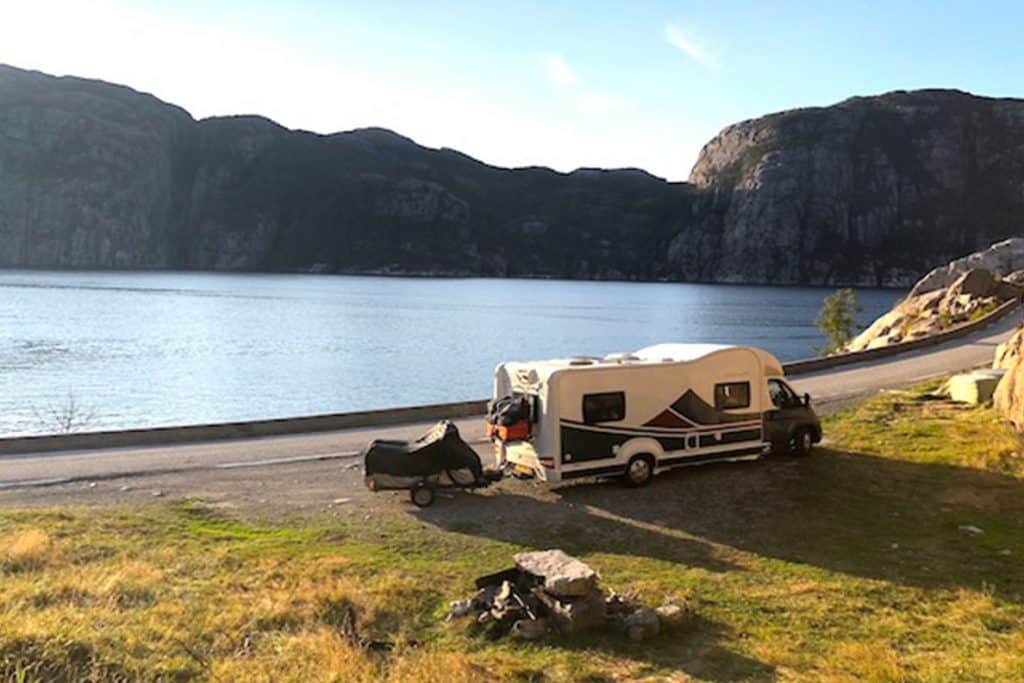
Driving in Europe- what to do in the event of a road traffic accident
You should have a European Claim Form provided by your insurer before you leave. In the event of an accident, all parties complete and sign the form at the scene and then send a copy to your insurer for assessment.
What to do at the scene:
- Stop your vehicle immediately but safely- out of the flow of traffic if possible.
- If a vehicle is blocking the road, use hazard lights and put the red warning triangle 30 metres from the scene to warn approaching traffic
- Name and address of all the people involved in the accident
- Vehicle registration numbers of all parties
- Insurance company details of all parties
- Take photos of damage using a camera, GoPro or phone
For more details, read our step-by-step guide on dealing with a road traffic accident in Europe
Motorhoming in Europe- Other Things to know
Sidelights must be switched on in the following countries at ALL times: Croatia , Denmark, Italy, Norway, Sweden & Switzerland
Daytime lights MUST be switched on for Motorbikes at ALL times in all conditions in ALL countries. Ours are wired so they automatically come on with the engine- saves us forgetting!
On-the-spot fines are common in all countries, although if you’re campervanning in Ireland the Police are not authorised to collect fines. Some places, like Croatia, give you 8 days to pay. Other places, such as if you go touring in Portugal , equip their police officers with an ATM to ensure fines are paid immediately!!
Be careful of low-emission zones and areas which require a congestion charge or something similar, such as Paris and London. These places are often clearly signed but it can be worth Googling requirements before you visit an area. Also, don’t forget you need a Vignette for Motorways/ toll roads in Switzerland and Austria. For a complete list of rules in each country, here’s the AA.
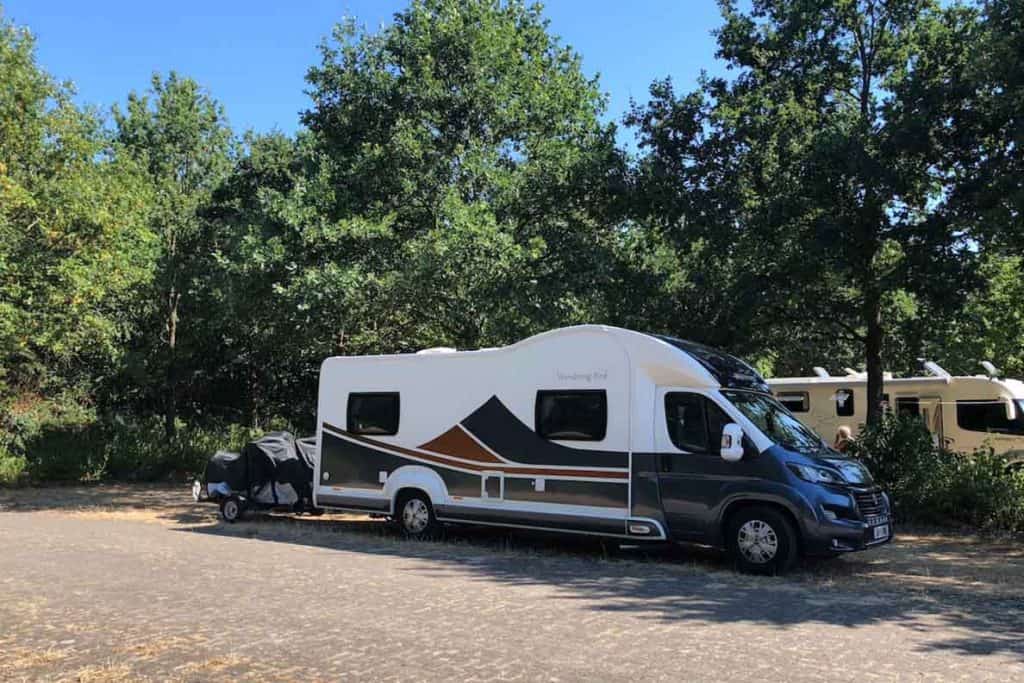
Touring Europe in a Motorhome – Final thoughts
Phew!!! There is a LOT of information in this post- and at first glance it can be overwhelming. None of it is ‘difficult’, but it will take up a bit of your time as you get it all organised. Here are some final tips to help you make the most of your big adventure!!
- Driving on the right is not as terrifying as it seems! Don’t forget- all the roads are set up for it- you don’t have to remember to go around the roundabout the wrong way- it naturally happens as that’s the way the road system works.
- Learn a little of the language. In France, Germany, Belgium and Holland, English is widely spoken, but they love it if you make an effort. After al, you are in their country and if you show a little respect to them they will really help you when you need it.
- Accept that you are a tourist- you will make mistakes and probably look like an idiot. But that’s part of the fun of travelling!
- Learn to ‘slow travel’- travelling by van is about the journey as much as the destination . This can be hard when you’re on a tight schedule, but try not to overbook your time so much that you can’t relax a little or explore random things that you find along the way- like an ice cave we randomly found in France…??!!
- Having said that, do a little research as you travel so you don’t miss some amazing places. We like to pick an area and then Google it to see what great adventures are waiting for us.
New to motorhome or camper travel in Europe? You might find these posts helpful:
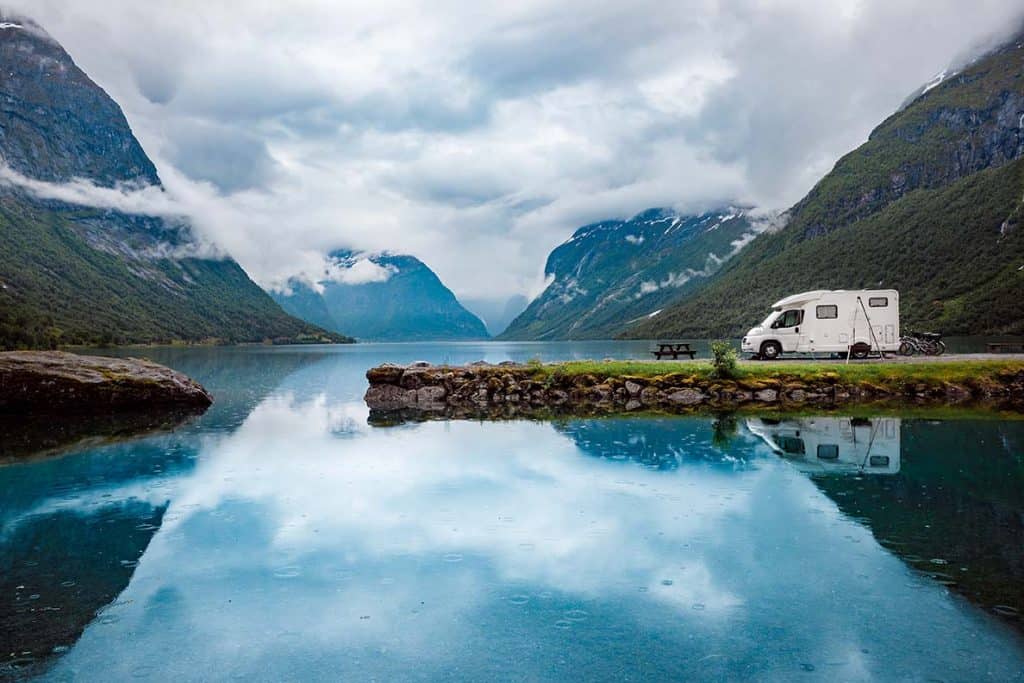
See all our Europe motorhoming posts here
NEED GEAR? If you need any kit or essentials for motorhoming in Europe, here’s what we recommend and where to find it
I hope you have the BEST adventures- be sure to tag me in your posts and show me where you end up! Let me know what you think of the guide in the comments below- I’d love to hear your thoughts.
Want to save this list for later? Here’s the pin. Enjoyed this post? We’d love it if you shared it on Facebook, Twitter or Pinterest. Thank you!
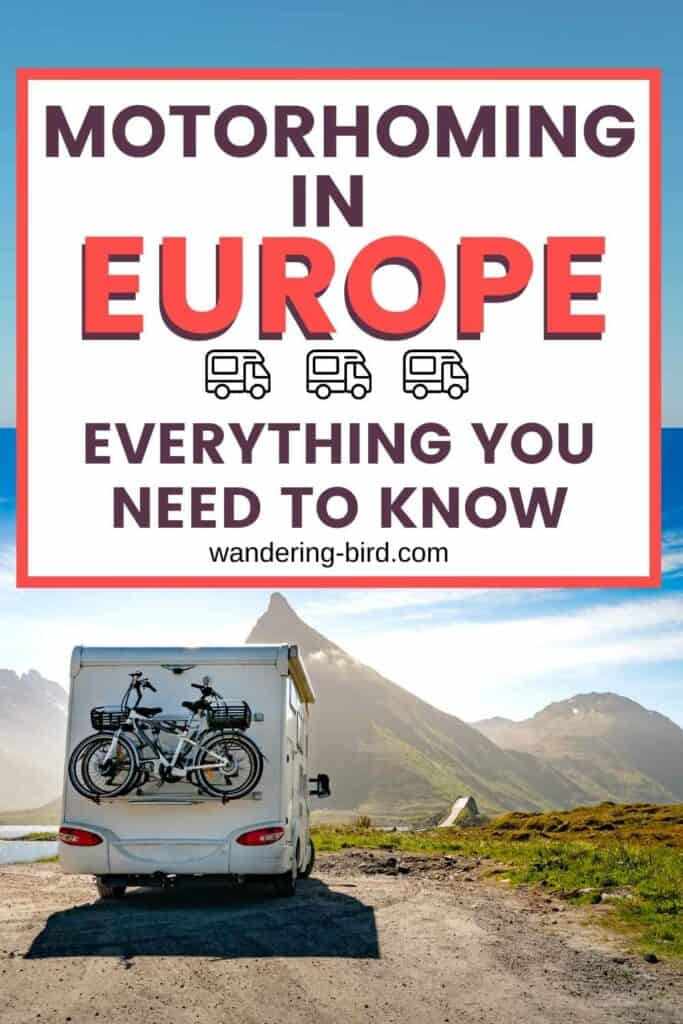
Kat never planned to buy a motorhome. She also never planned to quit her job as an air traffic controller, go touring around Europe in said motorhome, start one of the UK’s largest motorhome travel websites… or get a cocker spaniel.
Find out how she went from stuck in the rat race to being a digital nomad and inspiring thousands of people to have their own epic adventures here.
If you’d like to connect with Kat, send her an email or follow her adventures on social media.
Last update on 2024-04-30 / Affiliate links / Images from Amazon Product Advertising API
Sharing is caring!
Similar Posts
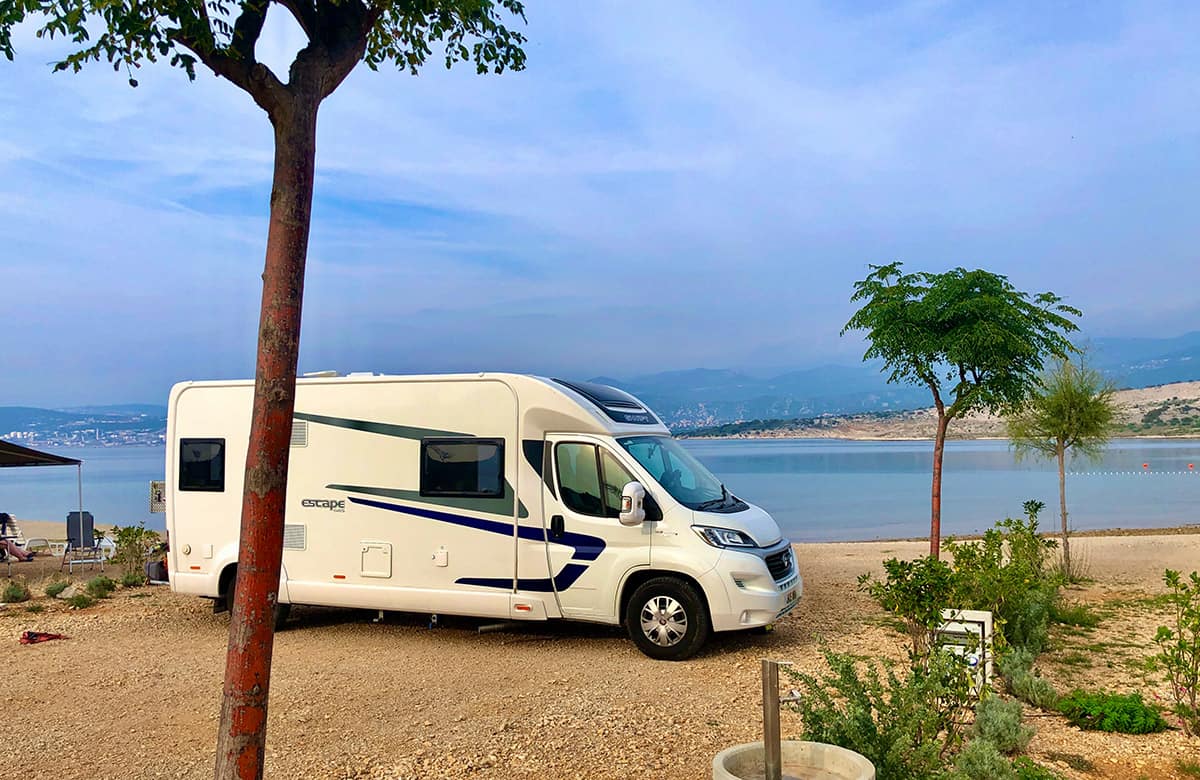
ACSI Membership REVIEW- is it worth it? (& how to use)
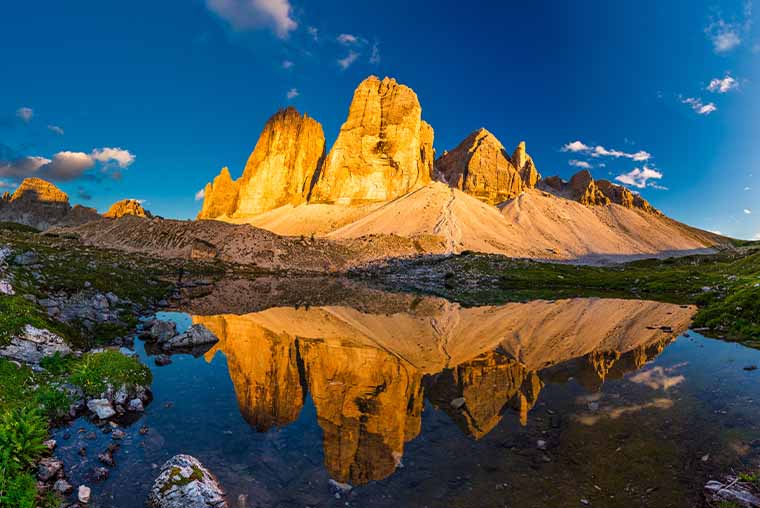
Tre Cime di Lavaredo- 10 essential things to know before you visit
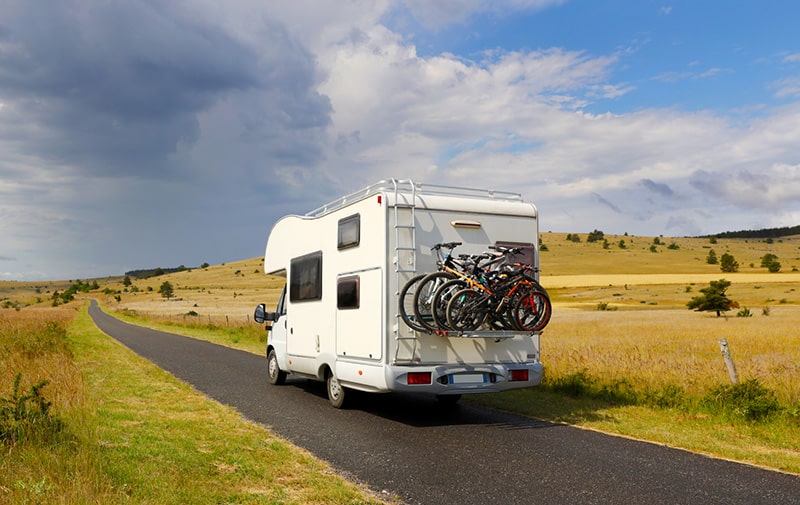
Travelling in a Motorhome? READ THIS before you go!
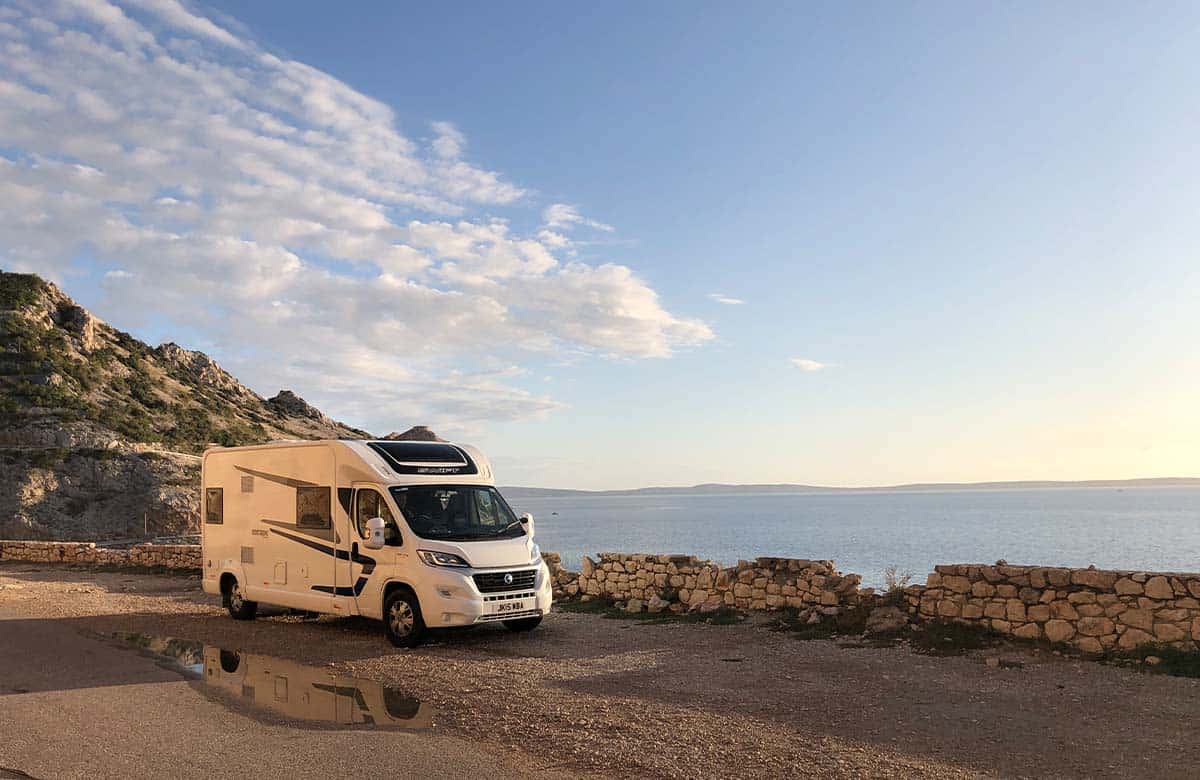
Van LIfe Croatia – 5 EPIC places to visit
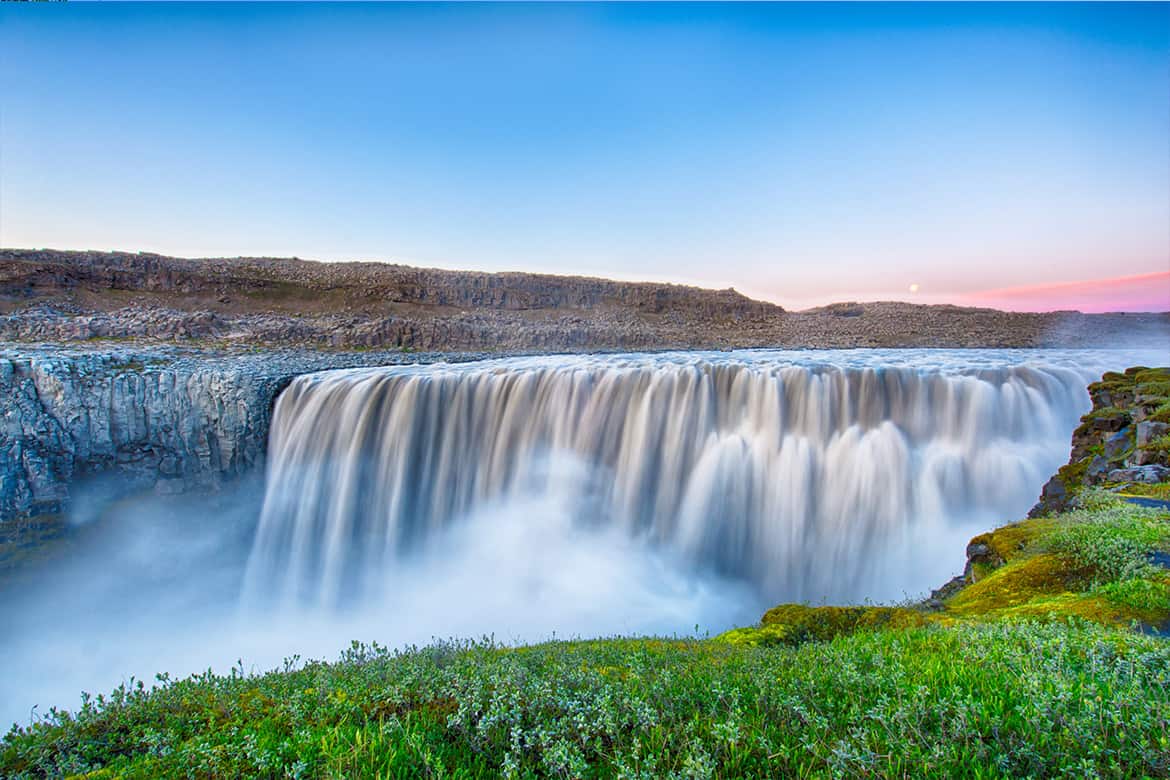
29 most beautiful waterfalls in Europe (with map)
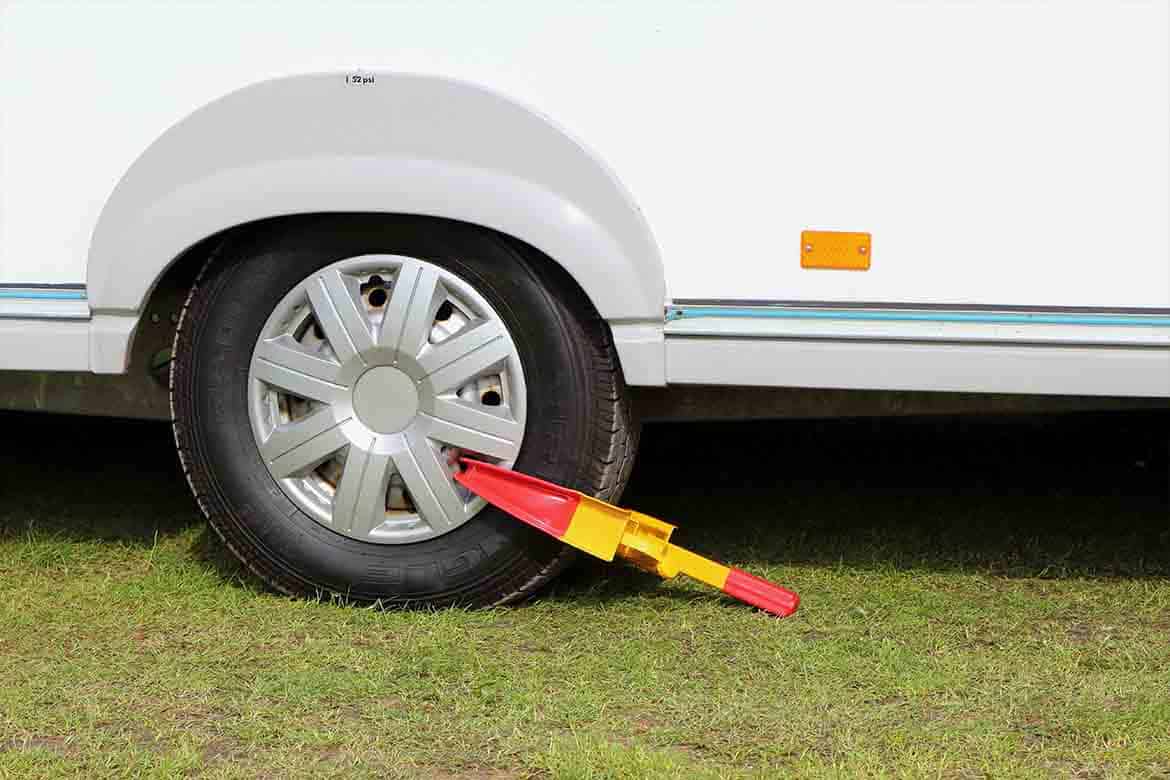
Motorhome Security- 15 essential tips to protect your camper from theft
55 comments.
Lots of great info there. Thank you. 🙂
You’re very welcome! Hope it helps with your upcoming adventures!!
This is fatastic Kat and very timely. We are travelling in September to France & Switzerland in a hired van (before we buy our own yipeeee) so we were just starting to get our heads around all the planning. This is perfect as you have done all the work for us, so thank you so much for that. You are a star 🙂 x
Great information – thanks! When you were wild/free camping, did people have much camping stuff out in the off-season? As we’re going to be in a fifth wheel it’ll be a bit cramped if we can’t push a slide or two out!
People happily sit outside and enjoy a campfire and dinner, but don’t get awnings and things out when they’re wild camping. Those places are more designed to be a one night stop. I think you’ll be fine with the slides, though I admit we haven’t seen any fifth wheels on our travels- you’ll probably have loads of people wanting to come and have a look inside!! 🙂 I think as long as it looks like you’re not planning to stop for a week, you’ll be fine. Of course, if you end up somewhere really remote,you won’t have a problem as no one will see!!
Yes, we’re basically hoping that in the off-season it’ll be quiet enough to pop the slides out and the support legs down. We’re thinking that keeping the truck attached will make us a bit more ‘ready to go’ should the need arise on the aires – though as you say, if we’re somewhere remote and out the way we might stay a bit longer 🙂
Thank you for sharing this journey with us! We would love to pack up and head off in an RV but were hesitant with (coming up) teenage children – I can’t wait to follow your journey and see how you go 🙂
Hi Ange- thanks so much for reading and commenting. Honestly, if I had my time again I’d take my daughter out of school at 12/13 or maybe even a few years younger and travel with her- I think it’s such an amazing way for them to learn and grow. Hope you enjoying following our travels. 🙂
We are from Port Elizabeth, South Africa. My family (me, wife two kids 11, 9) will be hiring a camper for 20 days in December in Munich and plan to drive the black forest route and down to Rome via Switzerland and back to Munich. Do you have any experience of the cold in that time and how hired campers hold up? Will we find sites open that time of the year and do you know if there will be any exciting activities for the kids, with exception of viewing architecture and views? Any other advice?
Thanks for the awesome info!
What an exciting adventure you have planned! Funnily enough, we’re going to Munich in December too! 🙂 As you probably guessed, your experience is going to completely depend on the weather and how much snow has fallen so far. You will DEFINITELY need a camper with heating, so make sure your rental has that fitted (you’d be surprised how many don’t!) You will also need snow tyres/ snow chains- even if it hasn’t snowed. This should be provided- but please check. Also, do you know that most hire campers don’t come with bed linen/ towels and sometimes not even pots & pans? It depends entirely on your rental company of course, but it’s something to check.
If it’s a relatively modern camper with heating, you should be just fine in the cold. You are right that many campsites shut, but if you check out the sites I listed, you’ll be able to find the ones which stay open. Regarding activities for kids, it depends what kind of things they like. Our daughter is quite happy sitting in the van, listening to her music and watching the world go by. There will be plenty of walks- just be careful with the weather. Also, places like swimming pools, leisure centres and bowling alleys will all still be open, as will most theme parks- but please check in advance. You might find many roads in the mountains have been shut but there should always be an alternative route which is open. Hope that helps! Have a great time. 🙂
So just a report back. We didn’t see you In Germany but what an adventure we had. Munich, Black Forest, rhine falls, Lucerne, Italy all the way to Rome and back up to Venice, finishing in Rome. 3300km.
Your advice re the heating was spot on. I can recommend Indie Campers to your readers. They were amazing and friendly. The episode on the parking apps was a game changer. We used Park4night- amazing for piece-of-mind.
Come tour South Africa! It’s great here. It’ll blow your mind!
Keep on camping!
Peter, Susan and kids
AMAZING! Thank you so much for giving me an update- it’s so fun to hear it’s all gone well. So glad you had a great experience. We would LOVE to tour South Africa- what’s the best time to visit to see big cats (a dream of mine!) Take care x
No real best time, they are always around but June, July, August is great for Kruger Park (dry season) which is a must do. It’s a huge reserve which requires at least a week or two to properly see. There are many many sanctuaries though, where they have rescued cats and cubs (cheetahs and lions). Good opportunity to cuddle little hand-reared cubs. If you go camper vanning here, and you have the time, I would begin and end in Cape Town.
Our Neigbours also offer a lot in spectacular views and wildlife. Namibia ?? , Botswana ?? , Zimbabwe ??, Mozambique ?? , not to mention the kingdoms of Lesotho ?? (incorporating the beautiful Drakensburg mountains) and Swaziland ??
We live in Port Elizabeth which has amazing beaches and lovely world class private game reserves and is the gateway to the garden route which takes you back to Cape Town.
I’m presently researching camper hire beacause I haven’t even seen a lot of what I’ve just described to you. I imagine a full round trip would require between 6000 and 10000 km so not for the faint hearted. We drive on the lefthand side (previously a British colony). Van Hire options seem limited (bobocampers, and Maui seem the best) and strangely more expensive than Europe.
If we do take on the endeavor, I’ll let you know.
Great info, thanks for the effort. Lots of details still for us to consider and heating has now become an important one for me.
I assumed the dashboard heater was the only one available and would require you to be driving or idling. What kind of heating is generally available which I should insist upon? Like fuel pellets or gas?…or electric heater to use when plugged in?
Most motorhomes have gas heating and this is preferable if possible. If you have electric heating you won’t be able to use it unless you are plugged in at a campsite- and not all campsites with electric will be open at that time of year. The dashboard heating at the front won’t be enough to heat the back so the kids will freeze- and it will be COLD in December. Like, really cold. I assume the rental company has modern (ish) vans, so they should all have heating throughout. Make sure you have the appropriate attachments to be able to refill with gas in the various countries you are going to- each country in Europe seems to need a different attachment!!
last week i make a tour of europe and get guideline throgh this channel. that is best way. so here i will recommend to others also that before travel please read this article.
Thank you Bella- I’m so pleased to have helped you! How did you enjoy your tour??
Thanks for this Kat – we are traveling from Paris to Rome in October. Our family (2 adults and 2 children who will be 8 and nearly 7) are flying in from Australia and renting a van from Indie campers. We want to stay at the cheaper aires in both France and Italy but we will need power/water, as the van only has 50L of water in it, and we’ll have our iPads and phones to charge and no inverter as we are traveling from overseas, is this possible? Can you suggest in particular?
Hi Heather- that sounds fun! You’ll find many aires/ sostas have fresh water available. Also, you can always pull into one during the day to refill, then drive off again. If you’re careful, 50L might last a couple of days- you may want to buy bottled water to drink. You should be able to pick up a cheap 12v phone/ipad charger- maybe from a garage or hardware shop- this should allow you to charge phones etc as you drive- leaving you free to camp wherever you like! Hope that helps!
Hi, just a brilliant article for all all first timers. You covered everything that one needs to be aware of and I’m extremely grateful. Thank you. One thing though, what is the ‘approximate’ cost of taking this trip? I maybe missed this, so apologies if this was the case. Best of wishes and happy trails for 2019.
Hi Amanda- I’m glad you found the post useful. Costs are difficult to predict as they can include/ not include a variety of things. I broke down our costing for a 2-week trip here- https://wandering-bird.com/cost-tour-europe-motorhome/ which you might find useful. 🙂
Great blog… we plan to travel with 4 young kids for a year around Europe but scared we need a biig vehicle and don’t think it would take well to the roads in Europe
Do you have any experience with American style winnebagos over 8m in length and if we could still get around without too much trouble?
Hi Devon. I don’t have any personal experience with Winnebagos but we have seen a few whilst touring. You’ll need to be very careful where you stop. Length isn’t an issue (we’re over 9m with our trailer), but width might be a problem at aires and even on some campsites. Also take into account toll costs- if you are over 3m in height it increases the toll costs considerably. Good luck!
What’s up to all, because I am truly keen of reading this web site’s post to be updated daily. It consists of good information.
Where the best place to buy the motorhome?
Hi Shon- check out our post on advice to buy a motorhome- you’ll find that helpful.
Hi Kat , It’s me again ….picking your brains ! We are touring for a year but doing it in 4 and 3 month chunks , coming back for 3/4 weeks inbetween each chunk for Xmas and to see elderly parents and sons , grandkids , really struggling to find travel insurance for this type of tour , can you recommend a company that could accommodate us ?
Hi, Really enjoyed reading the advice. We are planning a trip late summer 2020. What is the protocol/experience with a Motorhome for large cities. Where do you park, is it safe to leave at a campsite all day, should you find a campsite near a train station. Is this easy to do, or am I complicating the planning? Thanks
Hi! So pleased you enjoyed the article. We recommend not trying to drive your motorhome into a city (we did that in Edinnburgh- it wasn’t pretty!) Instead, find a campsite (or aire if in Europe) which is near a bus or train station and go in that way. Campsites are generally safer than aires, but take your valuables with you, including passports. We’ve left our motorhome in both campsites and aires all day without any problem whatsoever. Have a great trip!
great blog thanks for sharing.
Thanks for all the info, really helpful. I am planning a trip through Europe August 2020 for my parents and I and we are planning on getting a campervan, we have one here in NZ so we are comfortable with the set up and all that. Just wondering what you think would be best for going into the bigger cities with a Camper, is it best to find a spot outside a city (Rome, Paris etc..) and then train/bus in to sightsee for the day of is it not too difficult to navigate and find parks in the city centres? I figure if we do this we would need to pay for a campgroud so the campervan would be secure while we are sightseeing…???
Hi Kelly! Absolutely- we try to avoid driving into cities at all costs. We went into Edinburgh with our motorhome and trailer… it was not pretty! Most cities in Europe have a campsite nearby or near a train/ bus station. In Europe you can probably find an Aire, where the van should be fairly safe (of course, nothing is guaranteed and read the reviews of the Aire first.) In the UK, you’ll probably need a paid campsite as there aren’t many aires sadly. I hope you have a wonderful time! Let me know how it goes!!
This is so helpful to someone inexperienced (like me). Can you please tell me if winter tyres and/or snow chains are necessary to travel through France and down through Spain leaving before Brexit and returning in March? I am so confused.
Hi Debra, I think I already answered this in an email to you, but if you need more help please feel free to ask. 🙂
Looking forward to planning a year out around Europe in 2020/2021 and have already learned so much from your extensive information, thank you. Now planning to buy a motor home and will be taking all your advice. This will be our travel Bible.
Thanks Erick- let me know how it goes!
This has been a long read but very helpful, informative read it all dont skim through it. Brilliant every thing you need to know this is my first time , going to France I am 74 so have no worries now. Thanks.
Fantastic Keith. You will love France! Let me know how it goes!!
Hey there! We’re about to embark on our first campervan trip in March driving from Tuscany through Italy and France to England. We were going to just use google maps, but do you think a sat nav would def be better? We live in Australia and have done lots of campervanning in Oz and NZ – but never in Europe / UK!
Hey- great question! I think it depends on the size of the campervan. If it’s a small van, no higher than 2m, then you should be fine with a normal car sat-nav or Google maps. If you want to avoid low bridges and tight roads, a proper sat nav is essential- especially in Italy where roads can be a bit… crazy!! Have an amazing trip!!
thanks so much for all this info, we’ve been on the road now for a few weeks and really enjoying it! Would you have any tips for insurers please? We’re currently on our basic insurance that allows us to go abroad for three months but we’re looking for an insurance to cover us for a year or more. We’ve tried Adrian Flux already, which didn’t work. Thanks 🙂
Loved reading this and was hoping to get some help as you guys are pros . In a few months its tge euros football finals and I’d like to do so e of it by campervan. Passing through countries I never would before and watching random games to . Any thoughts on how to plan my route.
I’m guessing get dates of games and do it that way but you might have a better idea,
Thank you any help would be great
this is amazing post thanks for haring information with us
You’re very welcome- glad you enjoyed it
Thanks for this. Great post- I learnt a lot
What’s your opinion on motorhomes that have a place to store a motorcycle vs pulling a trailer?
I think I’d love one… except that we’d lose our end lounge, which we love and also there’s no way we could fit ours bikes inside- they’re both 900’s and way too heavy for the van. But if you’re happy with a smaller, lighter bike and a garage, it’s a great option.
I have been reading several articles on this topic for a while now but the points on which you have built this post are totally awesome. Thanks for that.
Hi, loads of great information which is really helpful to anyone setting out on the great adventure. We started out in 2011 and spent nine years full-timing in our Dethleffs Alpa (rear lounge and a garage!). There’s a couple of things which I think might be helpful. You don’t mention the Efoy system when talking about generators and off-grid power requirements. The Efoy is a silent running 12v generator which is completely “green” and runs on methanol. It’s an expensive initial outlay (about £3,500) but it’s a life-saver and allows indefinite off-grid living. Second thing is, open a Euro bank account with Credit Agricole. It’s called “Britline” and has English speaking helpers. If you don’t want to do that, use a UK credit card which doesn’t charge for foreign transactions. We use Nationwide. Of course, everything’s changed now with Brexit and the “90 in, 90 out” rule which will greatly affect people like us who want to spend most of the year travelling in Europe. If you’re interested in my way of avoiding this restriction just let me know.
Your advices for tours in Europa are very good. We are from Germany and I think you have absolutely nothing forgotten in your guide.
Thank you- glad you enjoyed it. We love Germany 🙂
Great article, we are following a very similar path to yours (living on a narrow boat, I have finished work and my husband is still working for now). Have you any thoughts on the 90 days in 180 rules post Brexit? We “were” planning to leave and not come back for a very long time!
Giving up my job in London in April 2024 to re-start my life with my wife and our dog Dougal, i’m so depressed and need to escape. The work starts now clearing the house out for rental, saving as much money as possible and finding the right camper to buy, we might start off in the UK, travel up though Scotland and then hit Europe for the winter. Our parents are 70-80 and the thought of not being near them when they need us and been holding us back but I have to do it for my own sanity. Thanks for all the tips, I have a lot more reading to do!
Good luck to you! Let me know how it goes 🙂
Leave a Reply Cancel reply
Your email address will not be published. Required fields are marked *
Save my name, email, and website in this browser for the next time I comment.

A Surfer’s Guide to Motorhome Touring in France
A surf trip in a camper van is an incredible way to explore a new location and indulge in the sweet surf break that it offers. France, in particular, boasts incredible surfing opportunities for wave riders of all levels. Motorhome touring in France is an incredible way to enjoy the coastline with your surfboard.
It’s not hard to come by a camper in France, and the biggest challenge that you’ll find is picking the best one for you. The Atlantic coastline is 4,668 kilometers long, and offers unbeatable surfing conditions, throughout the year.
If you want to find out more about the best places to surf every month, read our month-by-month surf guide here.
While some surfers travel in an RV or motorhome, others prefer the versatility of a campervan. Here’s all that you need to prepare for an epic surf trip along France’s motorhome routes.
* Just to let you know that this article may contain affiliate links. If you click on them we might receive a small commission, at no extra cost to you.

Options for Motorhoming in France
Before you map out the route and wax up your board, you need to decide which vehicle is best to meet your needs.
RV (Motorhome) in France
An RV offers space and comfort to kick it after a surf – whether you’re a beginner finding your feet, or a pro shredding tubes.
Benefits of a touring France by motorhome
A motorhome is a fantastic option for traveling in slightly larger groups or families. With more space to sleep and work, a motorhome (or RV) is the perfect home away from home on the road in France.
Where to rent an RV motorhome in France
There is a choice of places to find RV rental. France may boast a few choices, but we recommend Auto Europe . The website has a choice of urban plus motorhomes, family plus motorhomes, and even premium options.
Surfing Campervan in France
Campervans are another great option. Slightly smaller, but equally as effective.
Benefits of campervanning in France
Campervans allow you to travel across France’s gorgeous landscapes with flexibility and maneuverability. A campervan is also a great option because it offers all that you need to live comfortably, without being clumsy.
Where to find campervan rental in France
It’s as easy to find a camper in France as it is to rent an RV. One of the best sites is Van-It , with a selection of campervans available to rent without breaking the bank. There are all different sizes, perfect for an unforgettable surf trip.
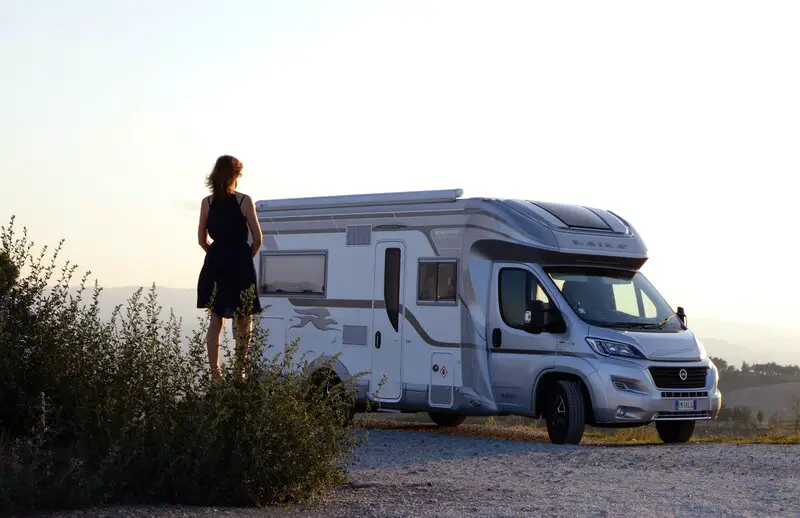
Seven Stops: France Motorhome Routes for Surfers
Once your bags are packed and your fuel tank is full, you can get going. There are so many amazing spots to stop and surf along the coast of France, and we encourage you to take your time. Even so, there are a few spots in particular that we’d like to point out for you to circle on your map.
1. Yport, Normandy
Yport is one of the more popular spots to surf in Normandy. Nearby, Etretat is also a great option. The classic wave breaks as a left-hand point break over flat rocks and promises to be a lot of fun. There are very few crowds meaning that you can enjoy the waves without getting flustered. Keep in mind that swell consistency isn’t the best in Normandy, so it’s best to manage your expectations.
If you’re looking for a place to park your vehicle overnight, then Le Rivage is a fantastic option. Located on the top of the cliff, the spot boasts an epic view and the opportunity to read the waves.
When the swell isn’t working in your favor, then you can explore the little French village Fecamp. The combination of art, history, and the marina makes the spot a charming location for a holiday.
Distance to next destination: 552 kilometers
2. Pors Peron, Bretagne
During the winter months, Pors Peron transforms into a clean, consistent wave. When the conditions are right, the exposed beach break is another surf spot that’s worth adding to your itinerary. Just like Yport, there are few crowds, meaning more waves to go around.
Pors Peron is largely considered one of the most beautiful beaches in Brittany. Camping Pors Peron is a simple campsite that offers everything that you need, without the fuss. They offer great facilities, just a stone’s throw from another beach.
If the waves aren’t working, then you can always drive to the nearby medieval town of Pont Croix. The little town is filled with gorgeous historical sites, delicious restaurants, and captivating culture.
Distance to next destination: 325 kilometers
3. Saint Gilles Croix de Vie, Vendée
Saint Gilles Croix de Vie is home to a much-loved surf spot that isn’t as well known as others. It’s a gentle spot that suits surfers of all levels (and ages). Boasting a fairly consistent beach break, wave riders can shoot either left or right, as long as you don’t mind riding slightly smaller waves.
Camping Les Cypres is the camping ground of choice near Saint Gilles Croix de Vie. In many ways, the camping grounds cater to surfers and share access to both Saint Gilles Croix de Vie as well as La Sauzaie.
While the beach is arguably the biggest attraction in the area, there are other fun things to do in the area. A lot of activities are centered around nature, such as the Le Grand Defi, but there are also many cultural sites to visit, such as the Vendee Miniature Museum.
Distance to next destination: 234 kilometers
4. Montalivet, Bordeaux
Montalivet is a standard surf spot that breaks over a sandy bottom, offering rides to surfers of all levels. There’s potential to get a really long ride, depending on whether you visit when the conditions are right.
Although it’s located slightly further away from the beach, Camping Le Bonheur Est Dans Le Pré is the campsite of choice when stopping over at Montalivet. The extra drive is worth it, as the space is beautiful and serene.
A lot of the attractions in the area pivot around natural beauty. For example, there’s the option to explore the nearby vineyards and empty beaches. The local village of Vendays-Montalivet is also a great spot to grab a cup of coffee or mingle with the friendly locals.
Distance to next destination: 67 kilometers
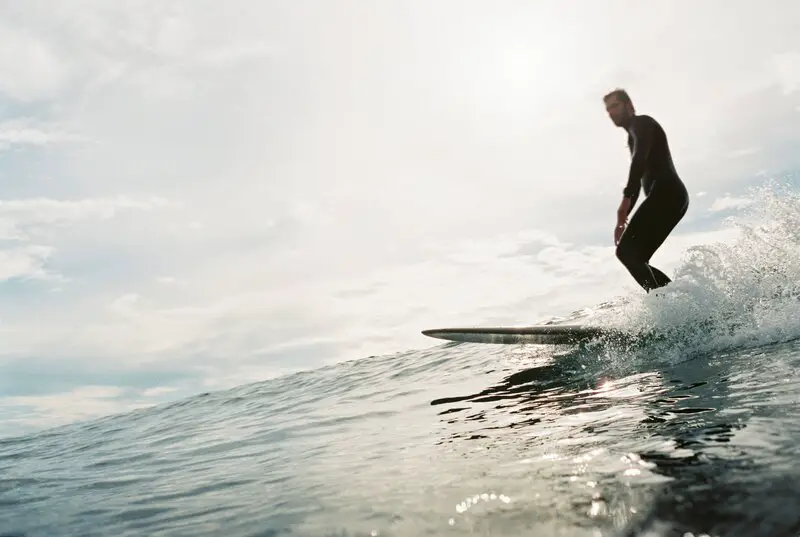
5. Le Porge, Nouvelle-Aquitaine
Le Porge is an hour’s drive from Bordeaux and the surf spot in Le Porge is the perfect place for beginners, with a choice of two schools ready to teach beginners as well. The wide-open beach boasts fun peaks and exposed beach breaks.
La Grigne is a large campsite that can become quite busy in summer. The campsite is within walking distance of the beach and offers a beautiful, forested area to relax after fun in the water.
Even if the swell isn’t working, it’s worth visiting the local beaches in Le Porge. Traveling a short distance in each direction will bring you to Lacanau, Andernos-Les-Bains, and Carcans.
Distance to next destination: 187 kilometers
6. Hossegor
Hossegor is the pride and joy of surfing in France. The consistent wave breaks in four main spots, suited for various skill levels. The entire town is set up around surfing, and there are more than enough surf schools, rentals, and waves to go around.
Want to return to Hossegor at a later stage? Read our blog on planning the ultimate Hossegor surf trip here.
There is a choice of several campsites to choose from in the area. Depending on what you hope to achieve from the trip, you can browse campsites around Soorts-Hossegor and take your pick!
If you’re traveling as a surfing nomad, then there are several places that are perfect to live, work, and surf in Hossegor. Read about them in our blog here.
When you’re not surfing, you can explore the rest of what Hossegor has to offer. Take a stroll in the forest, visit the farmers market, pop into a sunset bar, and grab an ice cream from Café de Paris.
Distance to next destination: 38 kilometers
7. Bidart, Biarritz
There are several spots to surf in Biarritz, but Bidart’s surfing beaches are a great place to start. Choose between Ilbarritz for all levels, Pavillon Royal for experienced surfers, and Erretegia for surfers from beginner to experienced.
There are several camping spots to choose from, some of which are right in front of the surf spots. One of the best campsites is Camping Erreka which offers a bit of luxury in an authentic and natural environment.
The beautiful, coastal town in the Basque country is dripping with culture and offers the opportunity for traveling surfers to immerse themselves. Visit the local golf course, the lookout deck at Rocher de la Vierge, and the Cathedrale Saint-Marie de Bayonne.
Tips For Traveling Through France In A Motorhome
Whether you’re taking a campervan to France from your home, or you’re renting one in the country, there are a few details to note.
- A valid driving license is essential
- Make sure that you have the vehicle’s original registration document handy
- Be careful to stick to the speed limits in France
- Stock up on snacks and water for late nights
- Invest in a portable wifi device if you plan on doing any work on the road
- Keep an eye on the expected climate and temperature to make sure that you’re prepared
France is a fantastic digital nomad destination, especially for surfers. Read more about our top destinations to work and surf around the world.
Bags Packed and Surfboards Ready!
Are you ready for the ultimate surfing road trip through France? Hiring a campervan can save you money and give you everything that you need – as you need it.
Whether you need a larger motorhome for a bigger group or prefer the zippy size of a smaller campervan – France’s surfing coastline is your oyster!
- Ultimate surf van for a California road trip
- Campervan hire in Portugal for the ultimate surf trip

Generated with Pin Generator

Candice Boyers
Candice Land, aka Candi Land, aka The Captain, is a freelance writer, digital nomad and full-time globe trotter.
5 Best Portable Keyboards for Travel: A Guide for Digital Nomads
Five inspiring digital nomad podcasts for remote workers, you may also like, 5 incredible surfing beaches in the indian ocean, best places to surf in europe, 5 best surf spots in the eastern cape,..., gul wetsuit sizing guide for avid surfers, best surfing in florida: a five stop itinerary, hurley wetsuit size chart and guide, o neill wetsuit size chart and guide, eco surfing tips – how to practice sustainable..., the best surf poncho: changing robe for surfers, the best beach boards for all ages.

What are you looking for?
10 best campervan & motorhome/rv rentals in france.
France really is an epic place to hire a campervan and explore.
There are so many excellent French road trips to be had. And though renting a car in France is appealing; having a camper does offer maximum flexibility.
You have everything from exquisite campsites, charming vineyards, wine and cheese markets, as well as a rich history to dive deep into.
There are also TONS of campervan and motorhome rentals in France, so choosing the best one might feel overwhelming.
But it doesn't have to be!
I’ve done a deep dive into the best companies in the country, so you can find the perfect one for your trip.
Let's get started.
Travellerspoint
How to book your French motorhome or campervan rental
Due to the nature of how big and how popular France is, certain hire companies are only available to rent from in certain cities and airports.
And as it's such a popular road tripping destination, many firms do book up well in advance .
So sifting through the various companies, looking and prices, checking availability and then requesting a booking can be extremely awkward.

They are our absolute number one choice for where to begin your campervan or motorhome rental search .
They feature all of the biggest and best rental firms France offers, and allow you to easily filter by things like location, price and, best of all, your travel dates.
On top of this, another reason we love GoSee is their customer service. By booking with them you get:
- 24/7 support - If you have any issues with your booking, at any stage from payment through to completion, they are on hand to assist.
- Vehicle Guarantee - No other firm can offer this! If, for any reason, your vehicle booking becomes suddenly unavailable (for example due to an accident in the vehicle and no other vehicles are on offer by your chosen company), then GoSee will personally arrange a new rental!
- Best prices - With a price match guarantee, and unmatched selection of French campervans, there really is nowhere cheaper to book.
- A respected brand - They've processed more than 3 million rental days over the years, so they come tried, trusted, and respected by thousands of other campers.
For more info, read our in-depth review of GoSee Travel (Motorhome Republic) .
1. McRent - Our top pick for France campervan & motorhome hire
- Pick up/drop off location/s - Paris, Lyon, Nantes, Poitiers, Rouen
- Price range - $$-$$$
- Best suited for - Families
- Availability - Check here

If you’re wondering about our top pick, look no further than McRent .
They are the largest motorhome rental in all of Europe , and a safe and reliable bet.
It has stations in five regions in France, which means you can easily pick up your vehicle from any corner of the country.
They’re also great if you’re thinking of driving across multiple countries in Europe, including the UK .
McRent is also big on sustainability !
From treating people and the environment with utmost respect, to supporting local non-profit organizations and young athletes.
For those wanting to travel consciously, this can be a great choice.
Vehicles on offer:
McRent offers vehicles that are 2 years old at most , which means all their motorhomes and campervans are in excellent condition.
They come with a kitchen, fridge, gas stove, heating, and, often, a bathroom.
You can find vehicles from leading brands like Dethleffs and Hymer.
Better yet, there’s also a 24/7 mobility guarantee .
2. Outdoorsy - Best camper rental marketplace in France
- Pick up/drop off locations - Everywhere!
- Price range - $-$$$
- Best suited for - All travellers

Outdoorsy is unique for rentals in France, in that it connects you directly to locals who own their own campers or motorhomes.
Meaning in turn you have far greater options in terms of vehicles on offer and locations for collection.
Think of it sort of like the Airbnb of camper rentals.
Outdoorsy connects you directly with local people, whilst also offering comprehensive insurance, breakdown and other types of important cover for any safe and reliable rental.

Almost everything!
That's the great thing about Outdoorsy is that the range and availability of vehicles to hire is almost endless.
People will have everything through from self converted campers right through to huge off-road 4x4 vehicles for true exploring.
Or if you want to find a great value, traditional motorhome, then there are tonnes of these as well!
With dozens of useful search filters, you can quickly narrow down whats available based on things like:
- Hire location
- Your budget
- Number of passengers
- Type of vehicles
3. Auto Caravan Express - Best motorhome rental in France and Europe
- Pick up/drop off location/s - Paris Charles de Gaulle Airport
- Price range - $-$$
- Best suited for - Couples and large groups

While Auto Caravan Express doesn’t have a physical branch in Paris , a rep can bring your vehicle to the airport for you.
It’s all super convenient as you can sign any documents and make payments right during the pick-up.
Other than France, you can also arrange pick-up and drop-off at any airport in Europe !
In terms of rental period, there’s a minimum of 7 days for unlimited mileage.
But you can always rent a campervan for the weekend for a maximum of 800 kilometers.
The best thing about Auto Caravan Express is that their fleet focuses on modern comforts.
Even the small two-people van comes with a functional kitchen and bathroom.
The wood panelled interiors are very soothing and beautiful too!
You can even go on an epic trip across France with up to three couples in a motorhome from Auto Caravan Express.
Better yet, the RVs here are either brand-new or a maximum of two years old.
4. Van-It - France campervan rental with the most pick up stations
- Pick up/drop off location/s - Over 18 regions, including Paris, Provence, Lyon, Annecy, and Bordeaux
- Best suited for - Couples and groups

Van-It boasts among the highest number of pick-up stations across 18 regions in France.
Not only that, it is also the first campervan hire company in the country !
It has operated since 2018 and is known for its variety of vehicles.
From weekend getaways to longer trips, you can probably find the perfect campervan for you here.
Specializing in Volkswagen combis, it’s easy to imagine a scenic adventure as you dive into the beauty of France.
Whether you want something small for a romantic road trip with your significant other, or a more spacious campervan for small groups, Van-It’s fleet can lodge between 2 to 5 people.
There are also converted trucks and minibuses . Complete with off-grid campervan electrical systems .
When booking your campervan, you can request a variety of add-ons too. From a GPS kit and baby seat to a bike rack and roof tent!
It’s super easy and convenient to adapt the vehicle to your personal needs .
5. Big Sky RV - Affordable France campervan rental
- Pick up/drop off location/s - Rueil-Malmaison in Paris
- Best suited for - Any traveller

Big Sky RV is a reliable motorhome rental in France that can easily help you live out your road trip dream.
The only downside is that they don't have a transfer option, which means you need to get to their depot yourself.
It’s located at Rueil-Malmaison, a commune in Paris around an hour’s drive away from the airport.
Moreover, the depot opens only at certain times on weekdays and Saturdays, so make sure you double check.
Big Sky Motorhome has a pretty large fleet.
You can choose from standard minivans to mid-sized RVs and spacious, luxurious models.
Another great thing about their vehicles is that even the small two-berth vans come with a toilet and shower !
Their campervans and motorhomes are also quite new and recent. None of them are more than a few years old.
6. Avis Car-Away - Leading motorhome rental specialist in France
- Pick up/drop off location/s - Paris-West (Rueil-Malmaison), Marseille, Nice, Toulouse, Lyon, and Corsica

Avis Car-Away dates back to 1979 and has since worked its way up as the market leader in the motorhome rental industry in France.
In terms of locations, there are plenty of options that allow you to pick up or drop off your motorhome across the country.
Don’t worry about safety either, as you’ll get equipment like a fire extinguisher, warning triangle, and high visibility jacket.
Also, Avis Car-Away is the perfect option if you have a pet!
All the motorhomes at Avis Car-Away are recent models and 18 months old at a maximum.
They are maintained regularly and go through mandatory service checks before each rental.
There’s also a range of sizes and styles depending on what you’re looking for.
From compact 2-berth vans to large motorhomes that can sleep up to 6 people.
You might also like: Best Campervan Accessories
7. Yescapa - Popular Outdoorsy alternative
- Pick up/drop off location/s - Paris and Lyon
- Best suited for - All sorts of travellers

The sheer variety that Yescapa offers is truly incredible. Whether you’re travelling with a significant other or an entire group of friends, there is doubtless something for you.
You can rent a motorhome in France and explore various corners of the country or even travel across Europe.
This site will connect you to the RV owner directly , which is great because this personal connection can be an essential part of travelling.
Not to worry about any issues when driving your new van, thanks to the 24/7 support and trustworthy insurance program .
On Yescapa, there are over 10,000 vehicles to choose from.
You can browse through a multitude of options ranging from small RVs and campervan conversions to large motorhomes fit for an entire family.
Some of the vehicles even allow pets , which is great for those travelling with a furry friend!
8. Road Surfer - Most youth-friendly campervan rental in France
- Pick up/drop off location/s - Paris, Bordeaux, Aix-Marseille, Toulouse, Geneva, and Lyon
- Best suited for - Young adults, groups and families

You can rent from Road Surfer if you’re at least 18 years old , which is great for the young adventures out there.
With six pick-up and drop-off locations throughout the country,
Furthermore, their vehicles are available for a minimum of 3-night rent and come with 24/7 roadside assistance.
There’s also no cleaning fee!
This campervan rental company is also big on sustainability.
Not only do they encourage guests to camp sustainably, they also work with organisations and arrange clean-up programs.
From couples to groups alike, Road Surfer offers an array of motorhomes from leading world brands.
This includes models from VW, Mercedes, and Ford.
You can even try the Camper Cabin, which comes with a unique two-room concept and lots of standing space.
On some of their vehicles, you can enjoy the luxury of a bathroom and warm shower right inside the van.
But the best thing of all is that all their campers have a first registration that’s less than 24 months old .
9. Black Sheep - Go-to campervan rental in France for all travellers
- Pick up/drop off location/s - Various locations, including Paris, Annecy, Lyon, Nantes, Rennes, and Marseille

Another campervan rental in France that offers an astounding range of locations is Black Sheep.
With an extensive list of cities, you can easily pick up or drop off your rented campervan from virtually anywhere in the country.
Black Sheep has four tiers of insurance, including the free standard package to the All In Pack, which insures multiple drivers .
But our favourite thing is the fact that it’s ideal for all kinds of travellers on any budget .
Not to mention the 24-hour assistance for added peace of mind, and the flexibility to cancel bookings without charge .
Choose from a range of vans, converted vans, and campervans , depending on your travel style.
From the California Volkswagen range and the rugged Marco Polo to the more affordable Campervan Mini.
The vehicles can sleep anywhere from 2 up to 4 people.
Some of them even flaunt a fancy built-in shower so you can keep clean while on the road!
10. Oulala - Best luxury campervan and motorhome rental in France
- Pick up/drop off location/s - Any airport or train station (office at Le Lonzac)
- Price range - $$$
- Best suited for - Groups and families

For those wanting the five-star motorhome experience , look no further than Oulala.
This luxury motorhome and campervan rental blends lavish comfort and adventure so you can experience the best of France in the most relaxing way.
Oulala also offers airport transfers and vehicle collection from any airport or train station you want.
The highlight is their unequaled route planning service , where they give you incredible insights to the most stunning place to visit.
They will even help you plan a trip across the border into Spain, Andorra, Monaco, Belgium, Luxembourg, and Switzerland!
When you rent a campervan from Oulala, you can enjoy unlimited mileage .
There are various name brands including Fleurette, Sunlight, and Challenger. Most of them can sleep around 5 to 6 people, so we’d recommend this rental for groups and families.
Their motorhomes feature a spacious living space, smart technology, exquisite furnishing, and added luxuries.
Not to mention the small yet great details like bluetooth speaker, BBQ kit, a coffee machine, as well as outdoor chairs and table!
France Campervan / Motorhome Hire FAQ
How much does it cost to rent a campervan in france.
The cost of renting a campervan in France can really vary, depending on a lot of different factors. This includes the type and size of campervan, the time of year, as well as availability.
But you can expect to pay around £100 per night for a 4-berth vehicle. The cost could be lower at around £60 for smaller vans and older models, or even higher for more luxurious motorhomes.
Can you wild camp in France in a campervan?
Wild camping is a legally grey area, but is generally tolerated. The good news is that France is super welcoming to campervans and motorhomes, so it’s super easy to find free parking in popular destinations and national parks.
Where can you go with a motorhome in France?
The best thing about travelling France with a motorhome is that you can go virtually anywhere! This includes sprawling coastlines, charming towns, large cities, and even Paris. Just be aware that you probably can’t drive it in the city center, but everywhere else should be accessible.
France is among one of the best countries in Europe to road trip in, as you can explore various things like beachside camps, vineyards, and local markets. From Annecy to Lyon, there is truly no shortage of places to go with your motorhome!
How old do you need to be to hire a motorhome in France?
When hiring a campervan in France, the typical age requirement is at least 25 years old. You can find certain companies that will rent to 21-year-olds, but you may need to pay a little extra for insurance purposes. Some rental providers even require drivers to be at least 30, so don’t forget to check!
Can you park a campervan anywhere in France?
You can pretty much park a campervan in any public land in France, aside on the coasts, historic sites, and protected natural spots. It may even be possible to park on private lands as long as you have permission from the owner!
Time to plan your road trip to France!
We hope you were able to find the perfect campervan rental for your next great road adventure in France. It’s now time to plan for the rest of it!
Here are a couple of our favourite guides to help you organise an unforgettable France escapade. From the best road trips to undertake to fun things you can do!
To get started, you may find these useful …
- The Best Places To Visit In France
- Things To Do In Rouen, France
- How To Spend One Day In Paris

Leave a comment
Let us know what you think.

5 million people can't be wrong

6 week France summer road trip in our Bongo campervam
Posted on Last updated: 10 March 2024
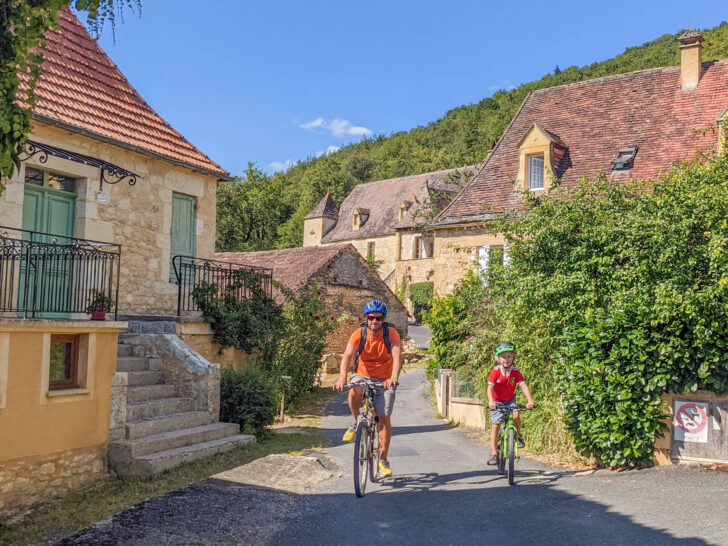
2021 was another summer of uncertain travel due to the global pandemic. Travel restrictions were changing constantly and it was exhausting keeping on top of all the various rules between countries. But road trips are what keep our soul alive and whilst many families opted to stay in the UK, we decided to take the plunge and head over to France in our Mazda Bongo camper for the entire school summer holidays.
Disclaimer: In return for an honest review published to this website and social media coverage during our trip, Eurocamp Independent provided complimentary camping and Eurocamp provided a complimentary one week stay in one of their chalet. As always, these are all my own words. Also, this post contains affiliate links. Should you click to purchase, it is at no additional cost to you, but I receive a small commission.
Well not quite the entire summer holidays. The boys’ bubble burst at school just a week before we were due to sail. So we had to isolate, and move our ferry crossing back a week to keep in line with French rules (so that we knowingly had not been in contact with a covid case in the past 14 days).
If you’ve been following our blog for a while, you know that we love France; not just for the weather, culture and wine (of course!), but France really does have some of the best family campsites in the world.
In the years that we have lived in the UK, we venture over to France at least once per year. In 2020, despite all the restrictions, we managed a two week France road trip to the Loire and the Vendee ( click here to read about that trip). And in 2019, which was pre-Bongo, we spent a month travelling around France with our Vango air tent ( click here to read about that trip). And there have been many more trips before this and since.
But this 6 week camper road trip in France was the longest we’ve spent in France in one go, and was honestly the best. After 18 months of restrictions, lockdowns, tiers, and school closures, we had a renewed appreciation of travel. I cried when we finally arrived to Dover Port for the ferry to Calais . I cried again when we cycled through the Alps on that first day. I cried again when I saw my boys on stage singing French songs with their new French pals from kids club. And I cried again on the ferry home, knowing how lucky we had been to have experienced such an amazing summer together, and that travel was still uncertain for the foreseeable.
Jumping through all the hoops to get to France (and back!) and dealing with all the pre-trip anxiety as we witnessed Boris and Macron bicker on the news, was absolutely worth it.
READ: Top 10 tips for driving through France
Our 6 week camper road trip in France
We’re a family who embrace slow travel and tend to only spend around a week at each campsite.
Both us parents were working on occasion during this trip (we both work remotely) and so this style of travel meant the kids could go to Kids Club, plus we really got to know a place well and feel at home there.
If you do plan to work in France from overseas, then don’t forget the VPN for travel .
Week 1: The Alps
Camping at: Camping la Rencontre du Soleil
Surrounded by 3000+ metre jagged peaks, in the heart of The Alps, a stay at the quiet Camping la Rencontre du Soleil is all about the views. The local village of Le Bourge-d’Oisans and the challenging switchbacks up to Alpe d’Huez often feature on the Tour de France , and during the winter, this is a premier skiing destination.
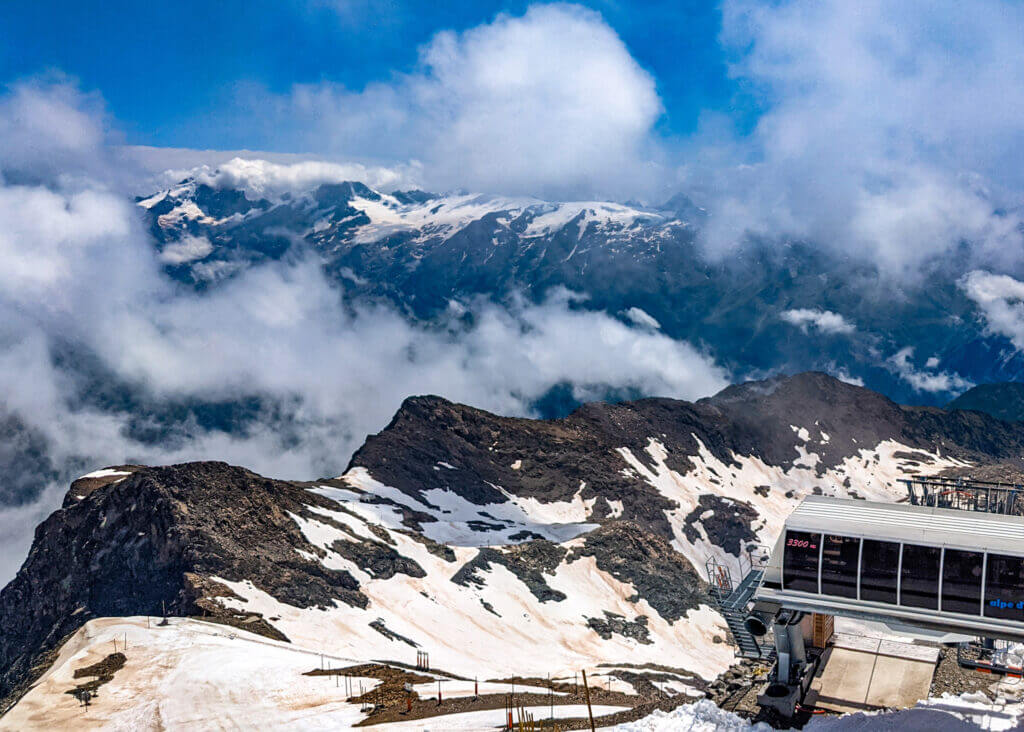
Does this mean you need to be a super fit mountain biker to fully appreciate these views? Not at all. Directly from the campsite are traffic-free, FLAT, cycle paths along the Romanche river that are perfect for kids, affording absolutely jaw-dropping views with snow capped peaks even in the height of summer.
Or if you want to experience some altitude hiking without an epic uphill struggle, drive the 25 minutes up to the cable car station at Alpe d’Huez and ride up to the summit of Pic Blanc at 3330 metres. Just incredible.
Camping la Rencontre du Soleil is a small, quiet campsite, and the perfect base for adventure loving families. Onsite there is a small swimming pool (no slides), a ball court, a restaurant (also serving takeaways, including amazing pizzas), small playground and a kids club.
Click here to read more
Week 2: Languedoc-Roussillon
Camping at: Les Sablons
Situated on the sun-drenched south coast of France’s Rousillon, close to the historical city of Béziers, Les Sablons is more of a village in its own right, than a campsite. There is everything you need on site to never have to leave, from a well stocked SPAR supermarket, a bar and restaurant, a swimming pool complex with waterslides, a huge play area and direct access to the beach. There is also an abundance of activities laid on throughout the day to keep all ages busy.

But if you can tear yourselves away from the onsite facilities, there is a fantastic cycle path (flat and traffic-free) along the Canal du Midi, which is easily accessed from Les Sablons. Stop at the locks along the canal to watch the boats passing through, pop into the quiet and pretty village of Portiragnes, or cycle the 14km all the way to Béziers.
But what kept me very happy was our private washblock! On the corner of our spacious pitch we had a shower, toilet, large fridge-freezer and wash basin ALL TO OURSELVES! This is the absolute height of Bongo camper luxury, and something we’ve only experienced before in camping in Namibia .
Week 3: Languedoc-Roussillon
Camping at: Camping de la Plage, Sainte-Marie
With the name Camping de la Plage , you can take a reasonable guess that this campsite is right on the beach. And what a beach it is; an endless stretch of sand hugs the gently lapping Mediterranean shoreline, backed by swaying palm trees, and views of the Pyrenees marking the Spanish border in the distance. Plage de Sainte-Marie is accessed directly through a security gate from the campsite, and further along to the right are a selection of beach bars and restaurants radiating that holiday in the sun vibe.

The campsite itself continues the chilled out vibes from the beach. It’s a medium sized site, and in places it does feel rather dated, although this fits with its laidback charm. We found the staff here particularly friendly. And the pool area is fantastic.
Week 4: Atlantic Coast
Camping at: La Cote d’Argent Campsite, Hourtin-Plage
Situated in a shady pine forest that lines a seemingly endless stretch of a powder-soft sand buffeted by the Atlantic waves, the location of La Cote d’Argent Campsite is pretty perfect. Spend your days surfing or jumping in the waves, or hop on your bikes and enjoy the traffic-free cycle paths that weave through the pine forest to inland lakes. But do allow for some days onsite, as kids will love the pirate waterpark, the huge playground, and there’s also a great Kids Club onsite (for age 6+).

Week 5: Dordogne
Camping at: Le Moulin de Paulhiac Campsite, Dordogne
Sometimes a campsite takes a while to grow on you, and sometimes you love it as soon as you pull in. Le Mouline de Paulhiac Campsite in the Dordogne of Southern France definitely falls into the latter category.
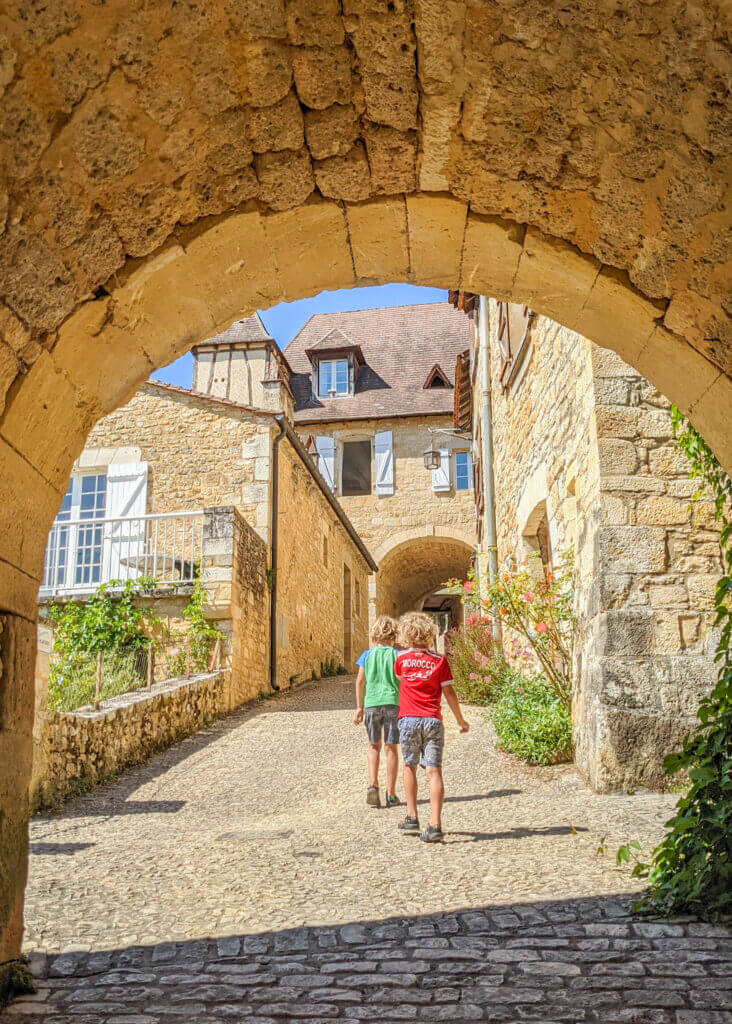
Set in a quiet valley along the meandering River Céou, Le Mouline de Paulhiac Campsite is a medium/small site offering a relaxed pace, large and shady pitches, and a lovely sized swimming pool with water slides and splash park. There’s a restaurant onsite that overlooks the playground (very hand for parents wanting an extra drink in peace) and the river is a fantastic place to take your inflatable and slowly float down the river from one end of the campsite to the other.
Geared to younger children (aged 8 and under), Le Mouline de Paulhiac Campsite is a very relaxed site where your days are spent lounging by the pool or on the river, and visiting quaint local towns and villages.
Check out our guide to visiting the Dordogne with kids
Week 6: Loire Valley
Camping at: Le Château de Chanteloup Campsite, Loire
Ever fancied camping in the grounds of a French chateau? There are a handful of campsites in the expansive Loire Valley where you can do just this, but Le Château de Chanteloup Campsite set in 50 acres of parkland is perhaps the most idyllic and peaceful of them all, and with it’s woodland playground and summer kids club, it’s a great French campsite for families .

This was the final stop for us on our 6 week road trip around France in our Mazda Bongo camper . We stayed 5 nights from the 30th August, right at the end of the summer season. By the time we had arrived, the autumn leaves had begun to fall from the towering oak trees and summer kids club was finished for the season, but the afternoons were still beautifully warm for a dip in the pool and the restaurant remained open.
This is a beautifully quiet and idyllic site. I’ll be honest, on arrival I was a tad nervous that our two boys (age 6 and 7) were spoiling the peace for some older campers without kids. But with all the woodland to explore and the fantastic playground area, there is more than enough space for kids to burn off some energy.
The facilities here are excellent and in keeping with the chateau. You will find a swimming pool, woodland playground, basketball court, rowing boats on a small lake, table tennis, and even goats!
Check out our guide to visiting the Loire with kids
Want to extend this trip and head into Spain?
Check out our Northern Spain road trip itinerary , which goes from Santander to Barcelona and the Pyrenees.
FAQ of this trip
I received so many questions about this trip. Click here to watch the Insta-live where I answer the following questions:
1. Which ferry crossing did we us and was it expensive? 2. How did we choose campsites and where to go? 3. What was our favourite campsite? 4. How did we work on the road? 5. Kids clubs – how much were they? How did our boys cope with being the only British kids? 6. How much did we spend? Fuel, campsites, food. 7. How much in advance did we book? 8. How do we fit everything into the bongo? 9. How did we deal with the heat and mosquitoes? 10. What are the toilets like on site? Can people hear you having a poo? 11. What did we do about buying and cooking food? Any tips on good meals that all the family like? 12. How do we live in such a small space and not wind each other up? 13. What items could we not have done with? 14. What would we do if we broke down on the road? 15. Do we really like the French ‘mega campsites’ after Africa? 16. Did we miss friends and family being away for so long?
You may also like to read: Road trip from Calais to the Pyrenees and back All about our Mazda Bongo Camper The BEST family campsites in France

Driving a motorhome in France: Basic facts to help you drive safely
When you make purchases through links on this website we may earn a commission. Read more .
Driving a motorhome in France (under 3.5 tonne) can be tricky if you aren’t used to driving larger vehicles. If this is the first time driving a left-hand-drive vehicle on the other side of the road and in a foreign country, then the level of complexity increases.
Planning for this part of your journey ahead of time can improve your confidence, get your head in the right space, and alleviate many of the anxieties, frustrations and even fear that you might otherwise feel.
We have written this guide to allay these concerns as much as possible by providing the facts and some of our tips, gathered through over 25 years of driving large motorhomes “on the opposite side of the road”.
As we travel around in our motorhome, we often meet many people who tell us they would love to do a motorhome road trip but are too terrified to drive. Others have been frightened by people’s overzealous stories in online forums about how difficult it is to drive in France and in Europe in general.
It’s true. There can be times when driving a motorhome in France can be a bit interesting, to say the least, and there have been times we’ve found ourselves on some roads and in some locations we’d have preferred to avoid. But these are the exceptions. Most of the time, our driving in the motorhome is a breeze.

Important paperwork for motorhome travel
Pre-travel planning, equipment required by law, crit air stickers for low emission zones in france, tolls in france, road rules in france, general tips for driving in france, more motorhoming in france resources.
While we generically refer to this section as relating to paperwork, items can now be kept and shown using a smartphone or email. Whichever way you carry your paperwork, be it in physical form or digital, just be sure to have it and be able to access it when required.
- Passports and visas- these go without saying. You need them to travel, and you need them to prove your identity in other countries either to the police, to hotels, campgrounds etc. Depending on your nationality, you may need a visa to enter France either immediately or if you are staying longer term. In the post-Brexit era, there may also be a further requirement of UK residents to carry additional paperwork. This is still a work in progress.
- Emergency contact details – Have this handy somewhere should someone else need to contact you. If you are travelling in a motorhome, it’s a good idea to have a note written and placed either in a conspicuous place in the cabin or in the glove box.
- Travel Insurance – we always recommend having travel insurance to cover a range of incidents that could occur while you travel.
- Driver’s licence – Generally your own driver’s licence is enough but many people still advocate having an International Driver’s Licence. Some rental companies still require it as part of their hire conditions. The internet is full of opinions on these, and we have our own, but we will say here, do your homework and be satisfied with your decision and the risk (or lack thereof) it might involve. You must be over 18 and hold a full open driver’s licence.
- Medical paperwork as it is relevant to you and your travel. Once again, in an emergency, this could be very helpful. Take note of any current (or changing) requirements relating to medical situations in the countries you are travelling in.
- Crit air sticker – if you plan on driving through any of the low-emission zones in France, you may need a sticker. Read our comprehensive guide on everything yo need to know about crit air stickers in France .
- Relevant vehicle paperwork – If hiring a motorhome , ensure that you have roadside assistance included in your hire; know where the paperwork is and how you can contact them if required. The same goes for insurance (carte verte), registration papers (carte grise in France) and if coming from the UK V5Cs and green cards. It’s also a good idea to have the contact details for the hiring company too. If you own your motorhome, you should have all your own paperwork relating to ownership and registration of your vehicle as well as details on your roadside assistance company.
- If you plan on using the France Passion network , ensure you are a paid-up member and have the sticker on the windscreen. If you are a member of any camping associations, have your membership details with you.
We highly recommend having a mobile phone with access to data and voice calls in the event of an emergency. If you have a smartphone much of the above information can also be saved to it. We use and recommend Maya Mobile eSims .
When people are away from home for a period of time, it’s fairly usual to remember to pay certain bills in advance or do what many of us do these days and have our bills on direct debit. This makes travelling very easy.
Often, when we travel we always seem to have some important business going on at home. Many times it’s been important property transactions that just seem to always settle when we are away. As such, we do some planning before we leave to ensure that we will have access to everything we need.
This includes access to online banking, having e-signatures ready for anything that needs signing and appropriate instructions in place at home (e.g. banks, lawyers).
If you are planning on transacting when overseas as a minimum you should ensure the following is possible.
- Ability to send outbound emails from another country. While this might sound completely ridiculous, we have had this issue in the past. Many years ago, our Australian email would only allow us to receive emails and not send them. We didn’t even think to check this and it caused enormous issues. This same company still has the same process, which defies belief in this digital age. Needless to say, we changed providers.
- If you are not using your usual mobile sim overseas (more of an issue with non-European, non-UK residents), be aware that any two-factor authentication messages normally sent to your mobile won’t be received unless you turn on global roaming or have access to wifi for wifi messages like iMessage. Failure to be able to get these verification codes could mean you can’t access your cash. We also recommend having an authenticator app on your phone – like Google – so that all you need it wifi, not your phone number, to get your codes.
- If you have a local sim, update any of the important online profiles you use with the temporary number. Advise friends and family back home of your new number as well.
- Be aware of transfer limits for online banking and payments and have any changes made ahead of your travel. Also, remember that most online banking and other website access relies on two-factor authentication (2FA) these days. If you know that you need to get a code before you can access your information, ensure you have access to that device (either email, phone or 2FA number off an authenticator app). If you don’t use your normal phone number, the codes will go to your phone and you won’t be able to access them. If you have iMessage on an iPhone and have wifi connection, then you will be able to get your codes. It’s worthwhile checking all of this thoroughly before you leave.
- If you are using a money card or a new credit or debit card, ensure it is activated before you leave. We use and recommend Wise for all of our international currency and debit card that works easily in other countries.
- Download any apps you might want to use while you are at home and have access to good internet.
- Download any movies, games etc from providers such as Netflix. They are a great way of keeping yourself amused without requiring data.
These days, much of this can be overcome with complete access to data connections, but it just pays to think all of this through carefully. In a worst-case scenario, have someone at home that you trust who can transact on your behalf where possible.
There’s a lot of equipment to carry when you are doing a trip in a motorhome and much of it is at your discretion. However, there are several items that are mandatory, as required by European law.
- Warning triangle – Must be used in the event of a breakdown.
- Reflective vests – Have one onboard for every traveller. If you are standing out on the road working on your vehicle or waiting for roadside assistance to arrive, you need to be able to be seen.
- First aid kit
- Fire extinguisher
- Headlamp converters – May be required for UK registered vehicles
- Snow chains are compulsory in some European countries in winter
- In some European countries, like France, a signal board is required when carrying bicycles on a rear bicycle rack
Note – it is NOT mandatory to carry a breathalyser kit in France any longer. The relevant law was scrapped in late 2019.
More reading >> Read our comprehensive list of equipment for your motorhome ?
Do I need a crit air sticker to drive in France? This has become a common question asked by all travellers who are planning to drive their own vehicle or one they’ve hired.
We won’t go into all the detail here; it would take too long. But you can read our comprehensive guide on crit air stickers here . This guide gives you all the specific details about what crit air stickers are, whether you actually need one, where to buy it and how to use the French government website. There’s a lot of misinformation on the internet, so use this as your up-to-date guide.
If there’s one thing that can easily raise the heart rate of a motorhome traveller in France (or further afield in Europe) it is tolls. More specifically, it’s getting stuck on a toll road and having to pay when you had no idea they even existed, or that you were on a toll road. The anxiety rises if you get to the payment zone and don’t have any money or a toll transponder.
Taking a toll road is great for expediency, and there have been times when we have used them for this purpose. The cost of the toll also cancels out, sometimes, the cost of it taking longer to drive on the smaller, less efficient roads.
However, be mindful that driving a motorhome puts you into one of the higher classes, meaning that tolls can be upwards of €50 depending on where you are driving.

France has many autoroutes, the name given to the main arterial highways linking the major cities all over the country. As far as a piece of infrastructure goes, they are magnificent pieces of work, allowing for the mass transit of vehicles, often at a very fast pace.
Most of them are privately owned, hence the toll. So how do you know what is and isn’t a toll road? These days, most of the online mapping tools and apps we use will tell us where the toll roads are and allow us to change settings to avoid them.
In France, as a general rule, it will be those roads with an “A” prefix. Note however that some of the A roads in the north of France remain government-owned and as such currently do not attract tolls.
On the roads themselves, the toll roads are designated by blue signs. Other main roads have green road signs.
Along the autoroutes or as you are about to enter one, the word péage will be visible. This is another clear indication that the road you are about to drive on or enter is a toll road. In French, péage means toll.
Toll tickets
Upon entry to most toll roads, machines generate a ticket that indicates the date and time you entered but most importantly, where you entered. This is important because you will be paying for the distance driven. The longer you stay on an autoroute, the more you pay.
If you don’t get a ticket, this can still be completely normal. Certain toll roads don’t charge for the distance and have a fixed rate for the journey.
When you get your ticket, put it somewhere safe. I know this sounds a little weird but it’s amazing how many stories I’ve heard of people either throwing it away, or losing it in a very short space of time.
You need to be able to find the ticket when you reach the pay station at the end of your trip on the autoroute. Failure to produce it will see you paying the maximum amount,
How to pay for tolls in France
Locals use electronic transponders called télépéage. These are by far the most efficient way of using the French toll roads. Each trip is recorded, you can sail through the toll gates without having to stop and worry about making a payment and there are various payment methods you can use to settle the account.
If you are planning on spending a long period of time in France or using the toll roads a lot, or both, definitely investigate this option.
Note however that to set up a Télépéage account you need to have a European Union bank account which will possibly rule many people out.
UK residents can use a service called Emovis tags and can receive a tag prior to travelling to France. They also have tags for Portugal and Spain.
Otherwise, the options are either cash or card. As a non-cash user, I would actually say here that sometimes having cash on hand for tolls can be useful. Whilst credit cards can be used, they should be the chip and pin variety. Even so, there are still many stories of cards failing at a toll gate, with a line of traffic behind you. This can cause great frustration and anxiety for travellers.
As you are approaching the toll gates, look ahead to decide as early as possible which lane you need to be in. This can be a bit tricky at peak times, but it is imminently painful if you get into the wrong lane in thick traffic. The French don’t take too kindly to visitors trying to wriggle their way out across multiple lanes.
As a guide, the following indicators exist at the toll gates. If a lane has a red cross above it, it’s closed. Green, it’s open. A blue sign with coins being tipped into a container means that cash is accepted but it’s an auto-pay gate. Change is not given.
A blue sign with a man means that the booth is operated by a real person and therefore change is possible. A blue sign with CB means credit cards only and the orange sign is for those with e-transponders.
Cost of tolls in France
The cost of the tolls vary depending on the type of vehicle you are driving, the autoroute and the distance.
For toll charges by autoroute, refer to the official Autoroutes France website.
Drive on the right
Driving in France means you drive on the right-hand side of the road. When entering a roundabout you approach it in an anti-clockwise fashion. When on the autoroutes or highways, the “fast” lane is the left-hand side in the direction of your travel. Overtaking is therefore done via the left-hand side.
Don’t drive in the fast lane if you aren’t prepared to do the speed limit (or faster) as you will aggravate the drivers and even though the horn is infrequently used, you might get a good dose of honking. At the very least, they will flash their headlights.
Driving on a side that is different to what you are used to at home can be challenging. We’ve always been ok with driving in Europe, but there are a few tricks to make sure you don’t forget.
Whenever you have been parked for a while, or stopped overnight, it’s always a good idea to remind yourself when you sit in the driver’s seat for the first time of where you need to drive.
Coming out of a supermarket or shopping centre can break your concentration, and driving out of a carpark can sometimes make you forget where you are. Again, remind yourself where you are.
Driver’s tip : We always refer to a small saying “as long as the driver’s bottom is on the centre line”, you are driving the correct way. So left-hand drive, right-hand side of the road, bottom is on the centre line, tick!
Speed Limits in France
Generally, the speed limits in France are as follows, but be mindful that in some areas, different limits may be signed separately.
- 130 kph (80 mph) on toll roads (autoroutes)
- 110 kph (68 mph) on highways with dual lanes each way and highways without tolls
- 90 kph (56 mph) on all other roads
- 50 kph(31 mph) in towns
Traffic lights are used in France. Following green (go) a yellow light appears (slow down and get ready to stop) and then red (stop). After red, it goes straight back to green once more.
Some speed limits also change when the weather conditions are poor. For example, on the autoroutes, in wet weather the speed limit falls to 110 km/h (68 mph)
Speed cameras, both fixed and mobile, are used extensively throughout France. Speed radars used by individuals in vehicles are prohibited by law.

Priorité à Droite. This is the rule that can cause confusion, even to locals. This old road rule means that at any intersection, all vehicles are required to give way to the right. Sounds simple enough, especially as most intersections are anchored by traffic signs to advise which vehicle must give way.
However, in the absence of any traffic sign, this old rule comes into force, and all vehicles must give way to their right. Sounds logical, and sounds easy enough to remember, however, there are two locations where it is more likely to slip your mind, and the consequences, if you do so, could be dangerous.
The two locations are on roundabouts and on country roads. Let’s talk about roundabouts first.
Usually, once you are on a roundabout, the approaching traffic must give way to those on the roundabout and you only enter when it is safe to do so. However, on roundabouts in France that are not signed, vehicles that are already on the roundabout must also still give way to those entering it from their right.
It means you really can’t just get on the roundabout and whiz around and get off where you want. You need to watch out for those on your right. This can be a bit tricky when you are also looking for your exit.
The roundabout at the Arc de Triomphe in Paris is a very good example of the Priorité à Droite rule in action.
The second area where you are likely to need to remember this rule is in rural areas and small villages.
Many of us would be used to driving on a major road where smaller roads come in from the sides and meet with the larger one. In many circumstances, vehicles on the small road joining the major one would be required to give way. In France, this is the case only if it is signed.
Otherwise, any vehicle on the major road needs to give way to the vehicle approaching on the right. This holds even if the vehicle is stationary. The exception to this is if the road is a dirt one. Failure to give way to a vehicle coming out from the right while you are driving at a fast speed is never going to end well.
See what we mean! It’s a simple rule with several variations in how it is applied.
Our best advice is that wherever you are, always keep your eye on the traffic signs and what they are telling you. Also, if you are out of the cities and on roads where your speed might be a bit higher than what you would maintain in the towns and villages, keep an eye out for those roads coming at you from the right. Even if you’ve seen a sign, it’s probably always best to take your foot off the accelerator a little, just in case.
The traffic signs for Priorité à Droite are yellow, white and black. When you see a sign that is a yellow diamond, surrounded by white with a black border, this means you have right of way. If you see the same sign with a black diagonal line through it, you must give way to the right at all times.

Use of headlights
We think it’s good practice to have your lights turned on at all times. It is however only law in France to do so in conditions of poor light or bad weather.
Use of horn
This is not Italy nor India . Horns are not part of the driving culture here and are only used when faced with an emergency.
Wearing seatbelts
Seatbelts are required to be worn by French law. There are also specific rules governing the use of seat belts for children depending on weight/age.
Use of mobile phones
The use of mobile phones in any way while driving is prohibited in France.
Drivers can still use them in the event of a breakdown if they are on the side of the road,but otherwise they can only be used when parked in an official parking spot.
Drinking and driving
It’s easiest if you just don’t do it at all. The blood alcohol limit in France is 0.05 and is policed.
As part of their environmental strategy, France introduced a new scheme in 2017 whereby an emissions sticker showing the age and the cleanliness of the car with regard to pollutants. More details can be found on this website and in our crit air stickers guide .
In general, the French law covers you as though you were a standard commuter vehicle. If a car is allowed to park in a particular location, so too may motorhomes. The only times this doesn’t apply is where there are signs to the contrary and where it explicitly says motorhomes may not be parked. Or, if there are height barriers – like those sometimes found in supermarket carparks – then clearly you can’t park a larger vehicle there.
Pay attention to where you park, especially in major cities. Look out for any signs noting where you can and can’t park, and coloured lines also. A single yellow line painted on the road or along a curb is an indicator that parking is not allowed. A solid yellow line means no stopping or parking. A broken yellow line means you can stop but not park.
Some small towns even have a local parking system where you need to buy a “parking disc” from the tourist office or newsagent and display on your dashboard.
The solution to not getting towed or fined is to make sure you understand where you are parking every single time. Don’t assume all towns follow the same rules.
Also, just as a general tip, don’t park anywhere that looks unsafe, either for you or your vehicle.
When we are in a motorhome, we are always on the lookout for parking areas where it is easy to park. These are usually large parking lots, sometimes just out of the main city centre. There are of course some towns that make it incredibly difficult to park, but more often than not, you’ll find something. The larger the carpark, usually means better access and a greater opportunity to keep your vehicle safe.

Keep the big vehicles like motorhomes out of the big cities unless you have an insatiable thirst for adventure and want an adrenaline rush. We’ve done it and survived in more major European cities than I care to remember, but it’s not the best way to spend your time and given the choice, it’s something we’d prefer to avoid.
If it’s your first time driving on the right hand side, or it’s been a while, find a quiet area to take the motorhome for a drive first. Give everyone who is going to share the driving a dry run. Confidence behind the wheel is 99% of the solution.
Be prepared if you are driving in small villages to have to re-route, pull your side mirrors in or reverse back out of the small side street you mistakenly went down. This will all happen at some stage. The secret is to keep your cool and take your time correcting the situation.
Share the driving if you can. Being a co-driver is also good for learning and understanding what the driver is going through and makes you a better helper/navigator.
Get your petrol from petrol stations connected to supermarkets (like leClerc and Carrefour) as they will always be the cheapest. Otherwise, get your fuel off the highways. Fuel on autoroutes is always the most expensive.
On the subject of fuel, make sure you have fuel before the weekend hits just in case you find yourself in a town where they aren’t open. Many fuel stations these days are unmanned and you require a chip and pin credit card to buy fuel before you pump it.
We use and recommend Wise debit cards for purchasing of fuel. Most petrol stations will take a pre-authorisation amount from your card before you start pumping fuel, which can be as high as €130-€150. If you have a normal debit card, it’s quiute possible that this amount will stay on your card for some time (sometimes 20-30 days) and will have the impact of reducing your available funds. Wise debit cards have the pre-authorised amount placed on the card, and it is immediately corrected once you have finished the re-fueling process.
You can check out and apply for a Wise debit card here .
In France, it is also a really good idea to keep an eye on truck strikes and industrial action and unrest in general. They can both stuff up your travel arrangements by blocking road access (or severely impacting the time it takes to get to your destination) or fuel can become limited.
Get a GPS. These days having a GPS installed in your motorhome, even if you are hiring, should be a basic inclusion. They really do keep you out of trouble, and with the wonderful screens they have these days, give you fair warning of the exits and roads you need to take well in advance.
Even with a GPS though, you need to keep your wits about you, as sometimes they are not as up to date as they should be. Maintenance on roads and bridges can mean detours and an addition to your schedule in terms of time or distance that you hadn’t factored in to your plans.
Also, unless your GPS is great at advising of routes with no height restrictions, this is another area that can cause you to have to recreate a route. Sometimes, we’ve been led on a certain route, only to find out that the only way across the river in a particular area was by a bridge with a height restriction. There’s no getting around these types of issues, you just need to be prepared for them and find another way.

If you’ve got a nervous passenger, take the time before you start out each day to explain where you’ll be driving and the types of roads or traffic situations you might expect to find. That way you are preparing them as much as you can.
Drive to the conditions. If you are driving a large motorhome, you’ll know that it is a big, heavy rig. Slowing them down quickly is not something you really want to be doing. Maintain good distances between other vehicles, don’t drive in dangerous weather conditions, and when in doubt, slow down. Unless you are happy to match it with the locals doing 180kmh on the autoroutes, stay out of the fast lane.
Don’t ever think it’s ok to drive in bus lanes. These are reserved for buses, taxis and bikes.
If you are able, get some bikes to carry with you. Being able to get into the smaller towns using this mode of transport reduces the pressure on driving in small villages, or large busy ones and also finding a park (usually more frustrating that the driving)

Finally, last but definitely not least, do a quick walkaround your motorhome each day before leaving your overnight location (or any other spot you’ve been parked in for a while). When you are on the road for a while, sometimes the days all blur into one.
When you wake up in the morning, you might forget that the night before you parked yourself really close to a high curb, or a bank of rocks, bollards or near some other immovable object. Refreshing yourself with your surroundings will save you doing something you might wish you didn’t.
When planning your journey be mindful of the distances you are wanting to travel and your planned destination. If driving on the smaller roads, the time that it takes to get to the final location will be increased.
Have a plan for where you are going to stop for the evening (and a backup plan just in case you get help up). Our best advice here is to arrive during daylight. Trying to find the location of a campground, or worse, a France Passion site in the dark can test even those with the best patience.
- Learn more about staying at a France Passion location
- Understanding Aires de Service in France
Also, use this time to check that everything is secure for the drive ahead. Steps are up, vents are down, bikes are locked on and external doors locked in. Do the same check on the inside, making sure drawers and cupboards are locked into place and everything that could be a projectile is put away.
What happens if you have an accident in France? We’d all like to think it won’t happen, but there’s so much that can happen outside of our control when we are on the roads. We’ve even had someone back into a hired motorhome in a carpark while we were actually inside! They caused a lot of damage and we had to call the police.
- Always stop whenever there has been an accident
- Assess the situation – if anyone is injured call the appropriate authorities immediately
- Take photographs of the scene
- Ensure you have all details of the other drivers involved
- Document everything straight away so nothing is forgottten
- Complete an accident form.
This website is a useful resource.
We’ve written many guides on motorhoming in France to help those starting out for the first time or those looking for inspiration for their itinerary.
Hire a motorhome in France
We use and recommend Anywhere Campers for motorhome hire in France and Europe. They are professional, have excellent motorhomes, transparent pricing and are also one-way motorhome hire specialists. Read our guide on motorhome hire in Europe .
Buy a motorhome in France
If you are looking to buy your own motorhome in France, it’s important to make sure it’s done legally. We recommend France Motorhome Sales . You can read our comprehensive guide on buying a motorhome in France – legally!- here .
Motorhome how-to guides
- Must-ask questions before hiring a motorhome in France (or Europe)
- Tips for planning a European motorhome itinerary
- What’s inside a campervan?
- Things to pack to make your motorhome life a breeze
- Tips for picking up a hired motorhome
- Tips for motorhome safety
- Comprehensive packing guide for motorhome road trips
Motorhome itineraries in France
- 20 days in south-west France + France Passion stopovers in south-west France
- Lot River and Lot Valley itinerary
- Following the Tour de France in a motorhome
- 10-day itinerary Burgundy France
Book your flight: Flights are an important part of travel and we’re always looking for the best deals. If you can travel mid-week and be flexible, you’ll often find great deals on flights. We also use Skyscanner and Expedia for flight bookings. Dollar Flight Club is a great resource for getting special advance offers and even error fares directly to your inbox.
Book your accommodation: We all love to stay in different places, from the comfort of a self-contained apartment or house to a resort or luxury hotel. Sometimes we need something quick, easy and comfortable for an overnight stay.
We use all of the following online booking portals depending on where we want to stay and the type of accommodation we are looking for.
- VRBO and Stayz (in Australia) – great for holiday rentals of more than seven days and often have discounts for longer periods.
- Booking.com and Expedia – two of our favourites due to their cancellation and refund policies.
- Trip Advisor – perfect for getting reviews, checking availability and pricing comparisons all in one place.
Book your rental car or motorhome: We always use Discover Rental Cars anywhere in the world for car hire. Anywhere Campers is our preferred motorhome hiring company in Europe, especially if you want to be able to pickup and drop off at different locations (even countries) in Europe. If you’d like to buy your own motorhome in France , we use and recommend France Motorhome Sales . Use our code FMS1022 or tell John we sent you!
Book a tour: We travel independently, but when we do book we book them with reputable companies who have a great cancellation and refund policy. If you are looking for advance tickets to an attraction, group or private tours, we use and recommend Get Your Guide and Viator . Both have a great range of tours and flexible cancellation policies. If you are looking to do a food tour in Europe, we also recommend Eating Europe Tours .
Be covered: We always travel with travel insurance . We did it before the pandemic and it’s even more important for us to do so now. We use Cover-More in Australia. SafetyWing has great rates for travellers who are away from home for extended periods.
Be ready : Make sure you pack a few essentials: universal adaptor , power bank and noise-cancelling headphones

About The Author
Kerri McConnel
A former corporate business executive, Kerri is the content creator for Beer and Croissants, a trusted source of detailed guides on motorhome travel, road trip itineraries, and destinations.
Together with Stirling, they are motorhome experts, having independently road-tripped their way across much of Europe, Australia, and New Zealand since 1995. Back home in Australia, they own their own motorhome and can always be found on a regional road trips, taking in towns that often no one has heard of.
They are responsible travellers; long, slow trips in motorhomes, spending time in small regional communities where the tourists usually don't wander, and spending money in their small economies. And where possible, they travel in shoulder and off seasons, so they don't add to the tourist rush.
As an Honorary Barge Lady for Barge Lady Cruises and a regular on European Waterways vessels, Kerri is also an expert on luxury barge travel in Europe, having completed five barge cruises in France and Scotland.
Kerri is a Digital Travel Publisher Member and former board member and treasurer of the Australian Society of Travel Writers (2020-2023).
Everything written and produced on this site is our own work. there's no AI and if we've written about it, you can trust we've been there, done that!
Read more about Kerri here
2 thoughts on “Driving a motorhome in France: Basic facts to help you drive safely”
Hi Pam, please contact John Mottram from France Motorhome Sales. It’s a long shot, as the majority of this won’t be a service he provides, but he can talk to you about registering and insuring. You will need to check the necessary visa requirements as well for staying in the Schengen zone for that period of time. Also you should read this as well especially since you have a 1995 vehicle. https://www.beerandcroissants.com/critair-stickers-france-complete-guide-to-clean-air-stickers/ . I will email you directly with John’s details. Please tell him you’ve been referred by me so he makes the connection.
Hello –
Hello! Hello, we are looking for very specific information as to how to do a year travel in a camper van – we are bringing from the US. We have long stay visa and a shipping company to get our van over, I am looking for information specific to legally having our 1995 Eurovan in France for 1 year. We have valid US License, insurance and passport. We are having trouble finding information on VAT tax – if there is any, and are we legally allowed to travel for 1 year? Do we have to register? insurance?
Any help or guidance would be greatly appreciated. Thanks, Pam
Leave a Comment
Your email address will not be published. Required fields are marked *

COMMENTS
Depending on your route and size (height!) of your motorhome, a trip from Northern France to southern will cost around 50€. If your motorhome is over 3m, you will be charged as a Class 4 vehicle, not class 2, so it could be as much as 90€. Most motorhomes are calculated for class B, regardless of the number of axles.
Beaut. 5. Biarritz in a campervan. - Travelling down the coast is one of the best France motorhome routes. If you've got the staying power, then get yourself down to the south west of France where this cool coastal town, not too far from the Spanish border, can offer you a few days of sun, sea and surf.
Fly & Hire a Motorhome or Campervan. Flying and hiring a motorhome is the best way to tour France if you don't own one. Our recommended French campervan hire company is Motorhome Republic, who have depots in Bordeaux, Lyon, Paris, Marseille, Nice and many other major French cities - perfect starting points to see all the best bits as you road trip France.
Itinerary to visit France by motorhome in 15 days. DAY 1 : Arrival at Roissy - Charles de Gaulle airport + transfer to your hotel and overnight in Paris. DAY 2 : Visit of Paris in 1 day - Night in Paris. DAY 3 : Motorhome rental and trip to Mont Saint Michel - Night near Mont Saint Michel.
On a trip in a camper van in France, you'll be embarking on a whole new experience, where you are free to travel around as you please. But this independence does not mean you need to be completely self-sufficient. The number one rule to respect for a successful trip is to travel light. Leaving your belongings and your daily comfort behind you ...
Itinerary by region. Highlights of 20 days travelling through south-west France. Day 1 -Véron to Gron. Day 2 - Gron to Châteauroux. Day 3 - Châteauroux to Roullet Saint-Estephe. Day 4 - Roullet Saint-Estephe to Virollet-Font Paillaud. Day 5 - Virollet-Font Paillaud to Bordeaux. Day 6 - Bordeaux.
We've got the perfect France motorhome itinerary for you! Whether you're in a motorhome, campervan or even a car with a tent, our two to three week French itinerary will take you on an incredible road trip around the country. From dramatic mountains, fields full of lavender and sunflowers to the sparkling blue Mediterranean and rushing ...
Of course, if you want to travel in a campervan around France (as opposed to a motorhome) ... There's a lot of touring motorhome travel in France so spots usually free up on all but the most popular campsites. The same approach applies to aires, although here it can pay off to arrive earlier. Some early birds are up and off at 8am, while ...
When to travel to France. With a motorhome, you can pretty much always travel in France. The country is so big that chances are high you will find at least one area that has the kind of weather you are looking for or will at least enjoy. But there are big differences in the weather between seasons. June - August.
Motorhoming in France: The Essentials in a Nutshell 🥜. Embark on your French motorhome adventure with this guide, tailored for both newcomers and seasoned road trippers.. Here's what you'll find: Interactive Map. Learn to navigate our interactive map to perfectly plan your journey through France's must-visit destinations and hidden gems.. Essential Tips
Then search for campsites and motorhome stopovers. For French motorhome locations, see Campercontact. You are allowed to stay overnight for free anywhere that a passenger car (or camper <3,500 kg) or bus (or camper> 3,500 kg) may park. So, officially you can spend the night at any place where you are allowed to park.
France is a fantastic place to travel to in your motorhome. France itself has everything from cosmopolitan cities, historical chateaus, the finest cuisine and stunningly beautiful countryside. ... (2,500 years apparently!) it is hard to know what is totally authentic, but if you are around Marseille, this is the originating city. Croque ...
France is huge — around 600 miles from north to south and the same from east to west — so exploring by campervan requires a little patience. Provence, located in the heart of the French ...
3. Travel in the "shoulder seasons": France is a popular destination for vanlifers, so in the summer months it can get busy. I recommend you travel in either Spring or Autumn. You'll still get great weather (most of the time!), and everything will be a little less crowded. Keep up with Cazzy and Bradley's exciting round-the-world ...
St. Tropez is a charming seaside town that lives through tourism, but retains its typical French glamour. About 100 meters from Pampelone Beach is the Les Eucalyptus caravan campsite. You will find everything you need in here, including the chance to wake up to a sea-front view.
The freedom of driving around France in your own campervan, motorhome or RV is a true escape from the daily grind.There's something so satisfying about being totally self-sufficient on the road, with nowhere to be and nothing to do.Whether it's for a holiday with the family or you're ready to join the #vanlife movement, camping in France with your own vehicle is a wonderful opportunity ...
Special traffic rules during your motorhome journey in France. Large motorhomes with a maximum permitted mass exceeding 3500 kg must have a blind spot sticker affixed to the motorhome. Previously it was compulsory to carry an alcohol test in the car. From May 2020 this will no longer be compulsory.
The Campervanning France guide is chock-a-block full of the best information you'll find on Campervanning France. In the guide, you'll find out: Car/Accommodation versus Camper: cost comparison download, pros/cons of each choice, other observations and "Get a Camper If…".
Read on for a quick spin around the diverse regions to find the best French holiday destinations, off the beaten track destinations and some great ideas for fantastic motorhome holidays in France. If you're looking for France campervan hire or motorhome rental, check out Auto Europe , who have over 50 pick up locations and a large fleet, for ...
Here Are Some Important Steps You Can Take When Taking Your Campervan To France: Check your vehicle's documentation: Make sure your campervan is registered and insured for travel in France. You may also need to carry a V5C logbook, a valid MOT certificate, and proof of insurance. Check the driving requirements: In France, you'll need to drive ...
10. Disneyland in a motorhome a MUST with children. Whether you like it or not, there is a destination with children that is never missing on a motorhome trip through France. Enjoy Disneyland in motorhome or camper and get carried away by the Disney world, 11. The Quercy Natural Park, a little-known place in France.
If you are planning to go motorhome skiing or tour Europe in a motorhome in the Winter, think about your tyres and snow chains. It's compulsory in most countries with Mountains (France, Germany etc) to have winter tyres fitted and to carry snow chains which will fit onto your tyres. This is usually enforced between 01 November and 15 April.
A motorhome is a fantastic option for traveling in slightly larger groups or families. With more space to sleep and work, a motorhome (or RV) is the perfect home away from home on the road in France. Where to rent an RV motorhome in France. There is a choice of places to find RV rental. France may boast a few choices, but we recommend Auto ...
Van-It - France campervan rental with the most pick up stations. 5. Big Sky RV - Affordable France campervan rental. 6. Avis Car-Away - Leading motorhome rental specialist in France. 7. Yescapa - Popular Outdoorsy alternative. 8. Road Surfer - Most youth-friendly campervan rental in France.
Week 1: The Alps. Camping at: Camping la Rencontre du Soleil. Surrounded by 3000+ metre jagged peaks, in the heart of The Alps, a stay at the quiet Camping la Rencontre du Soleil is all about the views. The local village of Le Bourge-d'Oisans and the challenging switchbacks up to Alpe d'Huez often feature on the Tour de France, and during ...
90 kph (56 mph) on all other roads. 50 kph (31 mph) in towns. Traffic lights are used in France. Following green (go) a yellow light appears (slow down and get ready to stop) and then red (stop). After red, it goes straight back to green once more. Some speed limits also change when the weather conditions are poor.